How To Write a Satire Essay?
20 February, 2021
13 minutes read
Author: Richard Pircher
As a high school or college student, you definitely have your fair share of assignments. From carrying out backbreaking research on late historical figures to writing endless essays, school work can be a tad draining. However, one assignment that always seems to have students in a fix is the satire essay.

Writing an essay on satire is one of the hardest tasks you’d come across in high school or college. This kind of essay typically requires a vast knowledge of the subject matter and a great sense of humor.
This leads us to the big question: how do you write a Nobel prize-worthy satirical essay? Let’s find out.

What Is a Satire Essay?
Satire is a literary device or genre employed by a significant number of professional authors. This genre is particularly aimed at criticizing a person or group of persons for their vices, wrongdoings or shortcomings.
Usually, satire is used to shed more light on significant political or cultural issues within a society. A satire essay is a type of essay that employs devices such as sarcasm, humor and irony to mock a particular person, situation or ideology. Basically, it pokes fun at certain people or situations in an elite and sarcastic manner.
How to Write a Satire Essay: Writing Tips
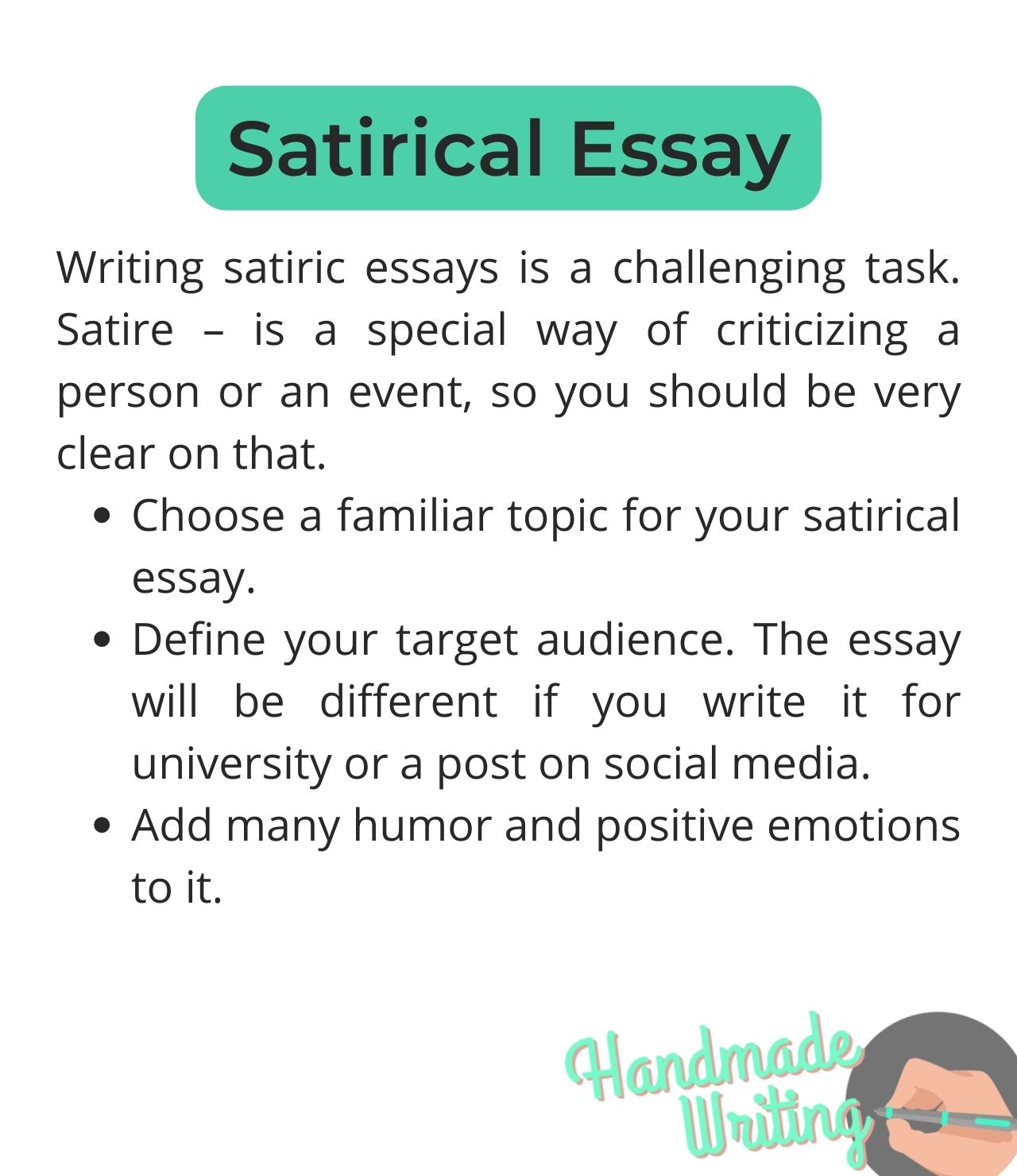
Wondering how to write a satire essay? Even though it may seem like a daunting task, writing a satire essay can be a seamless process once you apply the following tips:
Choose an original and relevant topic
So you need to write a satire essay. The first step to take is to choose your topic. In some cases, your teacher or professor may assign a topic to you, but more often than not, you’d need to come up with a topic of your own.
In this case, decide the area you want your essay to focus on. You could focus on a political or social situation, depending on what you want.
However, it is advisable to choose a topic that you’re familiar with. This way, it will be easier to dig up facts and evidence to support your point of view.
Consider your audience
Your audience is the focal point of your essay. As such, it’s very important that you consider them at every stage of the writing process. Is your essay aimed at high school students or college professors?
Would it be read by professionals or just your fellow students? Identifying and considering your audience will help to determine the appropriate tone for your essay.
If your target audience is mostly made up of fellow students and friends, you can get away with using a casual tone. However, if you expect professionals to read your work, it’s advisable to go for a more formal tone in your essay.
Add lots of humor
What makes a satire essay so interesting? Is it the topic or the author’s writing style? Well, the major spice of any satire essay is the generous use of humor. You want to make your audience laugh at the ridiculousness of a particular person or situation. As such, the best way to achieve this aim is by applying devices like irony, sarcasm and hyperbole.
When used tactfully, these devices can have the desired effect on readers.
Stick to plain facts
Inasmuch as satirical essays employ devices like humor and exaggeration, it’s important to stick to plain facts when writing your essay. Adding incorrect theories or outright lies to your essay would only render it invalid in the court of public opinion.
As such, it’s important to only state facts that can be backed up by strong evidence. For further credibility, cite your source after stating figures, theories or opinions.
This would assure your audience that your essay is credible. If you can’t find facts or evidence to support a particular argument, then it is advisable to avoid including it in your essay.
Use the ELP format
The ELP format is a great way to ensure that your satire essay is professional and of stellar quality. ELP is an acronym for ethos, logos and pathos.
These three elements form a significant part of your essay and can either make or mar your work. But how and when do you employ them in your essay?
Ethos informs the readers about the issue at hand and their pre-existing beliefs. As such, this tool should be used in the introductory part of the essay to lay a foundation for the readers.
Logos provides the audience with pure facts and figures, thereby adding credibility to your work.
Pathos, just like the term implies, would evoke the appropriate feelings and emotions in your audience. Whether you’re trying to evoke sadness, sympathy or anger, using this tool the right way would help you achieve your aim.
Be tolerant
Even though a satire essay is often riddled with sarcasm and irony, it’s important that you use these devices without making any offensive statement.
Your audience will definitely be made up of people from different walks of life. As such, you don’t want to make remarks that may be deemed to be discriminatory or offensive to a particular sect.
Knowing the boundary between satire and being outrightly offensive is a delicate art that requires practice and a keen understanding of human psychology. However, to ensure that your essay is in no way offensive, you could ask for second opinions from your colleagues or teacher.
How to Find Original Topics
With how difficult satire essays are, you’d think no one would be writing them. However, a quick Internet search would show you an abundance of already-written satire essay topics. In fact, choosing a topic that has not already been written by someone else can be a daunting task.
If you’re trying to find original satire essay ideas or topics, here are a few tips that may help you:
Find major political or cultural events
If you look around you, you’d definitely find a wide range of interesting political or cultural events that would make for a brilliant topic. Go through published articles, media publications and the news to find resources for your dream topic.
Brainstorm interesting ideas
Once you’ve gone through the resources listed above, you can then go on to brainstorm any ideas you may have come up with. Ensure that your topic is interesting and witty enough to catch the attention of your readers.
70 Satire Essay Topics
Struggling to find original satire essay topics that would interest your audience? Well, here are some sample topics on different subject matters that would definitely inspire you:
- The royal family and Princess Diana: a mystery that never got solved
- What would today’s world look like if the Holocaust had never happened?
- The best American presidents in history vs Donald Trump: a tale of two worlds
- How World War II should have turned out
- What was so special about Attila the Hun anyway?
- More than just his height: a review of Abraham Lincoln’s policies
- The real truth behind Thanksgiving: why was it created?
- Adolf Hitler and the Holocaust: a not so shocking tale of his prejudice
- The never-ending cold war between Catholics and Protestants: how it all started
- Why slave trade should have been abolished before it even started
- Trump: analyzing why political leaders should steer clear of social media
- Politicians and broken promises: a match made in heaven
- Is political correctness the perfect cure for all modern ailments?
- The gun-slinging citizen: an analysis of the legalization of guns and fire-arms in the United States
- Freedom of speech and what happens after you make your speech in today’s world
- How to deal with electoral loss: handy tips from the best losers
- Pro-life VS Pro-Choice: the never ending moral argument between conservatives and liberals
- How to satisfy the United States’ healthcare needs
- Why the death penalty should have died many centuries ago
Marriage and Family
- Being a cool parent in today’s world: everything you need to know
- Is married life really overrated? Asking for a single millennial
- The United States’ secret behind its high divorce and separation rates
- The perfect recipe for a peaceful divorce in today’s world
- Should same-sex marriage be legal in every part of the world?
- Saving for the kids’ college: the bane of every married couple
- Big weddings or small weddings? The ultimate introvert-extrovert war
- Trying to have a tight family discussion: a how-to guide
- Should women walk on hot coals barefoot to please their fiancé’s parents?
- Why the internet is the perfect place to seek relationship advice
- Why true love is as real as Santa Claus and Jack Frost
- All is fair in love and war: is it really?
- What happens when you fall in love with two different people?
- Why millenials should normalize leaving first dates immediately it becomes awkward
- How to start a conversation on a first date without being awkward
- Cohabitation: ten lies you’d find on the internet in today’s world
- Why dating sites should have existed in the 18th or 19th century
- Finding love in the 21st century: are dating sites the modern version of arranged marriages?
- How pickup lines determine the start of a strong modern relationship
- Should there be an age limit on love between adults?
- The slow yet sure eradication of chalkboards from modern classrooms
- Why dropping out of school is an under-rated decision for millenials
- Are good grades a social construct created to frustrate students?
- Why the social pyramid in high school exists and how to navigate it
- Dealing with bad grades: the ultimate guide to getting over a failed exam
- Should parents panic when their child drops out of school?
- Why detention is a failed attempt at disciplining high school students
- Online learning: has the pandemic done anything for school truants?
- Why bullying and bullies should be eradicated from high school systems
- Should you be a wallflower or social butterfly in high school?
- How television and social media slaughtered newspapers and buried them
- Does the media truly influence people’s lives and decisions in today’s world?
- The Media and political leaders: who is a better liar?
- Fake news: how to squash its occurrence in today’s media
- Television vs social media: which one played a bigger role in COVID-19 sensitization?
- Is Facebook a peeping Tom? How social media ruined everyone’s privacy
- Is the free press really free or is it being controlled by puppet strings?
- Censorship vs free speech: what do millennials really need?
- Scandals and brand wars: is there anything like bad publicity?
- Why free publicity never works for brands and modern celebrities
- How to become a millionaire without robbing a bank or grocery store
- Money can’t buy you happiness: the biggest lie ever told to mankind
- Why being broke can be the ultimate death sentence for anyone
- How to save money without literally starving to death in today’s world
- Why working hard does not necessarily translate to more money for you
- Should billionaires exist? Analyzing Jeff Bezos’ wealth and the plight of Amazon’s workers
- Why financial books are a complete waste of money and valuable time
- The gender pay gap: how to close it in the 21st century
- Why does money have a therapeutic effect on most people?
- Analyzing Robinhood’s lifestyle: is it okay to steal from the rich and give to the poor?
Satire Essay Examples
Still not sure how to write the perfect satire essay? Well, in this case, you can always refer to a well written satire essay example. Here are some satire essay examples that would definitely set you on the right track:
https://thecampanile.org/2019/10/23/satire-why-climate-change-is-fake/
https://manysmallvoices.wordpress.com/tag/satire/
Write a Satire Essay with HandMadeWriting
With these few tips and examples listed above, you can now go on to draft your very own satire essay. However, if you’d rather not go through the hassles of writing it yourself, you can hire HandMadeWriting essay writer services.
With us, you are guaranteed a stellar, well-written satire essay that would definitely impress your teacher and audience.

A life lesson in Romeo and Juliet taught by death
Due to human nature, we draw conclusions only when life gives us a lesson since the experience of others is not so effective and powerful. Therefore, when analyzing and sorting out common problems we face, we may trace a parallel with well-known book characters or real historical figures. Moreover, we often compare our situations with […]

Ethical Research Paper Topics
Writing a research paper on ethics is not an easy task, especially if you do not possess excellent writing skills and do not like to contemplate controversial questions. But an ethics course is obligatory in all higher education institutions, and students have to look for a way out and be creative. When you find an […]

Art Research Paper Topics
Students obtaining degrees in fine art and art & design programs most commonly need to write a paper on art topics. However, this subject is becoming more popular in educational institutions for expanding students’ horizons. Thus, both groups of receivers of education: those who are into arts and those who only get acquainted with art […]

If there’s any genre of literature designed to make fun of humankind, it’s satire. In both prose and poetry, writers have employed satirical techniques as far back as Ancient Egypt, utilizing the conventions and elements of satire to write about our follies.
Satire writing has become more popular in recent years. This is partially due to the internet: greater access to information has given writers more follies to satirize. It also helps that satirical publications, like The Onion and Reductress , have amplified satires about the modern day.
While headlines like “ Overly Cautious Pregnant Woman Only Going To Ride Roller Coaster 6 Or 7 Times ” seem silly and unsophisticated, there’s actually a fine art to satire that many readers and writers overlook. This article covers the basics of how to write satire: the different types of satire, the various elements of satire, and different satirical techniques essential to the form. Along the way, we’ll analyze those elements and techniques through some satire examples.
But first, what is satire? It’s important to understand both what it is and what it isn’t . Let’s define satire accordingly.
Satire Definition: What is Satire?
Satire is the art of mocking human follies or vices, with the intent of correcting or criticizing those shortcomings of human nature. It is, quite simply, a tasteful means of ridiculing human behaviors, institutions, and politics.
Satire definition: the art of mocking human follies or vices, with the intent of correcting or criticizing those shortcomings of human nature.
Now, satire isn’t just senseless ribbing. Writing about something with sarcasm, irony, or condescension doesn’t make something satirical. Nor does it count if you simply make fun of something: an essay that laughs at arson victims, for example, would just be cruelty.
Rather, satire must criticize a specific action, belief, or institution. It must poke holes in the logic of those actions, beliefs, or institutions, without ever explicitly stating the humor. Finally, it must showcase this flawed logic with the intent of creating awareness and inciting change.
Let’s use an Onion article as an example. Read this brief story: “Mark Zuckerberg Asks Hawaiian Neighbor To Cut Down Unsightly, Overgrown Rainforest”
The title alone makes for a great bit of satire, but let’s break down what the article is doing.
- Realistic fiction: For starters, this never happened—but it sounds like something that would.
- Ironic use of “lack of respect”: Zuckerberg finds the forest’s presence to be disrespectful, though his request to disrupt the natural land is far more disrespectful.
- Hyperbolic language: Phrases like “unkempt biome” and “obnoxious waterfall” are hyperbolic and unusual, signifying the comedy of the article.
- Scornful Tone: The writer of the article clearly expresses a scornful, satirical tone.
- Subtlety: The article never says “Mark Zuckerberg is a bad person.” But it does quote him as calling native Hawaiians “disgusting nuisances,” using a word play device called “paraprosdokian.”
- Logical extremes: The idea behind this article is that a billionaire is making unreasonable, hurtful demands to satisfy his own comforts. This article takes that idea to a logical extreme.
- Juxtaposition of incongruous features: There’s no HOA for Hawaiian rainforests. The inclusion of this detail satirizes the bureaucracy that wealthy people use to their advantage: if there was a rainforest HOA, it would certainly come to Zuckerberg’s benefit.
We’ll examine these elements of satire more closely in a moment. For now, take note that all of these elements—irony, juxtaposition, hyperbole, etc.—are working together in this short but highly effective article.
Elements of Satire
Whether you’re writing Juvenalian satire or Horatian satire (terms we’ll define in a bit), the following elements are useful to writing satirical works. You’ll notice some of these elements working in both the above article and the satire examples we include later on.
- Realism: A work of satire must sound like it could actually happen in the real world. Now, this isn’t always easy, especially if your essay is about a politician condoning the consumption of newborns. What’s important is that satire does not draw attention to its own farce . The story must ostensibly treat its subject matter seriously, even when it uses literary devices in jest.
- Irony : Irony is when the opposite of what’s expected actually occurs. It is a contrast between “what seems to be” and “what is,” surprising and provoking the reader. Irony is pivotal to satire, as it allows the story to seem realistic while being hyperbolic, while also amusing the reader or challenging a certain assumption the reader has made.
- Hyperbole: Hyperbole is language that is incommensurate with the thing being described. For example, let’s say you walk outside on a hot July day, and you say “it’s a million degrees outside!” Hyperbolic language often makes for great satire writing. Note that “understatement” is an effective form of hyperbole as well.
- Tone: Tone refers to the author’s attitude towards a certain topic. Because the intent of satire is to criticize or make fun of something, the tone of a satire piece might be ironic, sarcastic, mocking, critical, or simply satirical.
- Subtlety: Satire writers need to strike a fine balance between realism and absurdism. The story should seem possible in the real world, but it should also lean into comedy and farce without explicitly stating the thing that’s being satirized .
- Logical Extremes: A logical extreme is when an idea or argument is amplified to a hyperbolic, but still possible, conclusion. Let’s take the argument “Cats are evil.” A logical extreme of this would be “ Kitten Thinks Of Nothing But Murder All Day .”
- Juxtaposition of Incongruous Features: Juxtaposition refers to the close placement of two related objects in text. In satire, writers will juxtapose incongruous features—items which don’t belong next to each other, but are written about as though they do. An example of this would be “ Geologists Find Historical Record of Last 3 Million Years in Woman’s Makeup Brushes .”
It is important to recognize that satire is all about imitation . The story seems like something that could or has happened in the real world, with only slight adjustments to make the story farcical or hyperbolic. These changes—these juxtapositions, hyperboles, and logical extremes—amount to a subtle, yet evocative, critique of the satire’s subject.
Works of imitation are often satire. Parody, for example, is a satirical imitation of another work of art, literature, or media. Similar to parody is the burlesque, which treats a serious work of art as something caricatured and risible. Slapstick, finally, can be satirical, especially when the characters of a slapstick comedy are public figures that the author views as unintelligent.
Pay attention to these elements at play in the satire examples we share throughout this article.
Satire vs. Parody
Because works of parody are intended to mock, riff, or imitate other works of art, parody is often confused with satire. Although parody can produce satire, there are a few key differences between the two.
Parody is always the comical imitation of a certain style or genre. One example of this is Don Quixote, a novel which parodies the romance novels of 17th century Spain. Another example is Candide . Candide is ostensibly a work of satire, but it uses parodies of the romance and adventure novel—for example, the picaresque and the bildungsroman—to construct this satire.
In media, parody is a huge aspect of Saturday Night Live skits. 1-800-Flowers , for example, is a parody of flower commercials on television.
Satire is much more complex than parody.
Satire is much more complex than parody: for one, it is much subtler than the parody, and for another, it specifically criticizes an idea, argument, or person. Parodies can make fun of certain styles or conventions without attacking a particular person or idea—though a parody can also be critical.
In short, parody is a work of imitative art that can stand on its own, or it can contribute to the development of a work of satire, but it is not the same as satire itself.
Satire vs. Sarcasm
A similar dilemma emerges with satire vs. sarcasm: they seem the same, but one is actually an element of the other.
Sarcasm is the use of ironic language to poke fun at another person’s faults. It is verbal irony with the intent of making fun. Let’s say you drop your phone and the screen cracks. Your sarcastic friend (or enemy!) might say “That was so graceful,” implying that what you did was the opposite of graceful.
Sarcasm, thus, is one of the elements of satire. A work of satire might have a sarcastic tone, employ sarcastic description, or rely heavily on inverted language.
People often employ the adjectives “satirical” and “sarcastic” as if they’re synonyms. They are, but they mean slightly different things. “Sarcastic” means “using wit and irony to hurt someone,” whereas “satirical” means “using wit and irony to expose or criticize human folly.”
Satire in Poems
Although most satire examples you’ll find are works of prose, you can also find satire in poems. Satirical poetry relies on the same techniques as works of prose do, but because the poem is constrained by poetry form , the poet must be much more discerning about which elements of satire to include in the poem.
Classical poets such as Dryden, Swift, and Shelley employed satire in poems, but let’s look at an example from the modern day: Read “Thank You For Waiting” by Simon Armitage .
The satire is readily apparent in this poem. The format riffs off of the language that airlines use to board their passengers. By taking this language to its logical extreme, the poem effectively satirizes the artificial class divisions perpetuated by airlines, corporations, and other wealthy, capitalist institutions.
What are the two types of satire?
What are the two types of satire? Literary theorists organize works of satire into two categories: Horatian and Juvenalian. These categories come from the names Horace and Juvenal, two poets of Ancient Rome.
Horatian satire is a typically lighthearted work that pokes fun at mankind’s follies. It is not caustic or overly critical. Rather, it laughs at the failings of mankind with a certain amount of sympathy, telling the truth about our imperfections with a smile.
By contrast, Juvenalian satire is much angrier, and is written with the intent of criticizing and condemning a certain person or institution that the satirist views as evil. These pieces of satire usually confront social and political issues.
There exists a third and less frequently discussed form of satire called the Menippean satire. This type satirizes certain ways of thinking, rather than particular individuals or groups. It tends to be a novel-length work that focuses on societal norms, often including philosophical discussions. Named after an Ancient Greek satirist, a contemporary Menippean satire might poke fun at, for example, altered states of consciousness ( Alice in Wonderland ).
The Menippean satire has its own history and genre conventions which are beyond the scope of this article. To learn more about those conventions, start here .
In the meantime, let’s look at some Horatian satire examples and Juvenalian satire examples.
Horatian Satire Examples
The Horatian satire is the most lighthearted form of satire. As such, these works of literature and journalism are intended to make you laugh—but that doesn’t mean a Horatian satire cannot also be thought-provoking.
Here are a few examples from literature:
1. Gulliver’s Travels by Jonathan Swift
Gulliver’s Travels is a novel that satirizes the “travelers’ tale,” a subgenre of literature that was especially popular during the ages of exploration. In the novel, Lemuel Gulliver’s travels take him to a land of tiny people (Lilliput), a land of giants (Brobdingnag), a floating island of the arts (Laputa), and a land of talking horses (the Houyhnhnms).
Throughout these travels, Gulliver often compares the societies and governments of the people he meets with that of 18th century Europe. Each land has its own problems, taken to logical extremes. The Houyhnhnms, for example, are honest and upright people who don’t have a word for lying. (Their name is an onomatopoeia for the sounds horses make.) Yet, they’re happy to suppress Gulliver’s status as an outsider to the local humans (the Yahoos), indicating that they believe silence is better than lying.
Additionally, the character Gulliver is rather easily misled and rarely employs critical thinking. As a result, his outlook on humanity becomes more and more depressing as the story progresses, because he becomes aware of the flaws in each of these societies and comes to believe that all men are the same, rather than recognizing the nuances in human civilization and psychology.
As a result, each element of the story is carefully crafted satire. It’s Horatian satire because many of the situations are intended to make readers laugh, such as the Brobdingnag giants crafting a tiny house that they can carry Gulliver around in. Nonetheless, the novel prompts readers to examine the ways they react to different cultures and lived experiences, as well as coming to terms with the fact that there is no ideal government.
2. The Canterbury Tales by Chaucer
The Canterbury Tales is noteworthy for a number of reasons, namely that it popularized the use of English vernacular in literature (when, previously, English was seen as a commoner’s language, and literature was written in Latin or French). Partially written in prose and partially written in verse, The Canterbury Tales provides an interesting window into culture and society during the turn of the 15th century.
It is also, when closely examined, a work of satire on the peoples of England.
The Canterbury Tales revolves around a group of pilgrims regaling each other with stories of their lived experiences. Those experiences range widely: characters include a friar, a knight, two nuns, a shipman, a physician, a cook, a pardoner, and many more. Each person’s tale is inevitably informed by their class and social standing. As a result, their stories end up being satires on the lived experiences they represent and, more broadly, satirize elements of medieval society as a whole.
For example, the Nun’s Tale satirizes “courtly love,” a literary genre (and true-to-life representation) of what relationships looked like among the ruling elite. The Nun’s Tale takes place in a barnyard, not in the high courts, which makes a mockery of the acts of chivalry described by the Nun.
The 15th century was a time of great social upheaval for Europe, particularly England, where the emergence of a merchant class and a (non-religious) intellectual class spawned new ideas about the structure of society. The Canterbury Tales capitalizes on these changes by satirizing the societies and psychologies of people in each class.
3. A Connecticut Yankee in King Arthur’s Court by Mark Twain
A Connecticut Yankee in King Arthur’s Court is most frequently heralded as one of the first time travel novels. Apart from this, it is also a hilarious Horatian satire on the values of medieval Feudalism.
In the novel, Hank Morgan, an engineer from Connecticut, inadvertently travels to 6th century England after being struck in the head. Hank convinces the people of his “magical powers” by telling them about the future. Doing this, he gains power in King Arthur’s course and tries to bring modernity to the 500s. This results in a satire of the values and institutions in both medieval society and 19th century America.
For example, Merlin creates a veil of invisibility, which Sir Sagramor wears in a duel against Hank. Hank pretends that he can’t actually see Sir Sagramor, satirizing the superstitions about magic, as well as the institution of chivalry, prominent in medieval England.
Through the juxtaposition of incongruous societies, Mark Twain pokes fun at human society 1300 years before Twain’s time, while also demonstrating parallels between people then and now.
For contemporary satirical journalism, The Onion and Reductress are both generally examples of Horatian satire, though both are occasionally Juvenalian.
Juvenalian Satire Examples
While Juvenalian satire can certainly make readers laugh, the intent is to ridicule the actions and philosophies of certain societies and institutions. As such, the following Juvenalian satire examples often bear resemblance to the politics of their times, taking political philosophies to their logical extremes.
1. “A Modest Proposal” by Jonathan Swift
“A Modest Proposal” is quintessential Juvenalian satire. Written in 1729, the essay satirizes British policy concerning Ireland, as Britain’s occupation of the Irish state routinely caused famine and strife. The essay was originally published under the title “A Modest Proposal For Preventing the Children of Poor People From Being a Burthen to Their Parents or Country, and For Making Them Beneficial to the Publick.”
The essay’s satire is effective precisely because of its shock value. Swift first describes the plight of Ireland, particularly the suffering of its many beggars and hungry citizens. Then, without warning, Swift’s essay pivots to the nutritional value of eating 1 year old babies (a juxtaposition of incongruous features, and an argument taken to its logical extreme).
Much of the essay is then devoted to the logic behind eating infants: the many ways they can be cooked, the financial benefits, and how it will resolve other issues like murder and taxation. The essay amounts to an argument that is almost convincing. If the reader doesn’t think about the morality of eating children, the satire is almost actually effective in proposing that the consumption of infants is pragmatic policymaking.
Nonetheless, the reader comes to sympathize with the Irish and hate the narrator of the essay, effectively undermining the policymaking decisions of 18th century Britain. Because this essay is criticizing British policymakers and their treatment of the Irish people, there is no doubt that the caustic tone of this piece makes it Juvenalian satire.
You can read “A Modest Proposal” for yourself at Project Gutenberg .
2. Animal Farm by George Orwell
Animal Farm is a Juvenalian satire that retells the establishment of the Soviet Union with farm animals in place of political leaders. As such, it adapts the form of the fable into a satirical novella about Trotsky, Lenin, Stalin, and the dramas that unfolded with the overthrow of the Russian monarchy.
Animal Farm begins on an old, dilapidated farm, run by the careless taker Mr. Jones, who represents the monarchy. The pigs band together around the wisdom of Old Major, an elderly pig who represents Lenin, as well as Karl Marx and his teachings. Inspired by the prospect of freedom from Mr. Jones, the animals revolt and claim the farm for themselves.
Much like the beginnings of the Soviet Union, the newly run Animal Farm begins in prosperity. The animals work to modernize the farm and make it self-sustaining, able to nurture all of the animals equally.
Before long, however, some of the farm’s leaders begin to grapple for power. Snowball, who represents Trotsky, tries to maintain the ideals of equality and progress espoused by Old Major (a philosophy called Animalism in the book). Napoleon, who represents Stalin, wants to seize power for himself. To do this, he uses a pig called Squealer, who represents Molotov, the Soviet Union’s head of propaganda. Squealer convinces the farm animals that Snowball is conspiring against the farm, even though it’s really Napoleon who’s conspiring.
The novella then follows how Napoleon abuses the language of progress to satisfy his own needs, hoarding wealth from the farm animals he claims to represent.
What makes this a work of Juvenalian satire? For one, it’s no subtle insult that the leaders of the Soviet Union are represented by pigs. But the work’s satire comes from its farcical resemblance to Europe’s political situation in the first half of the 20th century. Orwell takes Soviet propaganda to its logical extreme, showing how easy it is to manipulate an entire farm (or country!) through the manipulation of words and ideas.
3. Brave New World by Aldous Huxley
Another work of mid-century satire, Brave New World satirizes the ideal utopian society, presenting a world in which everyone is happy and nothing has meaning. In the novel, people are artificially manufactured and born into a certain social class, based on the intelligence and strength they are bestowed upon their manufacturing.
The novel primarily follows Bernard Marx, a high class citizen who starts to question the social structures of the utopia. The society functions in large part due to Soma, a drug that manufactures happiness and is frequently taken by all citizens of the world. Soma allows people to be satisfied with their place in society, so nobody questions the flaws in this apparent utopia—except for Bernard, who doesn’t consume the drug, as well as Bernard’s friend Helmholtz, a writer who struggles to write when he can’t experience his own suffering.
The novel follows Bernard’s reckoning with society, including his witnessing the lives of Native Americans who don’t live in the modern world, and what happens when those Native Americans, who don’t live a manufactured life, find themselves in the manufactured realities of the “utopia.”
What makes this a piece of satire is the extension of social ideals to their logical extremes. For example, the people in Brave New World are sexually liberated, in part because the society has controlled for the possibilities of pregnancy and STIs. When John, a Native, falls in love with Lenina Crowne, he ends up committing suicide because he can’t support her sexual freedom, suggesting there’s a certain loss of humanity that comes from this liberation.
Another example is a satire of contemporary media. Before John commits suicide, he exiles himself to a lighthouse, where he self-flagellates in the hopes of purifying himself of modern civilization. What he doesn’t know is that he is secretly being filmed. When that film is released, all of society zeroes in on John and his strange behavior. This spectacle resembles, in large part, our contemporary lust for information, to the point that we invade each others’ privacy. Huxley wrote this novel far before the advent of social media, but now that we’re constantly filming each other for fame and spectacle, how far off was he?
How to Write Satire
How did the great satirists of history pull off such effective works of literature? In addition to having savage wits and keen eyes for politics, satire writers followed a few strict rules. Here’s how to write a satire in 5 steps.
1. How to Write Satire: Familiarize yourself with satirical techniques
Satire is a difficult genre to pick up, which makes it essential to read like a writer . Read the satire examples we included in this article, and analyze how the following satirical techniques are employed:
- Logical Extremes
- Juxtaposition of Incongruous Features
These elements of satire, when employed strategically, combine to make effective, poignant, and gut-busting stories.
2. How to Write Satire: Begin with a topic or issue you’d like to satirize
Satire can criticize both local issues and global ones. The Canterbury Tales satirizes the stories and personalities prominent in medieval England; conversely, Brave New World criticizes the Western view of utopia and the direction of global society.
Regardless of what issue you choose, do your research. It’s important to understand the arguments for and against a certain issue, and the logic and reasoning behind those arguments. That way, you can take those arguments to their logical extremes, undermining the rhetorical strategies used in favor of the issue you’re against.
For example, let’s say you wanted to write a piece of satire on removing the penny from U.S. circulation. An argument in favor of this is that it could curb inflation. You could then take this argument to its logical extreme. Imagine a country in which we made every coin out of pure gold, and everyone starts fighting with each other for change? Or, imagine a country in which the lowest monetary denomination is the $10 bill, and, again, everyone starts fighting with each other for change?
3. How to Write Satire: Build a narrative
Once you have a topic and a stance on that topic, build a story around the argument you’re trying to undermine.
This is where the art of storytelling , and elements like character, plot, and setting, can prove extremely useful. For example, read this brief Horatian satire from The Onion: ‘ This City. These People. All Sheep, And I Am Their Shepherd,’ Says Eric Adams, Looking Out Over New York .”
NEW YORK—Clasping his hands behind his back and looking out over Manhattan’s iconic skyline, New York mayor Eric Adams was reported to have said, “This city. These people. All sheep, and I am their shepherd,” as he launched into a monologue Wednesday. “I and I alone am the line between order and chaos, guiding toward the light these confused, woeful masses who wander in darkness,” said Adams, who reportedly cast his gaze on the citizens below and contemplated how fortunate they were to have a place in the palm of his merciful hand. “Without me, without my power and my will, each of these 8 million souls would be condemned to a wretched life and death amidst a twisted, seething cesspool of humanity. As they cling to a crumbling precipice, they reach out, in their desperation, to the one man whose whims control their destiny: to me, to their protector, to New York’s greatest benefactor, to Eric Adams!” At press time, sources reported Adam had retired for the night to his apartment in New Jersey.
If you know anything about New Yorkers, you know we always hate the mayor. Let’s deconstruct what this piece is doing:
The issue: At the time of this article’s publication, Adams has been NYC mayor for just over 4 months. In that time, he’s had a formidable media presence, but he often sounds a bit self-aggrandizing when he talks about the city and the role he’s going to play in running it. In a recent video message, he’s quoted saying “I will not stop until the peace we deserve becomes the reality we experience.” The issue is that the mayor might be all words, no action—especially when those words are already overwrought.
The satire : This article amps up the melodrama, taking Adams’ speech to a logical extreme. The parody of his melodrama builds Adams up to be a god-like figure, as he is the difference between “order and chaos,” between “life and death.” He is even “the one man whose whims control [New York City’s] destiny.”
The storytelling: This article makes a sort of caricature of Adams. A caricature is a type of characterization in which the character is one dimensional and distorted for the audience’s pleasure. The story, here, is that Adams went off on a monologue before retiring to his non-NYC apartment, making the story’s structure a satire for his administration: all talk, no action.
4. How to Write Satire: Surprise the reader
All works of satire have an element of surprise. The reader shouldn’t be able to expect where the story goes, otherwise it’s not doing a good job of delighting and provoking the reader. As such, your satire should have a twist, even if that twist doesn’t occur until the final sentence.
Pay attention to the twists in the above satire examples. In “A Modest Proposal,” the twist is the proposal itself: that the solution to Ireland’s poverty is to cook and consume 1 year olds. In The Onion article about Eric Adams, the twist is that he goes home to New Jersey.
The twist should both surprise the reader and advance a certain satirical argument. Whatever you do, be clear about what you’re mocking and criticizing, because this will inform what your twist is and help you stick the landing.
5. How to Write Satire: Edit for clarity and laughs
Can you make your story more ironic, hyperbolic, or realistic? Are you juxtaposing unalike items in clever ways? Is it clear who or what your satire is criticizing? Ask yourself these questions as you edit your piece: the goal is to distort reality just enough that the reader knows this is satire, but to still be hyperbolic and ironic, even if the work is more Juvenalian than Horatian.
Learn How to Write Satire at Writers.com
Ready to laugh at the world? The instructors at Writers.com are eager to help you polish your works of satire. Take a look at our upcoming writing courses , and write satirical stories and books alongside our award-winning instructors .
Sean Glatch
Excellent presentation, Sean. It gave me some structural ideas for a collection of poems and epistles in the vein of Horace and Juvenal. I’ve previously published a parody of Voltaire’s Candide. My story is called: The Alchemy of Happiness. ( which is the title of a book by a Muslim scholar from the 10th century.
This article was very informative. Never before did I realize how this kind of literary work employed so many advanced literature concepts. I have never had to call to action this many skills for one satirical essay. I am definitely using different parts of my brain.
Leave a Comment Cancel Reply
Save my name, email, and website in this browser for the next time I comment.

- Articles , Fun with AI , Writing
How to Write Great Satire (With Examples)

What is Satire?
Satire is a genre of literature and performing arts, characterized by its use of humor, irony, exaggeration, or ridicule to expose and criticize people’s stupidity or vices, particularly in the context of contemporary politics and other topical issues. It’s a tool for offering commentary on and criticism of its subject. Satire is more than just making jokes or mocking societal elements. It’s a sophisticated form of critique that’s carefully dressed in humor, insight, and relevance.
Satire is Critical
Satire fundamentally aims to expose and critique the flaws, faults, and shortcomings of its subjects, which could range from individuals and organizations to broader societal norms. This critique often comes with an undercurrent of moral or social improvement. Satire is not just about pointing out what’s wrong; it’s about holding up a mirror to the subject, often in a way that motivates reflection and, ideally, change. It’s a form of social commentary that seeks to bring to light the underlying issues that might otherwise go unnoticed or unaddressed.
Satire is Humorous
While satire might not always provoke outright laughter, it uses humor to make its critique more palatable and engaging. Irony and exaggeration are the hallmarks of satirical humor. They serve to soften the blow of the critique, making the message more accessible and less confrontational. This subtle infusion of humor is what often allows satire to deliver its message effectively, making complex or sensitive issues more approachable.
Satire is Usually Insightful
It’s not just about highlighting problems but also about offering a deeper understanding of the issues at hand. Satire encourages the audience to think critically and look beyond the surface. It often provides a new perspective or sheds light on aspects of an issue that may not have been apparent before. This insightful nature of satire is what gives it depth, transforming it from mere comedy into a thought-provoking critique.
Satire is Often Timely
Satire is often at its most powerful when it is topical and relevant, focusing on current events, social trends, political happenings, and prominent figures. By engaging with contemporary issues, satire stays connected with its audience, offering commentary that is immediately recognizable and relatable. This relevance is crucial as it allows satire to comment on the pulse of society, reflecting and critiquing the world as it is at that moment. Topical satire can influence public opinion and contribute to the discourse on current issues, making it a dynamic and impactful form of expression.
What Satire Isn’t
Satire is often misunderstood, sometimes conflated with mere comedy or other forms of humorous expression. Understanding what satire isn’t is crucial for appreciating its unique character and purpose. Let’s demystify this by exploring common misconceptions about satire.
Satire Isn’t Merely Funny
While humor is a fundamental component of satire, it’s a mistake to equate satire with mere comedy. Comedy aims primarily to entertain and amuse, whereas satire uses humor as a means to an end – that end being critique and social commentary. Satire embeds its humor within a context of criticism; it’s not just about making people laugh, but making them think.
Satire is Not Always Negative or Desctructive
A common misconception is that satire exists solely to criticize or tear down its subjects. While critique is a key element of satire, it’s not just about highlighting the negative. Satire often has constructive goals – it aims to expose flaws and follies to prompt introspection, discussion, and even change. It’s not destruction for the sake of destruction, but rather, a tool for shedding light on issues with the hope of improvement.
Satire Isn’t Always Obvious
Satire is not always immediately obvious or overt. It can be subtle, requiring the audience to engage and recognize the layers of meaning beneath the surface. This subtlety is part of its effectiveness; it invites deeper reflection and analysis, allowing for a more nuanced understanding of the issues at hand. This complexity means that satire can sometimes go unrecognized or be misinterpreted by those not attuned to its subtleties.
Satire Isn’t the Same as Parody
While both satire and parody use humor, they serve different purposes. Parody primarily focuses on imitation and exaggeration of a particular work, style, or genre for comic effect. It doesn’t inherently carry a critical message about broader societal issues, which is a hallmark of satire. Satire, on the other hand, while it may use parody as a technique, always has a deeper, often critical, intent.
Satire is Much More Than Sarcasm
Sarcasm is often blunt and straightforward in its ridicule or irony, and can sometimes be mean-spirited. While sarcasm might be a component of satire, satire is much broader in scope. It encompasses a wider range of humor and irony, and unlike sarcasm, it is often less about personal ridicule and more about critiquing societal structures, behaviors, and norms.
How to Write Great Satire
Choose your target.
Whether you’re poking fun at political ideologies, societal norms, cultural trends, or specific events or individuals, choosing your target is the first step in writing great satire. The key is clarity; your audience should easily be able discern what you’re satirizing. For instance, Jonathan Swift’s “A Modest Proposal” didn’t just criticize poverty in Ireland; it satirized the heartless attitudes of the wealthy towards the poor.
While ideologies, norms, and trends are common fodder for satire, the choice is vast and varied. The key is to find a subject that resonates with you and your intended audience. For example, in “Catch-22,” Joseph Heller chose to satirize the bureaucratic absurdities and paradoxes of war, targeting not just the concept of war itself but the illogical nature of bureaucracies in a high-stakes environment.
When selecting your target, it’s also crucial to consider its relevance and timeliness. Satire that connects with current events or enduring societal issues tends to have a stronger impact. The TV show “South Park,” for instance, has built its reputation on rapidly responding to current events, making its satire feel immediate and pertinent.
Another aspect to consider is the universality of your target. While it’s tempting to choose a niche subject, broader topics often have a wider appeal. This doesn’t mean you should shy away from specific targets, but rather, find ways to make them relatable to a larger audience. “Veep,” for example, while set in the specific world of American politics, uses universal themes of power, ambition, and human folly, making it accessible and amusing to a wide range of viewers.
Finally, approach your chosen target with a blend of critical insight and empathy. Satire is not just about mockery; it’s an opportunity to offer a deeper critique of a subject, potentially inciting thought and discussion. The British show “The Office” satirizes the mundanity and absurdities of everyday office life, but it does so with a sense of understanding and empathy for its characters, enriching the satire.
Find the Absurdity
The essence of satire lies in exaggeration. Identify the inherent absurdities within your subject and amplify them. Imagine satirizing a political policy about increased surveillance. You could depict a future where drones follow citizens to ensure they floss daily. The exaggeration here emphasizes the overreach of surveillance in a humorous, yet thought-provoking way.
In satire, exaggeration isn’t just a stylistic choice; it’s a tool to uncover and magnify the absurdities inherent in your subject. The goal is to transform what might be a subtle or overlooked flaw into something glaringly obvious and, ideally, laughable. This process of magnification not only entertains but also encourages your audience to reconsider the subject with a more critical eye.
To effectively find and amplify absurdity, start by observing the nuances of your target. Look for contradictions, hypocrisies, or simply the oddities that often go unnoticed. For instance, if you were satirizing the complexities of modern relationships, you might depict a scenario where a couple communicates solely through social media updates, despite living together. This exaggeration highlights the absurdity of over-reliance on digital communication in personal relationships.
Another approach is to push a logical premise to illogical extremes. Take the example of satirizing consumer culture. You could create a world where people take extreme measures, like trading essential life experiences or memories, just to purchase the latest trendy product. This not only lampoons consumerism but also subtly comments on what we value as a society.
Satire often thrives in the realm of the ‘slippery slope.’ Take a policy, trend, or behavior and ask, “What if this were taken to its extreme?” This method was famously employed in Aldous Huxley’s “Brave New World,” where the pursuit of happiness through technology and control is pushed to dystopian extremes, reflecting on the potential consequences of our own societal choices.
It’s important to balance your exaggeration so that the absurdity is evident but not so outlandish that it becomes unbelievable. The best satirical exaggerations are those that make the audience pause and think, “This is ridiculous, but it could happen,” or “This is an exaggeration, but it reflects a real issue.”
Use Irony and Contrast
Satire thrives on the disparity between reality and expectation. Irony is your ally. Illustrate the gap between how things are and how they ought to be, or between public perception and reality. Consider how George Orwell’s “Animal Farm” uses animals to depict the irony of a revolution that ends up mirroring the oppression it sought to overthrow.
Irony can be a subtle and effective way to highlight the ridiculousness of a situation. For example, satirizing the inefficiency of a bureaucratic system by portraying a department dedicated to reducing paperwork that, in fact, generates more paperwork. This ironic twist not only induces laughter but also underscores the problem in a memorable way.
One powerful form of irony is situational irony, where the outcome of a situation is the opposite of what you would expect. An example of this can be found in Jonathan Swift’s “A Modest Proposal.” Swift ironically suggests that the poor in Ireland sell their children as food to the rich. This shocking proposal starkly contrasts with the expected discourse on poverty, thereby highlighting the severity of the issue and the indifference of the elite.
Another way to utilize irony is through verbal irony, where what is said is the opposite of what is meant. This is often seen in satirical dialogues, where characters may speak in praise of something that the author intends to criticize. For example, in the television series “Veep,” characters often make grandiose statements about political integrity that are blatantly at odds with their actions, thus satirizing the duplicity often found in politics.
Contrast is equally important in satire. It can be used to juxtapose the ideal with the real, the powerful with the powerless, or the past with the present. This contrast can be seen in “The Great Gatsby” by F. Scott Fitzgerald, which uses the lavish lifestyle of the 1920s to contrast with the emptiness and moral decay of the characters’ lives, thereby critiquing the American Dream.
Another effective use of contrast is highlighting the difference between a character’s inner thoughts and outward actions. In “Dr. Strangelove,” the outward decorum and politeness of the military and political leaders starkly contrasts with the absurdity and horror of the nuclear war they are navigating, satirizing the cold war mentality and the absurdities of nuclear strategies.

The use of irony and contrast in satire is not just about creating humor; it’s about crafting a narrative that forces the audience to question and think critically about the subject at hand. By highlighting the discrepancies between reality and expectation, between what is said and what is meant, and by juxtaposing opposing ideas or values, satire can effectively critique and comment on the various facets of human society.
Balance Humor and Critique
Balancing humor and critique is the delicate tightrope walk at the heart of satire. The most impactful satirical works aren’t just amusing; they serve as a mirror, reflecting societal issues through the lens of humor. This balance is key in transforming satire from mere comedy to a potent form of social commentary.
Mark Twain, a maestro of this balance, wielded humor not as an end in itself but as a means to unveil deeper truths. In “The Adventures of Huckleberry Finn,” Twain uses the innocent perspective of a child to subtly critique the entrenched racism and moral hypocrisy of antebellum America. The humorous escapades of Huck and Jim on the Mississippi River are juxtaposed with the stark realities of slavery and societal prejudices, creating a narrative that is as thought-provoking as it is entertaining.
Another classic example is found in the works of British author Jonathan Swift. His essay “A Modest Proposal” is a masterclass in this balance. Swift uses dark humor, proposing that the poor sell their children as food to the rich, to deliver a scathing critique of the British exploitation of Ireland. The absurdity of the proposal, delivered with a straight face, heightens the underlying critique of societal indifference to the plight of the impoverished.
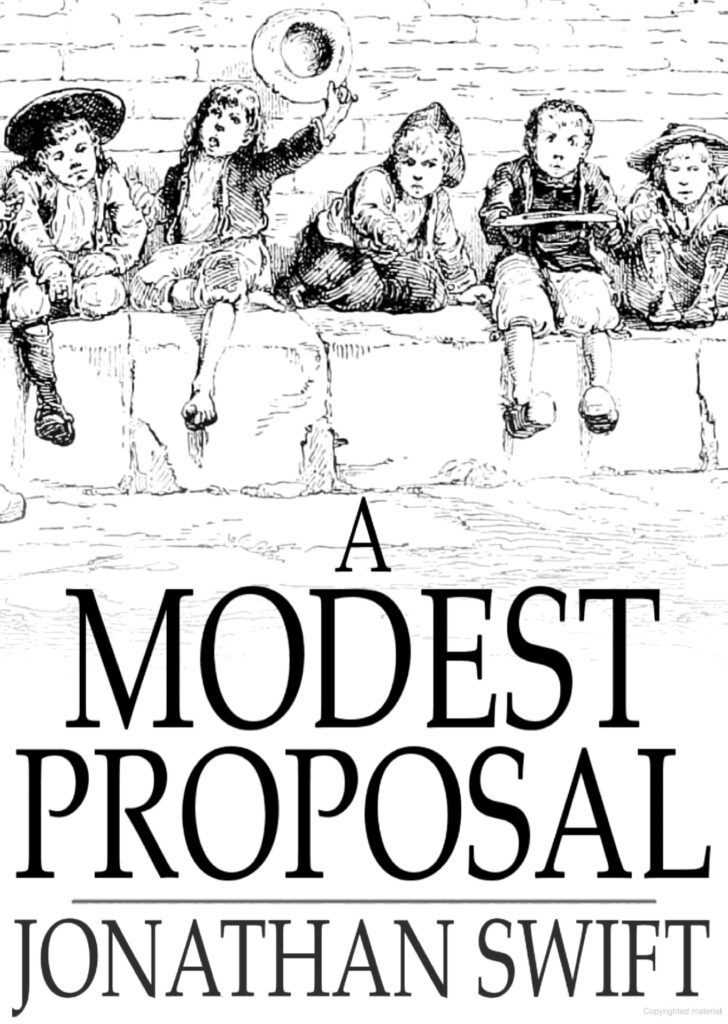
Jane Austen also excelled in this balance through her use of wit and irony to critique the social norms of her time. In “Pride and Prejudice,” Austen uses the character of Elizabeth Bennet and her sharp wit to both entertain and to subtly question the societal expectations placed on women, particularly regarding marriage and social status.
In modern times, television shows like “The Office” have continued this tradition. The show uses situational and character-driven humor to critique modern office culture, corporate management, and human relationships. The seemingly mundane setting of an office is transformed into a canvas for a humorous yet insightful commentary on the absurdities of everyday work life.
The key to achieving this balance lies in the subtlety of the critique. The humor should not overshadow the commentary; instead, it should be used to enhance it. This is achieved through careful crafting of characters, situations, and dialogues that are amusing on the surface but carry a deeper, often critical, meaning.
Great satire thrives on subtlety. It’s akin to a cleverly laid trap; the audience stumbles into realizations, rather than being directly confronted with them. This art of being implicit in your criticism is what separates good satire from mere parody or slapstick humor.

In “Parks and Recreation,” the character of Ron Swanson exemplifies a different approach to subtlety in satire. Swanson’s extreme libertarian views and his comical disdain for government, despite being a government employee, offer a nuanced critique of political ideologies and bureaucratic inefficiencies. The show refrains from directly mocking or condemning these views. Instead, it cleverly exaggerates them within a relatable and humorous framework. This leads viewers to reflect on and find humor in the paradoxes and contradictions inherent in real-world politics and government operations.
Similarly, consider the classic British sitcom “Yes, Minister.” The show never explicitly states its critique of bureaucratic inefficiency and political maneuvering. Instead, it uses the interactions and situations its characters find themselves in to highlight these issues. The audience is left to connect the dots, enjoying a laugh while simultaneously pondering the complexities of government and politics.
Subtlety in satire also involves using metaphors and allegories. Franz Kafka’s “The Metamorphosis,” while not traditionally satirical, uses the absurd situation of a man turning into an insect to subtly comment on alienation, dehumanization, and the absurdity of modern life. The reader is drawn into a bizarre narrative, only to slowly realize the underlying commentary on society.
The effectiveness of subtlety in satire is also about timing and pacing. The humor and critique should unfold at a pace that allows the audience to engage and reflect. It’s about dropping hints, not revealing the entire joke or critique upfront. The reveal, when it comes, should feel like a discovery to the audience, a reward for their engagement and understanding.
In crafting subtle satire, it’s important to maintain a balance. Too obscure, and the satire loses its impact; too obvious, and it becomes preachy. The goal is to encourage the audience to think critically, to question and to see the deeper meaning behind the humor.
Know Your Audience
The success of a satirical piece often hinges on how well the creator knows the beliefs, values, and sensitivities of their audience. Misjudging the audience can result in satire that is either too obtuse or too offensive, ultimately causing the piece to miss its mark.
One of the pitfalls of not understanding your audience is creating satire that is too esoteric. If the references, language, or the context of the satire are not accessible to the intended audience, it can lead to confusion rather than amusement or enlightenment. For instance, a satirical piece heavy with obscure literary references might resonate with an academic audience but could be lost on a general readership. This disconnect can make the satire seem aloof and unengaging.
On the other end of the spectrum, satire that is too blunt or heavy-handed can alienate the audience, especially if it crosses the line into insensitivity or offensiveness. For example, a satirical piece that makes light of a sensitive or traumatic event without considering the potential impact on those directly affected might evoke anger and backlash rather than prompting reflection or debate.
Stay Relevant: The Impact of Timeliness in Satire
Satirical works that tap into current events, social trends, and political happenings tend to resonate more deeply with audiences. This relevance not only enhances the humor but also sharpens the critique, making it a powerful tool for commentary on contemporary issues.
“Saturday Night Live” (SNL) exemplifies the effective use of current events in satire. The show’s sketches often reflect and comment on the latest political developments, pop culture phenomena, and societal trends. For instance, SNL’s political parodies, which have featured impressions of various U.S. presidents and political figures, capture not just their mannerisms but also the essence of the political climate. This timely reflection ensures that the satire is not just funny, but also poignant and thought-provoking.
Websites like “The Onion” and “The Babylon Bee” have taken the art of satirical news to a new level. These platforms publish articles that mimic the style and appearance of traditional news but with a satirical twist. They cover a wide range of topics from politics to culture, often commenting on recent news and events. For example, “The Onion” might publish a piece with a headline that’s a hyperbolic take on a current political issue, offering a humorous yet incisive critique of the situation. “The Babylon Bee” similarly uses satire, often with a more conservative slant, to comment on cultural and political issues, highlighting the absurdities in recent events.
Social media has become a fertile ground for satirical content. Memes, tweets, and short videos that satirize current events can go viral, spreading rapidly across social platforms. Yes, a meme can certainly be considered satirical. Satire often thrives on brevity and impact, qualities inherent in memes. These snippets can quickly and effectively convey commentary through a blend of images and text. This immediacy allows satirists to react quickly to events as they unfold, engaging with a broad audience in real-time. The speed and reach of social media have made it an invaluable tool for satirical commentary, enabling satirists to stay highly relevant and topical.
Writing satire is a delicate art that balances humor with critique, subtlety with clarity, and relevance with creativity. By choosing a clear target, finding the absurdity in the subject, using irony, maintaining a balance between humor and critique, being subtle, knowing your audience, and staying informed, your satirical piece – be it an article, script, story, poem, or song – can not only entertain but also offer insightful commentary.
Use AI for a Shortcut to Satire
Artificial Intelligence can write just about anything, and satire is no exception. We at Word.Studio have built a fun tool to help you quickly generate a nice blend of humor and commentary on the fly. If you would like to experiment with generating original satirical articles, try our Satirical Article Generator to draft a satirical article on just about any subject you can imagine. This is an emerging field, and AI doesn’t always excel at the nuance of humor and subtlety, but it certainly tries. You are welcome to take it for a spin to see for yourself here.
- This page was originally published by Word.Studio
- on January 10, 2024
- in Articles , Fun with AI , Writing

How to Use a Framing Device to Tell a Story Within a Story

Show, Don’t Tell: Illustrating Through Action and Description

Active Voice vs. Passive Voice
- More In Articles , Fun with AI , Writing
Related Tools

Word Art Generator
Generate word art from any text you enter in any style you choose or describe.

Review Responder
Craft thoughtful replies that turn customer reviews into opportunities for connection and loyalty.

Image Generator
A versatile image generator powered by Replicate Flux.1 Model

Roast My Profile
Enter your profile URL or paste your biography to receive some good-natured teasing.

Word Wizard
Build and discover unexpected words using a set of letters – a must-have for puzzle solvers, anagram lovers and creative thinkers.
- Browse All Tools

A suite of specialized AI tools that write, brainstorm, fine-tune, and unlock new creative superpowers. Subscribe to get full access to our entire library of tools.
Word.Studio is LLM agnostic, which means that our tools are run by the most powerful and appropriate AI models selected for the task at hand.

- Cover Letter Writer
- Freelancer Bio Writer
- Blog Post Writer
- Professional Bio Writer
- Article Writer
- Glossary Generator
- Business Tools
- Creative Tools
- Writing Tools
- Career & Job Search
- Hiring & Recruiting
- Sales Tools
- Teaching Tools
- Storytelling Tools
- Word.Studio Tools
- Articles & Tutorials
- GPT Directory
- Prompt Templates
- AI Glossary
- AI Tool Development
- Custom GPT Development
- Terms of Service
- Privacy Policy
Word.Studio 2024 - Terms & Privacy
- Essay Topic Generator
- Summary Generator
- Thesis Maker Academic
- Sentence Rephraser
- Read My Paper
- Hypothesis Generator
- Cover Page Generator
- Text Compactor
- Essay Scrambler
- Essay Plagiarism Checker
- Hook Generator
- AI Writing Checker
- Notes Maker
- Overnight Essay Writing
- Topic Ideas
- Writing Tips
- Essay Writing (by Genre)
- Essay Writing (by Topic)
Writing a Satire Essay: Guide and Examples
Satire has many forms that can be used to write works practically about any topic. Knowing where to start can be tricky if you have never encountered similar tasks at school before. But there’s no need to worry! Our team has developed this helpful guide for such an occasion. We will explain the basics of satirical essays and provide valuable tips on making them.
This article will also provide plenty of topic ideas on popular themes to make your work less stressful. You’ll also get to check out several satire essay examples that can serve as an inspiration for your work. Use our guide to make your paper come out great!
😁 The Basics of Satirical Essays
🔎 types of satire, 📝 writing a satire essay.
- 💡 Best Satirical Topics
- 🤩 Satire Essay Examples
📎 References
The American historian Barbara W. Tuchman states, “Satire is a wrapping of exaggeration around a core of reality.” This quote perfectly describes this exciting and controversial genre. But what is the definition of satire anyway? It’s the art of making something ridiculous, laughable, or discrediting. Satire is one of the oldest literary genres, dating back to Ancient Greece and the rhetorician Quintallian . It has different types, but their purpose is largely the same.
You can use satire to make fun of political ideologies, excessive militarism, or the pitfalls of modern society.
That’s precisely what many authors like George Orwell, Terry Pratchett, Joseph Heller, and Jaroslaw Hasek did in their works. They give a funhouse mirror look at real or fictional concepts and, sometimes, a mix of both.

Every essay type has an essential role, and this one is no exception. A satire essay serves the same purpose as its larger counterparts. It lets you poke fun or criticize things you find absurd. A paper can ridicule anything from the agony of bureaucratic procedures and nonsensical laws to the media climate and pop culture scene. It allows you to voice your opinion on these matters in a lighthearted and fun way.
Essentially, you can use three types of satire in your essays. Check them out before approaching a new piece of writing. This way, you’ll better select the most suitable for your subject and writing style .
| 😄 | This type of satire is the most common and uses light social commentary and humor. It pokes fun at a situation, an event, or a person emphasizing the entertainment value. , starring , remains one of its best examples. |
| 😆 | Unlike its Horatian counterpart, Juvenalian satire is darker and more bitter. Authors use it to express their outrage and anger at the world. An excellent example of Juvenalian satire would be the movies and the TV show . |
| 🤭 | Menippean style of satire judges a particular belief or attitude. It can be lighthearted or dark, depending on what suits the purpose better. One of the most famous examples of Menippean satire is ’s . |
Writing a satirical essay has much in common with other examples of this genre. You need an introduction, body paragraphs , and a conclusion. This section outlines the steps that will help you in this process. Read on to learn how to perfect your satire essay!

- Step 1 : Select a topic. Find a subject that’s preferably already ridiculous or ironic. Your goal is to make it look even more exaggerated. Political c artoons are an excellent place to find a suitable theme for your essay.
- Step 2 : Make your point through a hyperbole. Keep in mind that a hyperbolizing doesn’t necessarily mean lying. Instead, exaggerate the facts to highlight how absurd they are. For example, you can talk about how Norway’s economy is thriving thanks to the sheer amount of salmon they consume yearly.
- Step 3 : Present your ideas through irony . This literary device uses words and phrases to tell the opposite of what they mean. It allows you to show a disconnect between someone’s expectations and what happens in reality.
- Step 4 : Make it humorous. Keeping up a light tone can be challenging. But you should still do your best, as humor is a great way to get people to side with you and accept your position on an issue. It can win people over faster than weighted and meticulously explained opinions.
💡 Best Satirical Topics for an Essay
A satirical essay can be about any theme you like, from literary works to global events. To keep you from losing your head in this sea of possibilities, we’ve decided to present some of the funniest and most engaging topics for your writings.
But before we get started, here are some ideas on how you can come up with a cool satirical topic for your paper:
✅ Personal Experiences. Reflect on the moments from your life that struck you as odd or downright hilarious. Maybe it’s when you mistook a raccoon for your neighbor’s cat. Funny experiences often harbor unique insights that, when shared, can resonate with others due to their unexpected humor.
✅ Social Norms and Expectations . Explore instances when societal norms clash with reality. Let’s imagine your coworkers dressed in regular clothes to work while you and your friend dressed in Halloween outfits. By dissecting these contradictions, you can craft a story that entertains and subtly challenges societal norms.
✅ Current Events and Trends . Take a satirical lens to recent happenings, whether it’s an obsession with a new TikTok trend or an outfit from Rihanna or Doja Cat that other influencers are rushing to copy. Amplify the absurdity of these events to highlight their often-overlooked humorous side while satirizing the public’s reactions surrounding them.
✅ Everyday Life Observations . Delve into the nuances of daily life that typically go unnoticed. It could be the funny habits of your soulmate or people’s behavior on public transportation or elevators. By magnifying these quirks, you can reveal the hilarity and peculiarity of the routines we take for granted.
School and Education Satire Topics
- How to master Google search for your academic pursuits.
- The art of procrastination : How to avoid studying until the last minute.
- How to ace an exam without studying.
- The myth of a perfect student and how it wrecks the lives of collegegoers.
- A satirical look at the pitfalls of contemporary American education.
- College application essays: The most needless thing and how to ace it.
- Why you should spend years earning a degree you’ll never use.
- Group projects and how to survive them.
- Funny utopian school: Where homework is banned and recess is eternal.
- The unfair world of homework assignments.
Technology and Social Media Satire Topics
- The Me generation: How social media raises an army of narcissists.
- Informational addiction: Truth or even scarier truth?
- Why you should post everything online.
- Artificial Intelligence: Our doom or salvation?
- The virtues of being a social media star.
- Social media and its effect on your personal life.
- How to wreck your life with Facebook.
- TikTok and the modern media contagion.
- Top 10 apps that ruin your life.
- How to live one day without technology and stay sane.
Historical Satire Topics
- A satirical look at the rise and fall of the Roman Empire.
- The Third Reich’s WWII propaganda: A study in ridiculousness.
- Fighting for peace: A short look at the arms race.
- “Let them eat cake” and other phrases that changed history.
- Historical influence of satire on the American Dream perception.
- How the Cold War shaped American satire of the late 20th century.
- Medieval gun control: Unsheathing the hilarity of sword registry laws.
- The rise of authoritarianism and political satire.
- 1812 and the folly of Napoleon.
- Slavery in the land of the free.
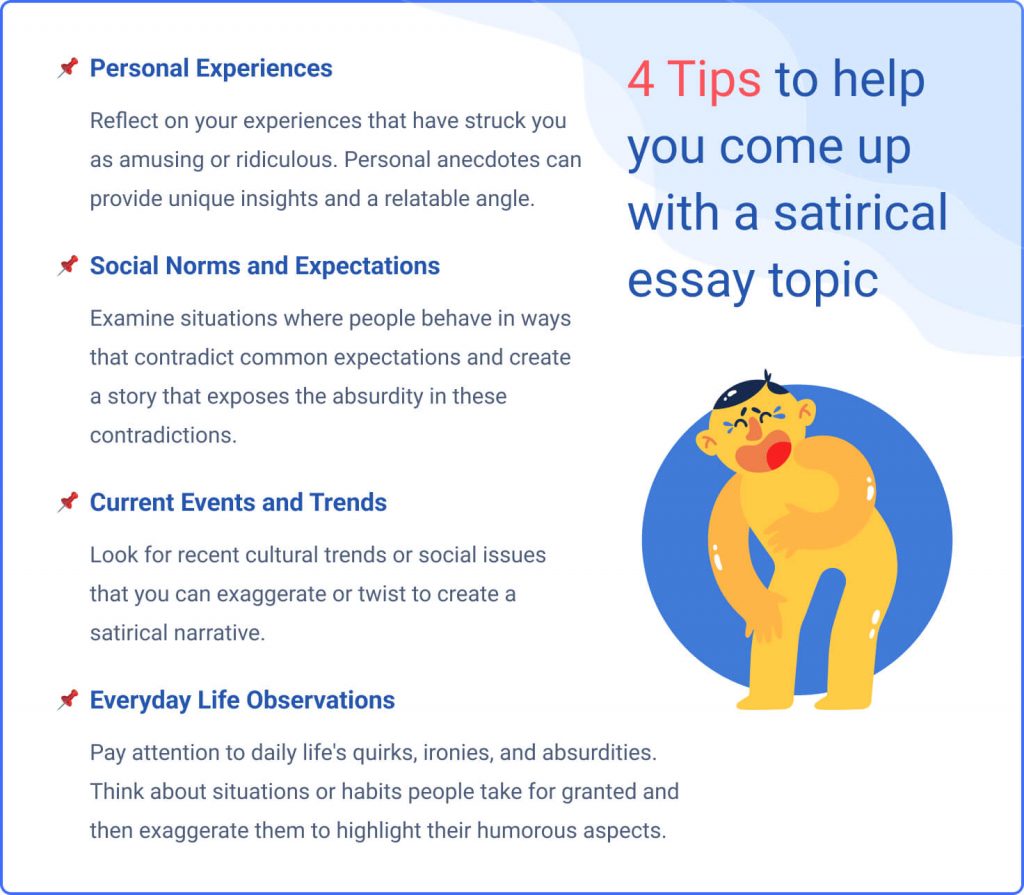
Politics and Government Satire Topics
- The wonderful world of the two-party system.
- Political promises: A study in honesty and integrity.
- A satirical look at the theatrics of political ads.
- The department of bureaucratic ballet: A satirical look at the government’s efficiency.
- How the US bureaucracy became the monster everybody loves to hate.
- A crash course in gaining political power without the fuss of democracy.
- Political dodgeball: Avoiding questions made easy.
- Ingenious solutions: How politicians promise to solve everything with catchy slogans.
- How to survive your next Thanksgiving dinner.
- How political division brings a country together.
Social Issues Satire Topics
- Ten ways to avoid pressing social issues and feel good about yourself.
- Why pulling yourself by the bootstraps no longer works.
- Eating your way to a healthier life.
- The luxury guide to poverty: How to embrace destitution with style.
- How to become an effective cyberbully.
- The selfie pandemic: A guide to self-obsession.
- Unemployment reality shows: Who wants to be a broke millionaire?
- Remaining private in a globally connected world.
- How to become a cut-throat millionaire.
- The great overpopulation and its humorous consequences.
Literature Satire Topics
- How to bore your audience while looking important.
- Outdated language: Making dictionaries cool again.
- Crafting complex plots with just simple literary techniques.
- A masterclass in confusing storytelling.
- How to write a novel that people won’t buy.
- The art of long-winded narrative in Stephen King novels.
- Endings that made you throw books out the window.
- Breaking the fourth wall and hilarious in-text solutions.
- How to talk about books without reading them.
- A guide to nonsensical plot twists.
🤩 Fantastic Satire Essay Examples
As we all know, theory is good but practice makes perfect. This is why we want to offer you these satire essay examples. Carefully reading through them will help you understand the elements they use and what makes them work. We suggest that you also try your hand at writing essays on these topics – compare them to our samples and see where you can improve!
- Failed Leadership Can Only Be Whipped by Satire George Orwell used Animal Farm to critique totalitarian regimes that oppress the masses. The work pokes fun at many authoritarian movements, from fascism to communism, with a strong and charismatic leader usurping the top position and gaining full power. But most prominently it’s an attack on the October Revolution and the rise of Joseph Stalin as the leader. On a broader scale, Animal Farm serves as a satire of communism that ultimately didn’t meet the high expectations that the USSR’s citizens anticipated. Each character symbolizes a class or type of individual with strong and weak character traits. The novel’s antagonist, Master Jones, represents the bourgeoisie that exploits workers to death. The animals, a.k.a the proletariat, revolt and overthrow his iron rule. While things seem better for a while, thanks to the efforts and philosophy of a pig called Old Major, everything quickly turns for the worse. That soon results in many tragic events and the farm falling into the hands of another pig named Napoleon. He usurps the prime position much like Joseph Stalin did from Leo Trotsky . Any mentions of his political rival are met with brutal retaliation. Pretty soon, nobody remembers the original ideas that spearheaded the revolution. Ultimately, the pigs take over the farm and start to resemble humans. It is a masterful allegory of the oppressed becoming the oppressors. Animals become rulers of the farm, but most live in the same squalor they started with. Of course, nobody who is “ more equal than others ” ever complains.
- Political Satire and Stephen Colbert Political satire has been around almost since the dawn of American independence. Over the past couple of decades, it has become a favorite subject of many shows, including the subject of this essay — Stephen Colbert . His The Colbert Report is a prime example of how to criticize the political climate with the right amount of humor and heart. Colbert’s approach to satire pulls no punches as he famously mocked former President George Bush Jr. during a White House Correspondent Dinner. He criticized Bush’s actions, lifestyle, beliefs, and foreign policy decisions. He especially criticized the decision to invade Iraq in 2003, which resulted in hundreds of thousands of casualties. Stephen Colbert used an ironic approach to discuss such issues to draw attention to them. While this was done lightheartedly, many people sided with Colbert. That allowed him to influence public opinion without being directly involved in politics. And Colbert always encouraged his viewers to do the right thing. Even though The Colbert Report ended in 2014, the man himself remains popular with American audiences. His current Late Night Show with Stephen Colbert enjoys millions of subscribers on YouTube and hundreds of millions of views. His previous program is still popular, with new people discovering it daily.
Thank you for reading our article. Hopefully, it helped you create a perfect satire essay. And if you need to find more ideas for your work, try out our essay topic generator !
❓ Satirical Essay FAQ
What is a satire essay.
A satirical essay sheds light on the absurdities of comical aspects of life. They are often used to criticize or make fun of a concept, a person, or a trend. This type of writing utilizes literary devices of irony and hyperbole to emphasize its message. Political satire is the most popular type in this field.
How to Start a Satire Essay?
Like any essay, it should start with an introduction. Here, you explain the theme of your work and what you want to shed light upon, be it a person, an event, or a concept. A good intro starts with a hook sentence for readers. Make it fun and engaging, and they’ll likely continue reading your satirical essay.
How to Write a Satire Essay?
First, find the right topic to make the subject of your essay. Second, use hyperbole and irony to point out the ridiculous aspects of the theme. You can check out examples of satirical papers to understand how these literary devices work. Finally, make the writing full of humor to drive your point home.
- What is Satire? || Definition & Examples. – Evan Gottlieb, Oregon State University
- 7 Satire Techniques With Tips. – Indeed
- The Process for Setting up a Satire Essay. – Loudoun County Public Schools
- What Is Satire? How to Use Satire in Literature, Pop Culture, and Politics—Plus Tips on Using Satire in Writing. – MasterClass
- Satirical Writing. – Del Donno, Lone Star College-University Park
- How to Write Satire. – Alex Baia
- 4 Ways to Come Up With a Great Essay Idea. – Oxford Royale Academy
- How to Use Satire, Sarcasm, and the Power of Contrast to Expand Your Writing Repertoire. – Dawn Bevier, Medium
- Writing Satire Is Harder Than You Think. – Jeff Goins, Writer
- Choosing a Topic. – The On-Campus Writing Lab & The OWL at Purdue and Purdue University
Home ➔ How to Write an Essay ➔ Satire Essay
Satire Essay Guide
A satire essay is a distinctive form of creative writing that employs irony, humor, and sarcasm to critique and illuminate the quirks and shortcomings of people and society. This genre is characterized by its distinct use of literary tools to critique and comment on societal norms, political landscapes, and cultural peculiarities. Here’s a closer look at what makes satire essays both challenging and enjoyable:
- Use of Irony, Humor, and Sarcasm : These essays harness the power of irony, humor, and sarcasm as primary tools. The aim is to entertain and shed light on the follies and foibles of people and society. Through these techniques, writers can dissect and discuss serious topics in an engaging and thought-provoking manner.
- Critique of Societal Issues : Often, satire essays gravitate towards topics of societal, political, or financial relevance. The goal is to ridicule human behavior, pointing out its absurdities and inconsistencies. This form of criticism is not just about poking fun but about instigating deeper thought and discussion among readers.
- Balancing Act of Writing : Crafting a satire essay is a fine balance between humor and insight. It involves understanding the subtleties of the issues at hand and presenting them in a witty and sharp way. This challenge makes writing satire essays a particularly enjoyable and rewarding experience for writers. It’s an opportunity to showcase creativity while engaging critically with relevant topics.
Satire essays, therefore, serve as a mirror to society, reflecting its characteristics in an exaggerated yet piercingly accurate manner. They challenge the writer to be both an entertainer and a commentator, using the pen as a social observation and critique tool.
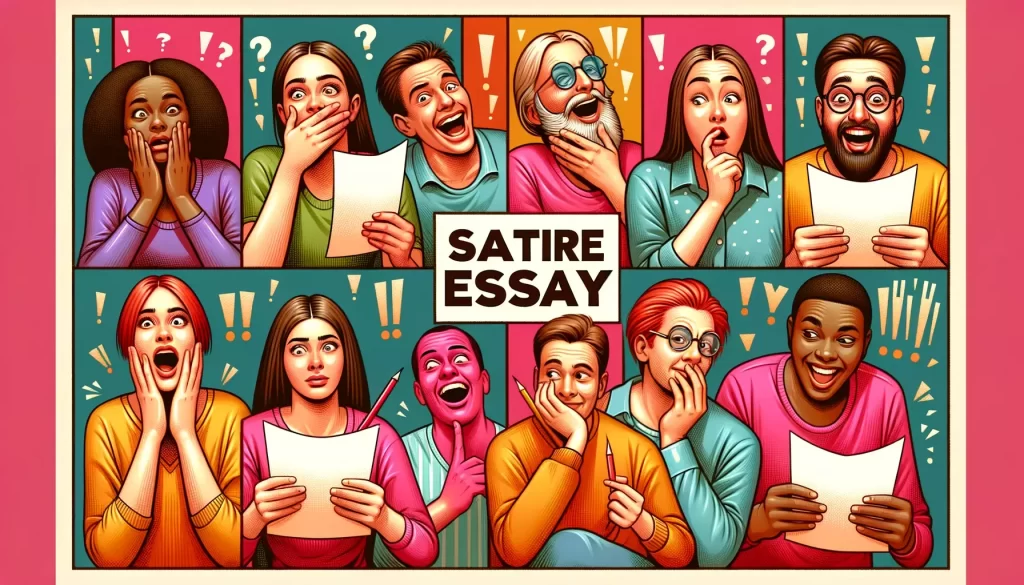
Satire Essay Structure and Outline
Delving into the structure of a satire essay is key to its success. While it shares similarities with traditional essays , the unique elements of satire set it apart and require a specialized approach. Understanding and mastering this structure can transform a simple essay into a sharp, witty commentary on societal issues.
At first glance, a satirical essay might resemble the conventional essay structure with an introduction, body, and conclusion. However, it’s the content and presentation within this framework that diverge significantly, adhering to the genre’s need for humor, irony, and critique:
- Introduction : This is where the tone of satire is set. The introduction must hook the reader with its wit while succinctly presenting the topic. A thesis statement in a satire essay often includes irony or hyperbole, making a bold claim about the topic.
- Body : The body of a satire essay is where the writer unfolds the satirical elements. This involves using exaggeration, irony, and sarcasm to dissect the topic. The body paragraphs should be cohesively structured, each focusing on a specific aspect of the topic and collectively supporting the thesis.
- Conclusion : The conclusion wraps up the essay, often with a twist or a final punchline. It should reiterate the main points in a way that emphasizes the satirical tone and leaves the reader with something to ponder.
Satire Essay Outline Example
Here’s an example of a satire essay outline on the topic “The Perils of Social Media”:
- Hook: An exaggerated statement about how social media is taking over the world.
- Thesis Statement: A satirical claim about social media, such as “Social media has evolved into a fundamental pillar of modern democracy, where likes and shares determine the fate of nations.”
- Paragraph 1: Discuss how social media has replaced traditional forms of communication with exaggerated examples.
- Paragraph 2: Satirical commentary on the impact of social media on self-image, using irony and hyperbole.
- Paragraph 3: Exploring the role of social media in politics, with a sarcastic tone about its reliability and impact.
- Summarizing the exaggerated impacts of social media mentioned in the body.
- Ending with a witty remark or a provocative question that underscores the satirical stance.
By adhering to this structure while infusing each section with satire, the essay maintains a balance between the traditional essay format and the unique demands of satirical writing. This approach entertains and provokes thought, making the satire essay a powerful tool for social commentary.
Techniques in Satire Writing
Mastering the art of satire writing involves more than just a sharp wit—it requires skillful use of various figures of speech to effectively weave humor, irony, and criticism. Understanding and applying these techniques can significantly elevate the impact and appeal of a satire essay.
Figures of Speech and Their Use in Satire
- For example, saying, “I had to wait an eternity for the bus this morning,” exaggerates the waiting time to critique inefficiency.
- For instance, saying, “What a great day for a picnic!” during a thunderstorm uses irony to comment on the situation.
- A satirical metaphor might describe a particularly lazy person as “a sloth in human form,” drawing an exaggerated comparison to emphasize laziness.
- For example, in a satire about bad roads, one might say, “The city’s road repair plan is full of potholes,” using the double meaning of “potholes.”
- Saying “It’s just a scratch” about a large dent in a car is an understatement that highlights the damage’s extent.
Balancing Humor with Factual Information
- Foundation in Reality : The essence of effective satire lies in its grounding in truth. Start with real facts or occurrences as the foundation of the satire.
- Exaggeration and Irony : Use these tools to twist these facts, presenting them in a humorous light. This approach not only entertains but also sharpens the critique.
- Engagement and Reflection : The satire becomes more than just amusing by tying humor to reality. It encourages readers to engage with and reflect on real-world issues.
Example : In a satire about climate change, the writer might humorously exaggerate future scenarios. While these exaggerations are amusing, they’re rooted in actual scientific predictions, lending both humor and weight to the satire.
Personalizing the Essay
- Narrative Style : Consider using first-person narration or incorporating personal anecdotes. This can make your satire more relatable and impactful.
- Concrete Context : Personal stories or experiences provide a tangible context for the satire. They help ground abstract criticisms in reality.
- Connection with Audience : Sharing personal insights or humorous experiences can forge a deeper connection with the reader. It transforms the essay from a broad critique to a reflection of personal societal observations.
Example : When tackling the absurdities of modern workplace culture, include personal stories or humorous observations from your own experiences in an office setting. This personal angle can make the satire more engaging and relatable, enhancing its effectiveness.
The Writing Process of a Satire Essay
Gaining inspiration and preparing for writing, sources of inspiration.
- Everyday Life : The quirks and oddities of daily routines can be a fertile ground for satire. Look for humor in mundane situations.
- News and Current Events : Keeping up with current events can provide timely material. Satirizing news stories can resonate well with audiences who are already familiar with the context.
- Social Media Trends : Platforms like Twitter and Instagram can be a snapshot of current societal obsessions and absurdities.
- Classic Satirical Works : Read works by renowned satirists like Jonathan Swift or Mark Twain to understand how satire has been effectively used in literature.
- Modern Satire : Explore contemporary satirical outlets like The Onion or television shows like “Saturday Night Live” for modern examples of satire.
- Diverse Styles : Expose yourself to different styles of satire – from subtle to overt, from political to social – to broaden your understanding.
- Reflect on Anecdotes : Think about funny or ironic incidents in your own life. Personal stories can add authenticity to your satire.
- Relatable Situations : Consider if your experiences reflect broader societal trends or behaviors. Relatability can enhance the impact of your satire.
Preparation Tips
- Idea Generation : Keep a notebook or digital note-taking app handy to jot down ideas as they occur throughout the day.
- Mind Maps and Lists : Use these tools to expand on your initial ideas, exploring different angles and aspects of the topic.
- Freewriting : Try writing non-stop about your topic for a set period to generate raw material that can be shaped into satire.
- Basic Structure : Draft a simple structure with an introduction, body, and conclusion to guide your writing.
- Key Points : Under each section, list out the main points or arguments you want to cover.
- Flexibility : Allow your outline to be flexible. As you write, you may find new directions or angles to explore.
By investing time in inspiration and preparation, you lay a solid foundation for an engaging and impactful satire essay. This preparatory phase sets the stage for a well-structured and thoughtfully crafted piece of satire.
Examples of possible satire essay topics:
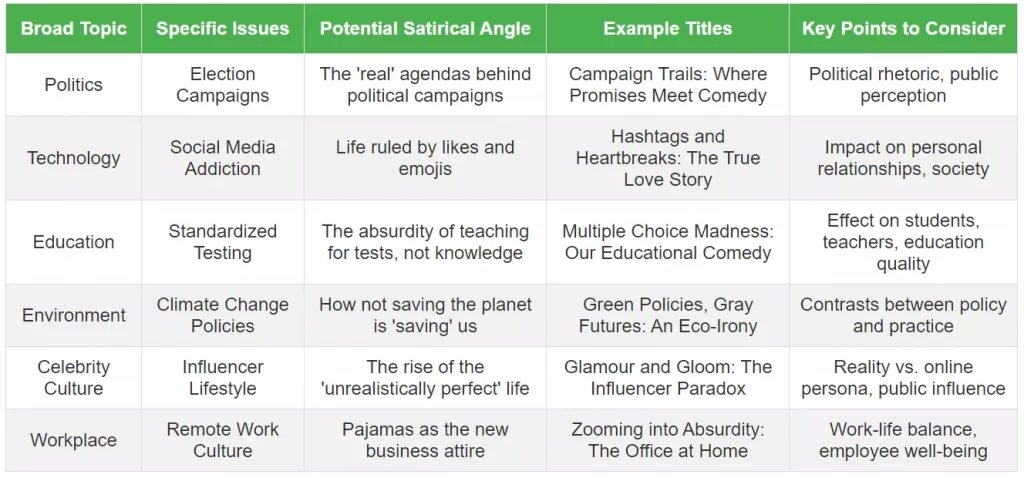
Understanding and Articulating Your Point
- Identify Your Angle : Determine your unique viewpoint on the topic. Ask yourself what specific aspect or issue you want to address.
- Opinion and Stance : Clearly articulate your own opinion or stance on the matter. This will be the backbone of your satire.
- Purpose of Satire : Decide whether your satire aims to merely entertain, provoke thought, or spur action. This will guide how you articulate your point.
- Focus on Specifics : Instead of covering the topic broadly, zero in on a specific aspect. Depth in a particular area provides a sharper and more focused satire.
- Relevance and Timeliness : Choose aspects of the topic that are timely and relevant to current discourse, as this enhances engagement and impact.
Writing the Introduction
- Stimulating Curiosity : Begin with a question that challenges conventional wisdom or provokes thought about the topic.
- Engagement : A well-phrased question can immediately engage the reader, setting the tone for the satire.
- Attention-Grabbing Data : Use surprising statistics or little-known facts related to your topic to capture immediate attention.
- Setting the Context : This approach can also provide a factual basis for the satirical elements to follow.
- Humorous Storytelling : Start with a brief, funny story or scenario that directly relates to your topic.
- Relatability : Anecdotes can make the topic more accessible and relatable to the reader.
Satirical Thesis : Your thesis should clearly encapsulate your satirical stance on the topic. It sets the direction and tone for the entire essay.
Clarity and Brevity : Make sure your thesis is concise yet comprehensive enough to convey the main satirical argument.
Example Introduction
“ In our brave new world, where thumbs-ups and heart emojis have become the new currency of human empathy, one can’t help but marvel: is our social fabric being rewoven by the very threads of social media, or are we just knitting ourselves a digital straitjacket? [Hook] This online odyssey, glorified as a tool for global connection, paradoxically unfolds as a saga of isolation, where virtual likes are pursued with a zeal that rivals ancient quests for mythical treasures. [Background Context] Through a kaleidoscope of exaggerated hashtags and meticulously curated personas, this essay playfully yet incisively dissects the social media paradox – our noble quest for digital omnipresence shadowed by an ever-growing disconnect from tangible reality. [Thesis Statement] In the following pages, we will embark on an exploratory jaunt through the fantastical landscape of social media, where every post and tweet is a testament to our curious dance with digital doppelgängers. [Preview of Main Points] ”
This introduction infuses more satirical elements, subtly hinting at the essay’s satirical nature without explicitly stating it. The hook employs a humorous, exaggerated metaphor, the background context satirizes the ironic situation of social media, and the thesis statement playfully yet critically addresses the paradox of social media. The preview of the main points sets the stage for an engaging and satirical exploration of the topic.
Developing the Main Body
Structuring your argument.
The main body of a satire essay is where the writer’s craftsmanship truly shines. Here, you’ll weave together irony, exaggeration, humor, and facts to build a compelling argument that not only entertains but also enlightens.
Paragraph Organization :
- Focused Arguments : Each paragraph should center around a single aspect of your topic. This focused approach helps maintain clarity and ensures that each paragraph contributes meaningfully to your overall thesis.
- Logical Flow : Ensure that your paragraphs flow logically from one to the next. Use transitional phrases to guide the reader through your argument, making the essay coherent and cohesive.
- Balanced Development : Spend sufficient time developing each point. While some aspects may require more elaboration than others, each paragraph should be fleshed out enough to make its point convincingly.
Creative Presentation :
- Irony and Sarcasm : Infuse your writing with irony to highlight contradictions or absurdities in the subject matter. Sarcasm, when used judiciously, can be a powerful tool to underscore your points.
- Exaggeration for Effect : Use hyperbole to exaggerate aspects of your topic for comedic or dramatic effect. This technique can help underscore the ridiculousness or seriousness of the subject.
- Humor : Incorporate humor to keep the reader engaged. This can be achieved through witty observations, humorous anecdotes, or playful language.
Evidence and Examples :
- Supporting Data : Use statistics, studies, or historical examples to back up your points. This factual support lends credibility to your satirical arguments.
- Real-World Examples : Draw from current events, personal experiences, or public figures to illustrate your points. Relatable examples can make your satire more impactful.
- Illustrative Anecdotes : Incorporate short stories or hypothetical scenarios that exemplify your points. These can be effective in demonstrating the implications of your argument in a vivid and engaging way.
In constructing the main body, balance is key. While satire is fundamentally about critique through humor, grounding your points in reality and logical argumentation ensures that your essay resonates with both intellect and wit.
Example Body Paragraph
“ As we delve into the realm of social media influencers, one cannot help but marvel at the modern-day alchemy of turning selfies into gold. [Topic Sentence] It’s a world where a well-angled snapshot garners more esteem than a Nobel Prize, and a pet’s Instagram account can amass followers rivaling a small country’s population. [Exaggeration for Effect] Consider the case of ‘Fluffy the Cat’, whose daily escapades fetch thousands of likes, overshadowing significant scientific breakthroughs in obscurity. [Real-World Example] This juxtaposition begs the question: are we valuing momentary digital amusement over substantial achievements? [Irony and Sarcasm] A study from Social Media Today reveals that engaging animal content receives 120% more shares than technical or scientific posts. [Supporting Data] Yet, this digital masquerade extends beyond the realm of furry influencers, seeping into the very fabric of our online interactions and self-perception. [Transition to Next Paragraph] ”
This body paragraph starts with a topic sentence that introduces the subject of social media influencers. It uses exaggeration to highlight the absurdity of their popularity, provides a real-world example to illustrate the point, incorporates irony and sarcasm to question societal values, and backs the argument with relevant statistical data.
Concluding the Essay
The conclusion of a satire essay is your final opportunity to leave a lasting impression on your reader. It should encapsulate the essence of your argument and offer a poignant or thought-provoking closing remark.
- Consolidate Key Points : Briefly revisit the main arguments or highlights of your essay. This helps reinforce your message and ensures it resonates with the reader.
- Cohesive Summary : Present a cohesive summary that ties together the satirical elements with the underlying message of your essay.
Personal Insight :
- Reflective Commentary : Offer a reflective or introspective comment that adds depth to your satire. This could be a personal insight, a rhetorical question, or a speculative look into the future.
- Lasting Impact : Aim for a closing statement that lingers in the mind of the reader, encouraging them to ponder over the issues you’ve raised.
Example Conclusion
“ As we wrap up this satirical journey through the labyrinth of remote work culture, we are left pondering whether our homes have become sanctuaries of productivity or just glorified cubicles with better snacks. [Recap] From Zoom mishaps to the constant battle against the allure of the fridge, our foray into this new work paradigm has been both humorous and revealing. [Consolidation of Key Points] Will we evolve into ultra-efficient, pajama-clad professionals, or will the lines between work and life blur into an unrecognizable haze? [Reflective Commentary] Only time will tell, but one thing is certain – the future of work will be anything but mundane. [Personal Insight and Lasting Impact] ”
This conclusion effectively summarizes the essay’s exploration of remote work culture with a humorous recap, consolidates the key points raised throughout, and ends with a reflective question and a personal insight that invite the reader to consider the future implications of the topic.
Common Pitfalls to Avoid
Writing satire can be a tightrope walk, and even the most skilled writers can sometimes stumble. Awareness of common pitfalls can help you navigate the complexities of satire writing more effectively.
- Overly Subtle Satire : While subtlety is a virtue in satire, being too cryptic can make your point miss the mark. The message may be lost if your audience needs to work too hard to understand the satire.
- Lack of Clarity : Ensure that while your satire is clever, it’s also clear and understandable. A balance between subtlety and directness is key.
- Heavy-Handed Satire : Satire that is too direct or blunt can come across as preachy or didactic, losing its humorous edge.
- Predictability : Avoid making your satire so straightforward that it becomes predictable. The element of surprise is often what makes satire engaging.
- Inadequate Research : One of the quickest ways to weaken your satire is to base it on a misunderstanding or a superficial grasp of the subject.
- Insensitivity : Be particularly cautious with topics that are sensitive or controversial. Misjudging the tone or content can lead to satire that offends rather than enlightens.
- Forgetting the Audience : Tailor your satire to your audience. What works for one group may not resonate with another.
- Overuse of Satirical Devices : Relying too heavily on any one device, like irony or hyperbole, can make your writing feel one-dimensional.
- Neglecting the Narrative : Remember that satire is not just a list of jokes; it should have a coherent narrative or argument.
Being mindful of these pitfalls can help you craft satire that is not only funny and clever but also effective and thoughtful. The goal is to strike the right balance in all aspects of your writing, from tone to content, to deliver satire that resonates and enlightens.
Examples of Successful Satirical Works
Analyzing successful satirical works can offer valuable insights into the effective use of satire. Let’s look at some notable examples and dissect what makes them stand out.

- Overview : Swift’s essay is a renowned example of satire, where he ironically proposes that the impoverished Irish might ease their economic troubles by selling their children as food to the rich.
- Key Elements : The essay uses extreme hyperbole and irony to criticize British policy towards the Irish. Swift’s absurd proposal is presented in a serious tone, starkly contrasting with its actual content, effectively highlighting the severity of the real issues.
- Overview : “The Onion” is a digital media company and newspaper known for its satirical articles on current events, cultural trends, and societal norms.
- Key Elements : These articles often use absurdity and exaggeration to comment on real-life events. The humor lies in presenting ridiculous scenarios in the format of serious news reporting, which serves to underscore the absurdities of the real world.
- Overview : This short story is set in a dystopian future where everyone is forced to be ‘equal’ in every conceivable way.
- Key Elements : Vonnegut uses this extreme scenario to satirize the potential dangers of enforced equality and the loss of individuality. The story’s exaggerated portrayal of a society obsessed with equality critiques real-world movements that ignore the value of individual differences.
- Overview : A novel that uses a farm of animals as a metaphor for the rise of Stalinism in the Soviet Union.
- Key Elements : Orwell employs allegory and fable-like storytelling to critique totalitarian regimes. Using animals to represent political figures and ideologies cleverly simplifies complex political ideas, making them more accessible and impactful.
- Overview : This satirical novella criticizes the optimistic philosophies of the time, particularly those of Leibniz, through the misadventures of its protagonist, Candide.
- Key Elements : Voltaire uses wit, irony, and absurdity to explore themes like injustice, hypocrisy, and the folly of blind optimism. Candide’s humorous and exaggerated misfortunes challenge the notion that we live in the ‘best of all possible worlds.’
These examples illustrate various approaches to satire, from Swift’s dark irony to Orwell’s allegorical storytelling. Each work uses humor and exaggeration to critique society, politics, or philosophical ideas, demonstrating the power of satire to provoke thought and challenge the status quo.
Bottom Line
Satire essays hold a unique place in creative writing, adeptly blending humor, irony, and critical commentary. This guide has highlighted the essentials of crafting effective satire, from understanding its nuances to mastering rhetorical techniques. We’ve explored how to structure arguments, select resonant topics, and avoid common pitfalls like being too obscure or on-the-nose. The focus has been on ensuring that satire not only entertains but also conveys insightful critiques.
In society, satire essays are more than just humorous pieces; they provoke thought and encourage discourse on societal issues. They illuminate the absurdities of everyday life and offer sharp commentary on complex topics, influencing how we perceive and discuss important issues. By learning from successful examples, writers can harness satire to reflect and shape societal norms and behaviors, making it a powerful tool for cultural and social commentary.
Read for more insights:
- Hutcheon, L. (2000). A Theory of Parody: The Teachings of Twentieth-Century Art Forms . University of Illinois Press. This book offers a comprehensive look at parody as a form of satire, exploring its historical development and its role in modern art and literature.
- Test, G. A. (1991). Satire: Spirit and Art. University of South Florida Press. This book provides an in-depth analysis of the spirit and artistry inherent in satirical works, examining the delicate balance between humor and critique.
- Bloom, H. (ed.) (2007). Satire. Bloom’s Literary Themes. Infobase Publishing. Edited by Harold Bloom, this collection of essays discusses the thematic elements of satire in literature, providing insights into its various manifestations.
- Gray, J., Jones, J., & Thompson, E. (eds.) (2009). Satire TV: Politics and Comedy in the Post-Network Era . NYU Press. This book explores satire in contemporary television, analyzing shows like “The Daily Show” and “The Colbert Report” and their influence on public discourse.
- Lockyer, S., & Pickering, M. (eds.) (2009). Beyond a Joke: The Limits of Humour . Palgrave Macmillan. This collection of essays examines the boundaries and ethics of humor, including satire, in various social and political contexts.
How to Write a Satire Essay: Examples, Outline and Topics

Ever wondered how to craft those hilarious yet thought-provoking satire essays that leave readers chuckling and pondering? Well, you've come to the right place!
Have you ever found yourself chuckling at the absurdities of life and thought, 'Hmm, there's definitely an essay in that'? Ever pondered how humor could be used to shed light on societal quirks and injustices? If so, you're already on your way to mastering the art of satire writing.
In this guide, you'll learn the ins and outs of writing satire essay examples. We'll cover everything from choosing the perfect topic to mastering the satire techniques. So, grab your pen, and let's have some fun being funny together.
What is a Satire Essay
A satire essay blends humor with social commentary to critique societal issues, human behavior, or institutions. Unlike traditional essays, it aims to entertain while highlighting life's absurdities.
This genre of writing uses wit, irony, sarcasm, and exaggeration to expose flaws and contradictions in society, targeting politics, popular culture, social norms, and human nature. It also addresses serious topics humorously, sparking conversation, inspiring change, and drawing attention to important social issues.
Satire essays come in various forms, from biting political critique to playful social commentary. Whether it's through clever wordplay, absurd scenarios, or biting satire, the goal of you as an essay writer is to entertain, enlighten, and challenge readers to see the world in a new light.
Who Said Essays Have to Be Dull?
Order our witty satire essays and transform your writing from dull to delightful.
Types of a Satire Essay
Learning how to write a satire essay requires you to understand its different forms, each with its own unique style and approach to humorously critiquing society. Whether you ask us to write my essay or tackle it yourself, understanding its different types can help you choose the best format for conveying your message effectively. Here are some common types:
.webp)
- Juvenalian Satire : This type of satire is harsh, bitter, and angry, focusing on exposing societal injustices, hypocrisy, and corruption.
- Horatian Satire : Named after the Roman poet Horace, this satire is lighthearted, playful, and witty, aiming to amuse while gently poking fun at human folly and societal absurdities.
- Menippean Satire : This satire is complex and unconventional, combining prose, verse, and various literary genres to critique society from multiple angles.
- Political Satire : Political satire humorously highlights the absurdities of politics, aiming to provoke thought and inspire change through parody and humor.
- Social Satire : Social satire critiques broader societal issues and cultural norms, such as relationships, consumerism, and technology, to prompt reflection on societal absurdities.
- Literary Satire : Literary satire uses literary conventions to critique traditions, genres, and authors, often through parody and metafiction.
- Visual Satire : Using images, cartoons, and caricatures, visual satire conveys satirical messages through humor and symbolism, often seen in political cartoons and memes.
25 Satirical Essay Topics
The topic you choose sets the stage for your humor and social commentary. From politics to pop culture, there's no shortage of informative essay topics that are also ripe for satirical critique. Here are 25 distinctive satirical essay ideas to inspire your satire:
- The Absurdity of Celebrity Culture : Explore the obsession with fame and the cult of celebrity.
- The Folly of Fashion Trends : Poke fun at the ever-changing world of fashion and beauty standards.
- The Myth of Perfect Parenting : Satirize the pressure to be a perfect parent in the age of social media.
- The Madness of Modern Technology : Lampoon our addiction to smartphones and social media.
- The Dystopia of Dating Apps : Examine the pitfalls of online dating and hookup culture.
- The Hilarity of Health Trends : Satirize the latest wellness fads and diet crazes.
- The Chaos of College Admissions : Explore the absurdities of the college application process.
- The Paradox of Political Correctness : Critique the complexities of navigating political correctness in today's society.
- The Irony of Environmental Activism : Satirize the contradictions inherent in environmental activism and green living.
- The Comedy of Corporate Culture : Examine the quirks and absurdities of office life and corporate culture.
- The Farce of Fashion Weeks : Lampoon the extravagance and pretentiousness of fashion weeks around the world.
- The Lunacy of Reality TV : Poke fun at the manufactured drama and shallowness of reality television.
- The Nonsense of Self-Help Books : Satirize the industry of self-help books and motivational seminars.
- The Ridiculousness of Social Justice Warriors : Critique the extremes of social justice activism and virtue signaling.
- The Comedy of Conspiracy Theories : Explore the bizarre world of conspiracy theories and their believers.
- The Absurdity of Gender Stereotypes : Satirize traditional gender roles and societal expectations.
- The Hypocrisy of Holistic Healing : Examine the contradictions of alternative medicine and holistic healing practices.
- The Parody of Political Campaigns : Poke fun at the theatrics and absurdities of political campaigns and election cycles.
- The Comedy of Class Reunions : Lampoon the nostalgia and awkwardness of high school reunions.
- The Folly of Fast Food Culture : Satirize the excesses and consequences of fast food consumption.
- The Madness of Memes : Explore the cultural significance and absurdity of internet memes.
- The Farce of Fashion Magazines : Critique the unrealistic beauty standards and consumerism promoted by fashion magazines.
- The Hilarity of Home Renovation Shows : Poke fun at the exaggerated transformations and drama of home renovation reality shows.
- The Paradox of Patriotism : Satirize the contradictions of nationalism and patriotic fervor.
- The Comedy of Cults and Communes : Examine the absurdities of fringe religious movements and utopian communities.
How to Write a Satire Essay: Outline Guide
Creating a solid satirical essay is like serving up a delicious dish of humor with a side of social commentary. But where do you start? How do you take your witty observations and turn them into a compelling satire essay? Fear not! In this section, we'll break down how to write a satire essay outline step by step, starting with crafting the perfect thesis statement.
.webp)
Start with a Thesis Statement
Writing a satire essay thesis statement is about encapsulating your satirical take on a particular issue or topic in a clear and concise manner. Your thesis statement should capture the essence of your satire – the target of your humor and the underlying message you're trying to convey.
For example, let's say you want to write a satire essay about the obsession with social media. Your thesis statement might be something like: 'In a world where likes and retweets reign supreme, social media becomes the ultimate stage for showcasing our most curated selves, blurring the lines between reality and virtual validation.'
This thesis statement sets the stage for your satire by highlighting the absurdity of our social media-driven culture and the disconnect between our online personas and real-life experiences. It presents a clear viewpoint that you'll then explore and dissect throughout your essay with humor and wit.
So, next time when crafting your thesis statement or asking us to write my thesis , remember to:
- Identify the specific issue or topic you want to satirize.
- Express your satirical take on the issue in a clear and concise manner.
- Ensure your thesis statement sets the tone for the rest of your essay and guides your readers toward your humorous critique.
Explain Your Idea in the First Body Paragraph
Now that you know how to start a satire essay and lay the foundation with your thesis statement, it's time to dive into the first body paragraph. Begin by expanding on the central idea introduced in your thesis statement. Keep the tone light and playful, but also ensure that your satire is rooted in truth and relevance.
Continuing with our example thesis statement about social media obsession, the first body paragraph might delve into the ways in which social media platforms have become integral parts of our daily lives. You could discuss the addictive nature of scrolling through feeds, the pressure to curate the perfect online persona, and the impact of social media on mental health and self-esteem.
Use descriptive language and vivid imagery to paint a picture of the absurdities inherent in the topic you're exploring. Highlight contradictions, hypocrisies, or ironies that underscore the satirical angle of your essay.
For instance, you might describe the lengths people go to for the perfect selfie or the absurdity of chasing virtual likes and validation. You could share personal anecdotes or humorous observations to bring the topic to life and engage your readers' imaginations.
Add More Layers in the Second Body Paragraph
Building upon the groundwork laid in the first satire essay paragraph, this section allows you to explore additional facets of the topic and further develop your satirical critique. Start by identifying specific examples, scenarios, or observations that illustrate the absurdities or contradictions inherent in the topic you're satirizing.
Here, you might focus on the ways in which social media distorts our perceptions of reality and fuels a culture of comparison and envy. You could discuss the phenomenon of "FOMO" (fear of missing out) and the pressure to present a flawless image online, even if it's far from authentic.
You might also share stories of people going to extreme lengths to capture the perfect Instagram photo or the impact of cyberbullying and online harassment on mental health.
As you write the second body paragraph, strive to maintain a balance between humor and substance. Use humor to engage your readers and keep them entertained, but also provide meaningful commentary that prompts reflection and critical thinking.
Wrap Up with Impact
As you wonder how to end a satire essay, remember to summarize the key points you've made about the topic at hand.
For example, in our satire essay about social media obsession, the conclusion might reiterate the pitfalls of seeking validation through likes and retweets, emphasizing the importance of authenticity and genuine human connection in a digital age.
Reflect on the broader implications of the topic you've explored and offer insights or suggestions for addressing the issues raised in your satire. This could involve proposing alternative approaches or solutions in a humorous manner, providing a sense of closure and hope amidst the laughter.
Finally, consider the overall impact of your satire essay and the emotions it evokes in your audience. Did you succeed in entertaining, enlightening, and provoking thought? Did you strike the right balance between humor and substance? Now that you know how to write a conclusion for an essay , reflect on your writing process and consider how you can continue to refine your skills as a satirist.
Handy Tips and Tricks
Before you begin making funny comments about society, let's talk about some easy tips to help you start. Writing a satire essay is all about being funny, using irony, and being a bit smart. If you need some assistance, you can ask us to help me do my essay . But for now, let's take a closer look at how you can improve your skills.
- Pick Your Focus : Satire works best when you make fun of something specific in society that you find funny or annoying.
- Try Different Things : Use different ways to be funny, like making jokes, using irony, or exaggerating things.
- Keep an Eye Out : Pay attention to what's happening around you for ideas. Satire often comes from real-life events or how people act.
- Look at Things Differently : Try writing from different viewpoints, like pretending to be a silly politician or a funny commentator.
- Have Fun : Remember, satire is all about having a good time and making people laugh. So, enjoy yourself and don't take it too seriously.
Satire Essay Examples
Through humor and wit, these satire essay examples offer insightful critiques of their respective subjects, demonstrating effective techniques for crafting satirical commentary.
4 Satire Essay Examples from World Literature
Satire is a popular tool in world literature, where famous writers use humor and irony to poke fun at society and human foolishness. Let's look at some well-known satire essay examples from literature and see how they work:
- 'Gulliver's Travels' by Jonathan Swift : Swift's 'Gulliver's Travels' is a political satire masterpiece. Through Lemuel Gulliver's wild adventures, Swift mocks 18th-century British society and human nature. One famous episode is Gulliver's visit to Lilliput, where tiny inhabitants squabble over silly things like how to crack an egg. Swift uses these absurdities to show the silliness of politics and people.
- 'Don Quixote' by Miguel de Cervantes : Cervantes' 'Don Quixote' pokes fun at chivalric romance. The main character, Don Quixote, is a delusional knight who goes on crazy quests to revive chivalry. Through his funny adventures, Cervantes criticizes the exaggerated ideals of honor and love. The book shows how fantasy can clash with reality in funny ways.
- 'Animal Farm' by George Orwell : Orwell's 'Animal Farm' is a powerful satire on totalitarianism. Animals rebel against humans on a farm, but soon, pigs take over and become dictators. Orwell uses the animals to represent political figures and ideas, showing the hypocrisy of authoritarian rule.
- 'Candide' by Voltaire : Voltaire's 'Candide' is a sharp satire on Enlightenment optimism. The main character, Candide, faces tragic and absurd situations but still believes everything is great. Through Candide's crazy adventures, Voltaire mocks the blind optimism of his time, revealing the harsh truths of human suffering and foolishness.
Final Words
Give yourself a pat on the back – you made it to the end of our writing adventure! With your sense of humor and a fresh understanding of life's funny quirks, you're all set to let your creativity loose on the page.
Just a friendly reminder: Satire isn't just about making jokes – it's a way to start conversations, question the status quo, and maybe even shake things up a bit. So, don't hold back! Try out different styles, go where your imagination takes you, and most importantly, be yourself.
Bored of the Same Old Essays?
Time to shake things up! Inject some humor into your academic life with our side-splitting satire essays.
How to Write a Satirical Essay?
What is a satirical essay, what is a good satire essay topic.

Daniel Parker
is a seasoned educational writer focusing on scholarship guidance, research papers, and various forms of academic essays including reflective and narrative essays. His expertise also extends to detailed case studies. A scholar with a background in English Literature and Education, Daniel’s work on EssayPro blog aims to support students in achieving academic excellence and securing scholarships. His hobbies include reading classic literature and participating in academic forums.

is an expert in nursing and healthcare, with a strong background in history, law, and literature. Holding advanced degrees in nursing and public health, his analytical approach and comprehensive knowledge help students navigate complex topics. On EssayPro blog, Adam provides insightful articles on everything from historical analysis to the intricacies of healthcare policies. In his downtime, he enjoys historical documentaries and volunteering at local clinics.
.webp)
Crafting Wit and Wisdom: A Guide to Satire Essay, Topics and Examples
Table of contents
- 1 Definition of satire and its historical background
- 2 Elements of a Satirical Essay
- 3 Choosing a Topic
- 4 Analyzing the Subject Matter for Potential Angles of Satire
- 5 Writing the Essay
- 6 What is a Satirical Essay: Examples of Satirical Essays
- 7 Fine Line Between Satire and Offensiveness
- 8 Concluding Thoughts: The Art of Writing the Satire Essay
In this insightful article, we delve into the realm of satire essays, a unique form of writing that blends criticism with humor.
Here’s what we’ll cover:
- Unveiling the essence of satire essay, its history, and types like Horatian and Juvenalian.
- Exploring the vital elements of a satirical essay, emphasizing a robust thesis, and the use of irony and sarcasm.
- Navigating the process of choosing engaging topics, including 50 hand-picked suggestions.
- Detailed guidance on structuring your satirical essay for maximum impact.
- Learning from examples of renowned satirical essays.
- Understanding the delicate balance between satire and sensitivity.
Join us as we explore these facets of satire essay writing, equipping you with the knowledge to create compelling, thought-provoking academic essays .
Definition of satire and its historical background
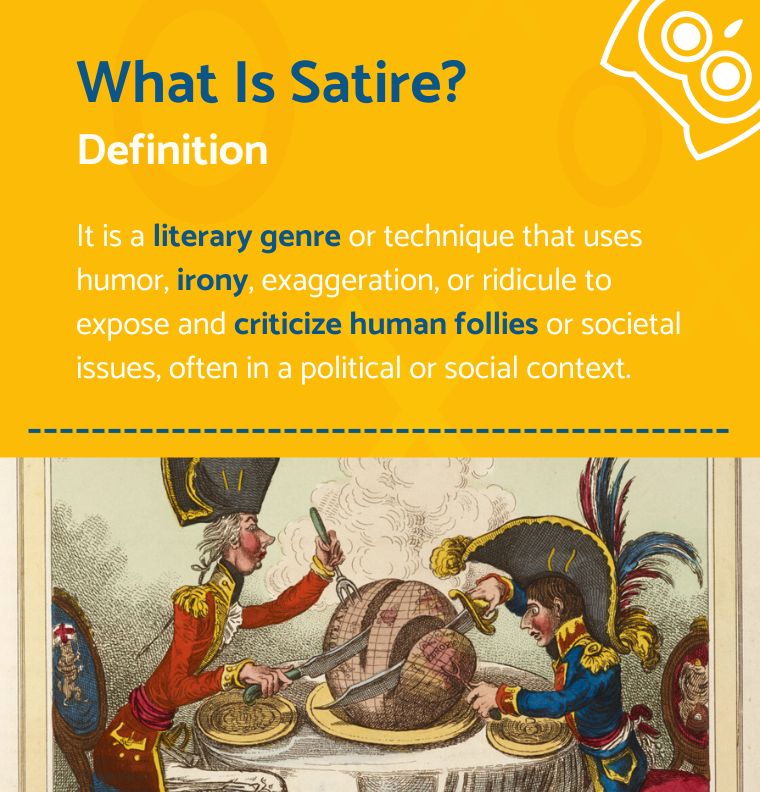
Satire, a literary genre known for its clever blend of humor and critique, has a rich history and diverse forms. Originating in ancient times, satire has been used to expose follies and vices in society, individuals, and institutions. The two main types of satire are Horatian and Juvenalian. Horatian satire, named after the Roman poet Horace, is characterized by a light-hearted and humorous tone, aiming more to amuse than to condemn. In contrast, Juvenalian satire, inspired by the Roman poet Juvenal, is more severe and abrasive, often expressing indignation and moral outrage.
The role of humor, irony, and exaggeration in satire cannot be overstated. These elements are tools for satirists to entertain, provoke thought, and challenge the status quo. For instance, exaggeration can highlight the absurdity of a situation, while irony can reveal contradictions and hypocrisies.
When considering topics for satire, it’s important to choose ones that resonate with the audience and remain relevant. Satire essay topics can range from light-hearted social commentary to more biting political criticism. The key is to select a subject that offers ample scope for humor and insightful critique. A satirical essay becomes an impactful tool for social commentary and change by selecting and handling these topics.
Elements of a Satirical Essay
A satirical essay is a unique fusion of humor and criticism woven to convey a thought-provoking message. Central to its success is a robust, clear thesis statement. This serves as the essay’s cornerstone, encapsulating the satirical argument. The thesis should be forthright and reflect the writer’s stance on the subject matter, whether it’s tinged with mockery, a critical edge, or a humorous slant.
The employment of rhetorical devices like irony, sarcasm, and parody is integral to the essence of a satirical essay. Irony stands out as a potent tool. It enables writers to express one thing while implying something else, often the opposite. This juxtaposition of the literal and the intended meaning adds layers to the satire, enriching its impact. Sarcasm, a variant of verbal irony, is adept at mocking or expressing disdain. On the other hand, parody involves imitating a subject or style to expose its flaws and absurdities.
A satirical essay is a clever blend of humor and critique, anchored by a clear, strong thesis and brought to life with the strategic use of rhetorical devices like irony, sarcasm, and parody. The choice of topic is crucial, as it needs to lend itself to satirical treatment, allowing the writer to lampoon the subject while engaging and enlightening the reader.
Choosing a Topic
The best topics for a satirical essay are those that resonate with your audience and remain relevant over time. Current events, social behaviors, and cultural phenomena are fertile grounds for satire. While choosing, consider what things to write a satire about that would engage and provoke thought in your readers. The effectiveness of your satire will depend on the relevance and universality of the topic selected.
When considering satire ideas, the topics should be chosen for their potential to be viewed through a satirical lens. This could involve turning a critical eye on societal norms, political policies, or even everyday absurdities. Funny satire topics revolve around current events, popular culture, or universal human behaviors, offering a wealth of material for insightful yet humorous critique.
Satirical essay ideas should aim to entertain, provoke thought, and encourage reflection. Topics to satirize can range from the mundane to the controversial, each offering a unique opportunity to highlight inconsistencies, hypocrisies, or the humorous side of life.
Here are some current and timeless topics that work well for satirical essays.
- The Perpetual Pursuit of the Perfect Body Image
- The Digital Detox: Escaping Social Media’s Grip
- The Billionaire Space Race: A New Playground for the Rich
- Fast Fashion Frenzy: The Race to the Bottom of Your Closet
- The Automation of Everything: When Robots Take Over Daily Tasks
- The Evolution of the Coffee Culture: From Bean to Obsession
- The “Influencer” Lifestyle: Reality vs. Instagram
- The Political Tug-of-War: A Satirical Look at Partisan Politics
- The Self-Help Paradox: More Books, Less Clarity
- The Tech Disconnect: Smartphones and the Illusion of Connection
- The Art of Procrastination in the Digital Age
- The College Admissions Arms Race: A Game of Prestige and Pressure
- The Corporate Buzzword Bingo: Synergy, Leverage, and Disruption
- The Quest for Immortality: Silicon Valley and the Fountain of Youth
- The Satire of Surveillance: Living in a Panopticon
- The Cult of Productivity: Doing More, Enjoying Less
- The Modern Dating Scene: Swiping Left on Romance
- The Vegan Revolution: Meatless Mondays and Beyond
- The Age of Misinformation: Navigating a Post-Truth World
- The Gig Economy Grind: Freedom or Freelance Frenzy?
- The Generation Gap: Baby Boomers vs. Millennials vs. Gen Z
- The Reality TV Paradox: Fame, Fortune, and Fabrication
- The Luxury of Minimalism: Spending More to Have Less
- The Endless Streaming Cycle: From Binge-Watching to Burnout
- The Battle Against Aging: Creams, Serums, and Unrealistic Expectations
- The Festival of Fads: Detoxes, Cleanses, and Other Health Mysteries
- The Tyranny of the Tidy: Marie Kondo and the Quest to Declutter
- The Irony of Connectivity: Lonelier in a More Connected World
- The Mirage of the “Perfect” Family on Social Media
- The Paradox of Choice in the Modern Consumer Society
- The DIY Disaster: When Pinterest Dreams Face Reality
- The Pursuit of Happiness Through Retail Therapy
- The Sacred Rituals of the Morning Routine YouTube Gurus
- The Mock Election: Satirizing Political Campaign Promises
- The Superhero Syndrome: The Oversaturation of Comic Book Movies
- The Great Organic Odyssey: Is It Really Better?
- The Exotic Pet Epidemic: From Tigers to Tarantulas
- The High Seas of Hobby Collecting: From Stamps to Sneakers
- The Dystopia of Driverless Cars: Are We There Yet?
- The Parable of the Paperless Office: More Paper Than Ever
Analyzing the Subject Matter for Potential Angles of Satire
Once you’ve selected a topic, the next step is to analyze it for satirical potential. Begin by identifying the subject’s inherent absurdities, hypocrisies, or contradictions. This critical examination allows you to uncover potential angles for satirical commentary. For example, in political satire, you might focus on discrepancies between a politician’s words and actions. In cultural satire, you could highlight the extremes of societal trends. This stage is vital as it sets the foundation for your satirical approach, shaping the direction and tone of your essay.
Remember, the goal is to provoke thought and discussion by presenting familiar issues in a new, humorous light. Your analysis should strike a balance between humor and insight, ensuring that your satire resonates with the audience while offering a fresh perspective on the topic.
Writing the Essay
Writing a satirical essay involves a strategic combination of humor, criticism, and a well-structured satirical essay outline . Begin with an engaging introduction that captures the essence of your satire. This could include an anecdote, a surprising fact, or a bold statement setting your essay’s tone. The introduction should culminate in a clear, concise thesis statement that encapsulates your satirical stance.
As you move into the body of your essay, each paragraph should focus on a specific aspect or example of your topic. This is where you can showcase different types of satire, such as irony, exaggeration, or parody, to strengthen your argument. Use vivid and descriptive language to paint a clear picture for your readers. Incorporating real-life examples or referencing satirical essay examples can illustrate your points. Balancing humor with factual information is important, ensuring your essay is entertaining and informative.
Consider using various rhetorical strategies to enhance your satire when developing your argument. Techniques like hyperbole can exaggerate your topic’s absurdities, while irony can highlight contradictions and inconsistencies. Sarcasm can add a sharp edge to your critique. Remember, the goal is to provoke thought and encourage a deeper understanding of the subject matter through humor.
In the concluding paragraph, summarize the main points of your essay, reinforcing your satirical message. The conclusion should echo your thesis and leave a lasting impression on the reader. A well-crafted conclusion will tie all your ideas together, emphasizing the significance of your satire and its impact on the reader’s perception of the topic.
Throughout your essay, maintain a consistent tone and style. The best satire essays are those that blend wit with wisdom, using humor as a tool to shed light on serious topics.
What is a Satirical Essay: Examples of Satirical Essays
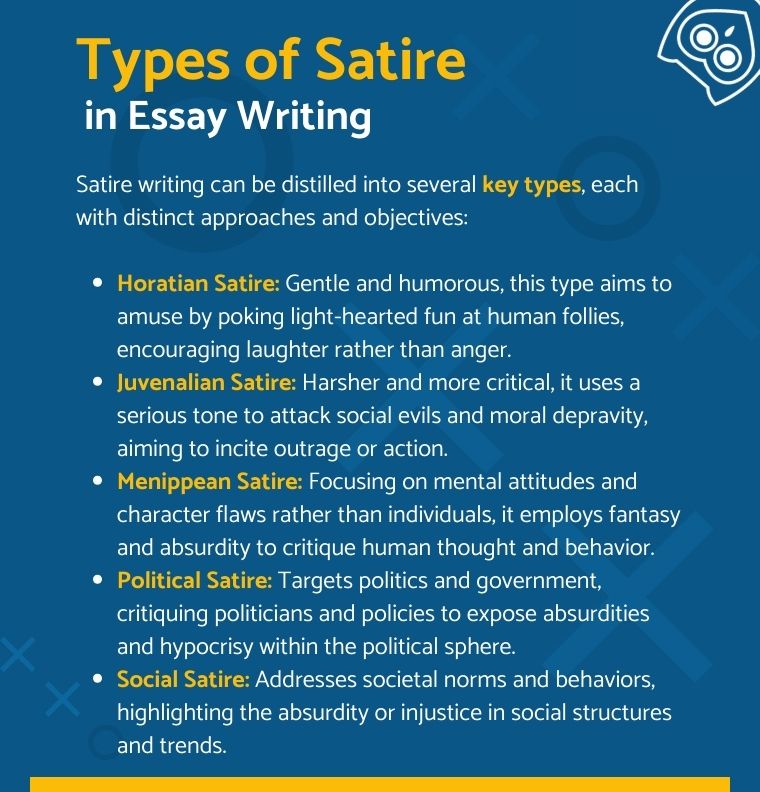
The satirical essay genre blends humor with incisive social commentary. This essay leverages wit to critique everything from political policies to societal norms, often revealing underlying truths in an entertaining and thought-provoking way.
A classic satire essay example is Jonathan Swift’s “A Modest Proposal ,” a pinnacle of Juvenalian satire. Swift’s essay, known for its biting and ironic tone, suggests that the impoverished Irish could alleviate their financial woes by selling their children as delicacies to the wealthy. This preposterous idea is not a whimsical musing but a sharp indictment of the brutal British policies towards the Irish and a comment on the apathy of the Irish people to their own plight.
This essay is a prime illustration of how to start a satire essay. Swift adopts a grave and sincere tone to advance an absurd proposition. This stark contrast between his tone and the ludicrousness of his proposal accentuates the absurdity of the situation he critiques. This strategic use of irony, where the true intent is veiled behind an opposite statement, is common in satirical essays. It allows writers to deliver powerful critiques in an engaging and impactful manner.
Another form of satire is Horatian satire, deriving its name from the Roman poet Horace. This type of satire differs from the abrasive Juvenalian style. A more playful, lighthearted approach characterizes Horatian satire. It tends to poke fun at human foibles and follies without aiming to cause distress or provoke significant change. It’s a more subdued and humorous satire, intending more to amuse than agitate.
For authors drafting a satirical essay, the choice of satire type is vital. It should align with both the subject matter and the intended message.
By analyzing seminal works like Swift’s “A Modest Proposal,” writers can learn to employ satire, creating works that are not just humorous but also insightful and thought-provoking. Effective satire has the power to be an influential tool for social commentary and change, making it a valuable and enduring form of literary expression.
Fine Line Between Satire and Offensiveness
Navigating the delicate boundary separating satire from offensiveness is paramount. While satire wields the potential for profound impact, it teeters on the edge of insensitivity. Responsible satirists know their audience and the broader context, ensuring their work critiques without inflicting harm. When addressing sensitive subjects, a delicate equilibrium is required. Satire becomes a tool for enlightenment rather than alienation or offense, using humor to shed light on societal issues without causing undue distress.
Concluding Thoughts: The Art of Writing the Satire Essay
In summary, the art of satire is a powerful yet intricate tool, merging humor with sharp social observation. Its core objective is to question established norms and provoke self-reflection. To write an effective satire essay, one must balance insightful critique with an approach that avoids offending. This genre requires a delicate touch, using wit and irony to make a point. An essential aspect of crafting a satirical piece involves creating a well-structured outline that supports the satirical thesis while engaging the reader. The creators and consumers of satire need to appreciate its significant potential to influence and its inherent responsibility towards society. Satire is not a literary device but a call to use its capabilities with wisdom and consideration.
Readers also enjoyed

WHY WAIT? PLACE AN ORDER RIGHT NOW!
Just fill out the form, press the button, and have no worries!
We use cookies to give you the best experience possible. By continuing we’ll assume you board with our cookie policy.
Write, learn, make friends, meet beta readers, and become the best writer you can be!
Join our writing group!
What is Satire? Examples, Definition, and How to Write Satire

by Fija Callaghan
Fija Callaghan is an author, poet, and writing workshop leader. She has been recognized by a number of awards, including being shortlisting for the H. G. Wells Short Story Prize. She is the author of the short story collection Frail Little Embers , and her writing can be read in places like Seaside Gothic , Gingerbread House , and Howl: New Irish Writing . She is also a developmental editor with Fictive Pursuits. You can read more about her at fijacallaghan.com .
You’ve probably come across satire in your daily life without even realizing it. From contemporary pop culture platforms like Saturday Night Live to the hand-drawn caricatures artists use to pull in the tourists, satire is everywhere.
But what does satire mean, exactly, and where does it come from? Can it ever be useful to us as poets and fiction writers? Keep reading for everything you need to know about this contentious literary device.
What is satire?
Satire is a literary genre which uses a fictitious lens to ridicule or draw attention to real-world failings, especially societal or political issues. Satirical stories often use elements like irony, hyperbole, and juxtaposition to show the reader the innate silliness or degradation in a person, group of people, or societal value.
For example, if you want to take a stand against a corrupt and dangerous political party, you could write a story about a ridiculous and lecherous king who inadvertently drives his kingdom into poverty. Or, if you want to draw attention to the arbitrariness of racial segregation, you could write a satire about a society in which people are judged by whether they were born at an even-numbered hour or an odd one.

By taking an element of the world around you that you disagree with and amplifying it, you can convey a real and powerful social commentary to your readers.

What’s the difference between satire and parody?
Satire and parody have a lot in common, and it’s easy to get them confused. Sometimes, they even overlap. The main difference between satire and parody is the message they’re trying to convey to their audience.
A parody emulates another work or body of work using exaggeration and humor. The purpose of a parody is to entertain. For example, Scary Movie is a parody of the horror movie genre, and Pride and Prejudice and Zombies is a parody of Jane Austen’s famous novel. Rather than relying on deep, thought-provoking themes, these parodies use comedy to create a fun reading or viewing experience.
A satire, on the other hand, is a form of social criticism. While it often uses humor (though not always—we’ll look at the different types of satire below), its purpose is to make the audience think about a social issue in a new way or draw attention to aspects of these issues that have been problematic.
For instance, a satire of the horror movie genre would probably be less funny and more focused on asking questions about why people are drawn to body horror, or why certain tropes so often feature minority identities. In other words, satire is meant to get people thinking critically about human nature. And Pride and Prejudice is already a satire! It uses humor to poke fun at the constricting marriage conventions and social politics of the time.
Types of satire in literature
We tend to think of satire as one literary genre, but did you know there are actually a few different kinds? Here’s a closer look at the different types of satire you’ll find across history.
Horatian satire
Horatian satire, popularized by the Roman poet Horace, is a lighthearted and comic way of poking fun at the foibles of human nature. While this type of satire encourages its audience to examine their own errors of judgement and grow, the social criticism tends to be on a more personal level—Horatian satire isn’t trying to bring about a widespread cultural change.
Contemporary examples of Horatian satire are tongue-in-cheek news platforms like The Onion or The Colbert Report . Gulliver’s Travels by Jonathan Swift—one of recent history’s most notable satirists—is a famous example from classic literature. Today, this is generally what we think of when we think of the word satire.

Juvenalian satire
If you think Juvenalian satire is juvenile, you’re off the mark—the name comes from the poet Juvenal. This type of satire is dark, bitter, and carries a core message: something is very wrong in the world today, and Imma tell you why.
Juvenalian satire isn’t meant to make the reader laugh, but rather to draw the reader’s attention to problems in contemporary culture. You’ll often find this type of satire in dystopian fiction. For example, The Hunger Games can be seen as a Juvenalian satire of reality television and celebrity culture.
Menippean satire
Menippean satire comes from the philosopher Menippus, and refers to satirical writing that explores broad, general flaws in humanity. Traditionally, these often denounced the problems in upper class intellectualism and elitist attitudes towards the working class. However, Menippean satire can also be used as a lens through which to examine contemporary issues like homophobia, agoraphobia, or racism.
This type of satire can overlap with Horatian and Juvenalian satire, and it can be amusing or bleak. Lewis Carroll’s Alice’s Adventures in Wonderland , which pokes fun at the pastimes of the Victorian elite, is an example of Menippean satire.
Visual satire
Visual satire communicates satirical perspectives through a visual lens, like animation or comic books. The most common examples of these are political cartoons, in which the artist says a lot of big ideas in only a moment. Cartoons like The Simpsons often communicate social and political satire in a visual way, as do comic strips like Calvin and Hobbes .
If you’re writing a comic book or graphic novel, you have a wide range of visual literary devices available to you. Even if you’re writing a satirical prose novel, remember that your cover illustration can communicate to your deeper meaning, too.
Examples of satire from popular culture
Here are some more examples of beloved satires—the dark and the light—across classic literature.
Temporary by Hilary Leichter
If you’re of a certain generation and have crossed paths with a computer in the past decade or so, you’ve probably come across the toxic buzzphrase of corporate nightmare, “Hustle culture.” The protagonist of Leichter’s novel yearns for the one thing all little girls dream of: a steady job with benefits. Unfortunately, her career is one of being thrown from one temp role to another, which include becoming a department store mannequin, pirate, surrogate mother, and personal assistant to an assassin, among other jobs.
Temporary both mocks and illuminates the way attitudes towards the millennial workforce, job security, and career advancement have changed, making the reader laugh and ask probing questions at the same time—exactly as a good satire should.
Self Care by Leigh Stein
In today’s hustle-happy day in age (see previous), we could all use a little self care. However, there are those that take it a little too far in the name of Likes, free stuff, and artificial self-validation. Self Care follows the founders of a wellness community and app called “Richual,” in which people (read: love-starved women) can track their mindfulness minutes, “me time,” and other measurements of self care on the app, then compare results with all their friends. Nothing like a little competitive spirit to be your best self.
This novel is a rich satire of a personal practice which has, in recent years, become immeasurably commercialized. It encourages the reader to take a break from their phone and consider what self care really means.
Cold Comfort Farm by by Stella Gibbons
The oldest twentieth-century example on this list, Cold Comfort Farm was published in 1932 as an intentional satire of a certain genre of rural fiction—think the Brontë sisters, Jane Austen, and Lucy Maud Montgomery. The protagonist, Flora Poste, is a meddling city girl who moves in with her eccentric family in the sticks. The family consists of a cousin who’s a preacher just a bit off his rocker, a cousin who moons around the countryside quoting poetry, another cousin with a healthy dose of roguish charm, a cow named Pointless, etc., etc. And don’t forget the creepy crumbling manor house.
If this sounds familiar, that’s because these tropes have been done to death, which makes them fertile ground for satirical writing. This novel is a great example of how you can use a satirical approach to take tired clichés and give them a fresh lease on life.
How to incorporate satire into your own writing
As a literary style, satire can be a wonderful way to explore political issues and expose flaws in the world around us in a light-hearted, entertaining way. It can be thought-provoking, and even—the goal of all truly great literature—put into motion a real change.
Here are some things to keep in mind while you explore the long tradition of satiric storytelling.

Consider your core message
All satires have a message they’re trying to communicate with the reader—it could be the absurdity of the housing crisis, or the toxicity of the lengths some people will go for love. Try and pinpoint what social, personal, or political issue you want the reader to take notice of before you begin writing. Then, your entire story structure is built around this message.
Once you know what you’re trying to say, you can look for small details that you can enhance for dramatic effect (and we’ll look at how to do this down below).
Create an allegory
An allegory is a story within a story —an entertaining fictional narrative overlying a deeper true narrative. For example, Animal Farm is a story about a community of farm animals who come together after their farmers leave. It’s also a story about the politics of the Russian Revolution. George Orwell uses the family-friendly overstory to create an indirect satire of the political figures of the time.
If your core message is delicate or potentially inflammatory, consider if there’s another story you could use as a framing device to convey your message in a clear, accessible way.
Use irony and hyperbole for dramatic effect
Irony and hyperbole are the cornerstones of satiric writing. Hyperbole, or extreme exaggeration to make a point, draws the reader’s attention to certain aspects of the work (you see this a lot in cartoons and other satiric art forms). By taking these aspects to their extreme, you encourage your reader to re-examine them in their own lives.
Irony achieves a similar effect. By using words or scenes that convey the opposite of what the reader or character expects, you encourage readers to question why those expectations exist in the first place. You can read more about using irony as a literary device here .
Use symbolism and metaphor
Satire is rich in symbolism and metaphor beyond its literal meaning. Very often, objects, characters, and places in a satire mean something other than what they first appear as. An expensive handbag could be a metaphor for the global disparity of wealth, or a shoebox filled with childhood memorabilia could be symbolic of coming of age in a rapidly shifting society.

When writing your satire (and particularly in the revision process), look for places in which you can heighten your story’s message using these thought-provoking literary devices.
Convey theme—not cruelty
It’s super important to remember that satire is a vehicle for social change—not a cheap opportunity to tear people down. Try to frame your message around ideas, social frameworks, and cultural beliefs rather than specific people. And instead of using your writing to simply say, “This sucks,” try saying “This sucks—but we can do something about it.”
Consider your destination, not just the vehicle.
Satire is a tool for humor, social commentary, and widespread change
Satire is a great literary genre for making people laugh—but it can also be used to explore serious topics and real-life cultural issues the world is facing today. You can convey satire through hyperbole, metaphor, and other literary devices, and through it, encourage people to think about society in a fresh and critical way.
Join one of the largest writing communities online!
Scribophile is a community where writers from all over the world grow their creative lives together. Write, learn, meet beta readers, get feedback on your writing, and become a better writer with us!
Join now for free

Related articles

What is Suspense? Definition & Examples in Literature

What is Purple Prose? Definition and Tips on Avoiding Purple Prose

What is Shadow Writing? Complete Guide Plus 35+ Prompts

What is an Oxymoron? Easy Definition, With Examples from Literature

Literary Devices List: 33 Main Literary Devices with Examples

What Is Anachronism? 4 Types of Anachronism, with Examples from Literature
Full Guide: How to Write a satire Essay
A satire essay is one of the most complicated academic papers you will ever write. It requires not only a good grasp of language, but also the ability to use irony and hyperbole to get your point across. TheGreatAndrew, a leading satire essay writing service , has researched the intricacies of satirical writing to bring you up to speed. Learn how to write a satire essay here!
What is a Satire Essay?
A satire essay is an academic essay that uses humor, irony, and exaggeration to point out a social problem. George Orwell’s Animal Farm is an excellent example of how you can write a satirical essay and express your thoughts.
Purpose of a Satire Essay
A satirical essay is primarily intended to point out weaknesses, absurdities and vices, such as corruption, gender stereotypes and other social issues. It does this with humor, irony, parody, exaggeration, and sarcasm.
Instructors will assign satire essays to help you think creatively and critically about various social issues. By learning how to write a satire essay , you can also improve your ability to use literary techniques such as irony.
Types of Satire Essays
There are many types of satire essays, mainly differ in tone.
A horatian satire , for example, uses light-hearted humor to expose social problems. In contrast, a Juvenalian satire uses an aggressive style to expose social ills.
Other common types of satire essays that our satire essay helpers work on are:
- Menippean satire
- Social satire
- Burlesque satire
- Ironic satire
- Parody satire
- Political satire
Format of a Satire Essay
The format of a satire essay is similar to that of an ordinary academic paper. It consists of three main parts – an introduction, a main body and a conclusion.
The introduction gives an overview of the topic you are satirizing. It also contains your thesis. In the body of the satire essay, you present your satirical point of view, and the conclusion summarizes your essay.
How to Write a Satirical Essay: The Writing Process
If you want to write a satire essay that will be graded well, you should go through your assignment. The brief will help you determine the topic, tone, and points to emphasize. The brief also contains all the information you need to stay on track with your writing.
After reading the brief, follow these steps to get the job done:
- Research your topic. Research your topic thoroughly. Your research should focus on the topic or issue you want to satirize, including its history, causes, and effects. This will give you a solid foundation for your satire.
- Create an outline. Create an outline that will guide you through the writing process. Think about what angles you could take to highlight societal ills. Then organize your ideas into a clear and logical structure that includes an introduction, paragraphs, and a conclusion.
- Write your satire essay. Begin writing your essay. Start with the introduction and work your way through each paragraph to the conclusion. Remember to use humor, hyperbole, and irony to make your point and appeal to your audience.
How to Write a Satire Essay: How to Format
When writing a satire essay, you can use different formatting styles. The formatting you choose will depend on your instructor and your academic discipline. Assuming your instructor does not specify which formatting style you should use, you can use the following outline as a guide:
- AMA (American Medical Association) is appropriate for medical papers
- APA (American Psychological Association) is suitable for psychology and sociology papers.
- ASA is for sociology and social sciences
- Chicago is for humanities
- Harvard / Turabian is suitable for natural and social sciences
- IEEE (Institute of Electrical & Electronics Engineers Style) is ideal for technical work, e.g. in the computer sciences
- MLA (Modern Language Association) is for the humanities
How to Write a Satire Essay: Importance of Writing
Learning how to write a satirical essay has many benefits. For one, the essay enhances your wit by encouraging you to convey messages satirically and ironically.
In addition, satire essay writing has other benefits, including:
- Better communication. To write a satirical essay, you need to analyze your audience and know the right language to use to communicate with them. This process makes you a better communicator who knows the right message for a particular audience.
- Stimulate the conversation. Satire essays are often controversial and thought-provoking. They can lead to meaningful discussions and debates about social issues such as corruption, politics, gender inequality and more.
- Improved writing skills. Writing a satire requires a strong understanding of language and tone. Learning how to write a satirical essay will sharpen your ability to write persuasively.
- Sharpen your creativity. Writing a satire essay can take your imagination to a higher level. It challenges you to think outside the box and find creative and witty ways to get your point across.
- Improves your understanding of social issues. Writing a satire essay encourages you to analyze and critique social, political or cultural issues in a satirical way. After writing a few essays, you will develop a deeper understanding of various social issues.
How to Write a Satire Essay: Top Writing Tips
According to our experienced writers who are paid to write essays , writing a good satire essay starts with reading and understanding the evaluation rubric. Understand the purpose of the assignment, the deadline, the format, and the grading criteria. These guidelines will keep you on the right track.
Use the following instructions and tips as a benchmark for writing an essay that will earn the highest score:
- Research the topic. In order to write a successful satire essay, you should know exactly the topic you want to write about. Do your research and gather relevant information. Once you understand it, you will find it easy to write.
- Choose a strong topic. As a rule, you should choose a topic that is relevant, interesting and has the potential to generate humor. With such a topic, it will be easy for you to write an enticing satire.
- Use humor professionally. Humor is a key element of satire, but you should not abuse it. Always make sure it is appropriate, relevant and contributes to the overall message of your essay.
- Structure your essay properly. A well-structured essay is easier to follow and more engaging to read. If you ask us, “write me a satire essay,” our expert believes that structure is a prerequisite for a good grade. Use clear paragraphs, transition words and a strong introduction and conclusion.
- Editing and proofreading. Once you have finished working on your essay, you should edit and proofread it. Look for spelling and grammatical errors, inconsistencies, and sentence structure problems and correct them.
How to Write a Satire Essay: Common Mistakes Students Make When Writing
Misusing satire is one of the biggest mistakes students make when writing a satire essay. Although the essay is meant to be humorous, the wrong use of satire will offend your target audience. You will not get the highest score with such an essay.
Other common mistakes students make when writing a satire are:
- They do not understand the audience. The audience determines the tone in which you deliver your message. So if you do not understand your audience, you are likely to use a style that will not resonate with them.
- You choose an irrelevant topic. A satire essay should criticize topics that are relevant to society, politics, or culture. A trivial topic makes the satire essay unserious.
- Lack of a clear thesis. A thesis is just as important in a satire essay as it is in any other academic paper. Without it, your satire can become confusing.
- To be too broad. Satire is most effective when it focuses on a specific topic. If you cover too many ideas in a single satire essay, the impact of the message will be diluted. Your essay will become unfocused.
- Forget proofreading and editing. A satire essay requires the same attention to detail as any other academic paper. Neglecting proofreading and editing can lead to errors that affect the quality of your satire essay.
How to Choose Topics for Your Satire Essays
When selecting a topic for your satire essay, choose one that is relevant and meaningful to your audience. Look for topics that are currently being debated or discussed in politics or popular culture.
Once you have found a potential topic, think about how you can comment on or criticize the issue with humor, irony, or hyperbole. This is the simple process when you ask us, “do my satire essay.”
Examples of Satire Essay Topics
Some top topics for satire essays ordered by students are:
- The absurdity of modern politics
- The folly of celebrity worship
- The stupidity of conspiracy theories
- The hypocrisy of religious extremism
- The insanity of bureaucracy
How Long Should a Satire Essay be?
A satire essay can be between a few hundred and several thousand words long. The length depends on the depth of the satire and the target audience. Your assignment will always specify the actual word count.
However, if the professor gives you the word count, you can use the following as a guide:
- High school: 250 – 1,000 words
- College: 250 – 1,000 words
- University: 750 – 1,250 words
- Masters: 750 – 1,250 words
- PhD: 750 – 1,250 words
Learn More on How to Write a Satire Essay
We are your go-to source for your “ write my satire essay” request. We handle various coursework including essays, dissertations, and research papers. Our team consists of experts from various academic fields. Each of them specializes in their field to provide you with the best assistance. So, you can be sure that they will help you write a top-notch satire essay that will get a good grade.
Buy satire essay and let an expert give your essay a professional touch.
FAQs About Satire Essay Writing
Here you will find short answers to frequently asked questions about writing satire essays.
What are some typical target audiences for satire essays?
The target audience for satire essays can be politicians, corporate executives, the public, or religious organizations.
What techniques are used when writing a satire essay?
There are several techniques used when writing a satire essay. The most common include exaggeration, irony, parody, and sarcasm.
How do you strike a balance between humor and seriousness in a satire essay?
An excellent way to achieve this balance is to use humor sparingly while keeping the audience’s emotions in mind.
Full Guide: How to Write a Response essay
Full guide: how to write a reflection paper, leave a reply cancel reply.
Your email address will not be published. Required fields are marked *
Save my name, email, and website in this browser for the next time I comment.
An Introduction to Satire: A Modest Proposal
by Kellie McGann | 34 comments
I was a junior in High School when I was first introduced to satire. I had been fluent in sarcasm for some time, but it was in my AP English class that I first became very, very confused.
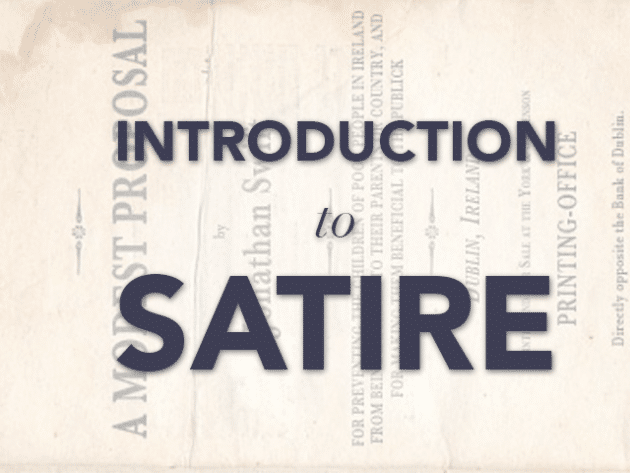
We were instructed to come into the class, sit at our desks, and read the paper on our desks without speaking to one another. This wasn't abnormal, as our teacher often conducted weird class experiments. There on our desks was a thick packet with the cover page facing up, “A Modest Proposal” by Jonathan Swift.
A Modest Proposal: The Perfect Example of Satire
For those of you who have not read this piece, you must . ( I found a free version online here. )
While the class read through it, heads turned and concerned eyes met from students around the room. I remember rolling my eyes at a friend muttering how crazy our teacher was. (I had no idea why we were reading this or what it meant.)
Swift's, “A Modest Proposal” outlines the solution for the famine in Ireland in the early 1700's. The solution proposed by Swift is that poor families should sell their newborn babies to rich families to eat. He explains how logical it would be for poor families to make money, have less children to feed, and for rich families to have a high quality protein source. Swift is as kind as to include different ways and suggested recipes for cooking these babies.
When we finished reading our teacher asked us what we thought of the piece. Students began commenting, “What is this?”, “Is this real?”, and then “Hey, doesn't sound like such a bad idea.”
Before we got too far into our heated debate, our teacher introduced that this was satire . We still smiled blankly, but he finally began to explain the concept.
The Definition of Satire
Here is the definition of satire according to Google:
The use of humor, irony, exaggeration, or ridicule to expose and criticize people's stupidity or vices, particularly in the context of contemporary politics and other topical issues.
In this case, Swift used satire as a way to express the issue of poverty in Ireland and to mock the rich's view towards the poor during the famine.
To be clear, Swift is not saying that eating children is a reasonable solution to the problem, rather he is demonstrating the heartless and cruel attitude of the rich, while pointing out the issues he sees with the Irish government.
Want to Write Satire?
Me too. Looks fun, and you get to make ridiculous arguments. Here are two techniques and tips to write great satire.
1. Use a Serious Tone
In “A Modest Proposal” Swift uses an intense, serious tone throughout the entire piece. One of the most important things about using tone is that we make sure we choose the correct tone to convey the message we so desire.
In satire, most commonly, the most effective tone to use is the serious tone. This is because the serious tone creates this confusion within the reader, just like my junior class was confused the first time we read satire. If the author was using joking language, we would understand that this wasn't real and lose interest, but because of the intense serious language, we couldn't stop talking about it.
Be definitive. Say crazy things. Give detail. Eat babies. (Just kidding, don't do that.)
2. Use Sustained Irony
Irony is saying one thing, while meaning the other, or in situations when the outcome is contrary to what is expected. “A Modest Proposal” is often hailed as one of the greatest examples of sustained irony in the English language. Swift accomplishes this by starting the piece highlighting the problem of starving families in Ireland, and then proposing his solution.
A young healthy child well nursed, is, at a year old, a most delicious nourishing and wholesome food, whether stewed, roasted, baked, or boiled; and I make no doubt that it will equally serve in a fricassee, or a ragout.”
How's that for irony?
Where You Can Read Satire
If you want to write satire, one of my biggest tips is that you read satire. Satire is a different way of thinking, and in order to understand it better and write it better, you must become acquainted with it's style, prose, and voice.
Check out a few of these satirical sites:
- World News Daily Report
Do you enjoy satire? Have you ever written it? Let us know in the comments section .
Take fifteen minutes and practice writing some satire! Choose a popular subject and make your point. Don't forget to use irony and tone! Make sure you share your practice in the comments below !
Kellie McGann
Kellie McGann is the founder of Write a Better Book . She partners with leaders to help tell their stories in book form.
On the weekends, she writes poetry and prose.
She contributes to The Write Practice every other Wednesday.

34 Comments
I enjoy satire, to read and to view in a play or show, as long as it is ‘satirical’ and not mean or cruel, but subtle and humorous.
I agree Lillian!
This is a challenge. I’m curious to read posts from members.
Great topic! Here’s how I began a “humorous” speech recently. I guess this is satire:
When my mother turned 92, she told me: “If I’m still alive in two years… shoot me.” When she turned 94 she said the same thing. And this time she meant it. “Honour Thy Parents,” they say. It’s the Fifth Commandment, but wait a minute!
I CAN’T SHOOT MY MOTHER. Or can I?
Logically, we should shoot everyone over 80. The evidence against longevity is overwhelming: 1) Old people wish they were dead, and, 2) Old people can’t afford longevity!
I’ve done the research on longevity, done my due diligence, and I’m wondering now if perhaps I should just…go ahead and shoot her.
(NOTE: Some people in the audience were totally freaked out. They’re still talking about it. They keep asking how my mother is.)
Ha! PJ that’s great!
This is good, P J Reece. I must confess, my husband and I have been talking about no 1) and 2) and old people. He looked at me and said, “What am I doing here?” What could I say except, “We don’t have a gun.”
This is great, PJ. Old people take up so much space, and it’s only logical to shoot them while they’re ahead.
Absolutely. The worst part of this mother business is that my mother is now 101 and has no intention of surrendering. She has transcended fate. It’s scary.
Now that is satire! Was Jonathan Swift your ancestor?
Mind you, it would have been apt to shoot my father – at a much longer age! Mind you, I wouldn’t have actually done it, no matter how much he merited an abbreviated life span, but to have written a satire on the topic would have been so comforting! But is this really the wrong approach for this writing exercise? Pity.
Wow, awesome topic. I come from Serbia and we LOVE satire irony and dark humor! And I love your point about writing in “serious” tone. That is the very thing that makes people think and scratch their heads in astonishment. “Wait a minute, this guy is not serious!” That moment of confusion and re-thinking is the precious gift for a reader. Thank you for this call, i will definitely try to write satire and let you know how it went.
Milena, I agree! It’s so fun to watch people scratch their heads 🙂 Can’t wait to read your satire!
Love this. Satire can also be an amazing tool for dealing with personal stuff, as I’ve found out over the past few months. It’s oddly refreshing.
It’s interesting to note that Swift tried to get his point across in more conventional essays but was largely ignored. It wasn’t until he wrote A Modest Proposal and used pamphlets to distribute it widely, that it received any notice. Sometimes satire is the most powerful tool.
Wow Jay, interesting! I did not know that. Satire can be the most influential it seems. Thanks for sharing!
The United States Air Force has a number of B-17 bombers that could be used to destroy any ISIS stronghold. Fill the bombers with garbage and drop the waste. If ISIS tries to shoot down the falling garbage, it becomes more garbage. We now solve the ISIS problem and eliminate the need for garbage landfills. The bombers fly at a very high altitude and are out of harms way.
Great job Frank! Thanks for sharing.
Great solution, bury them in garbage!
A Proposal of Modesty, spoken in the voice of Foghorn Leghorn
Let us propose to move all the Gays, Lesbo’s and Queer mutha-fuckas to Canada. Lots of room up there, mostly penguins, deers, and polar bears. Perhaps them polar bears can eat some of those queers and Lesbo’s and help take the penguins off the endangered species list. Ya know whut they say, “If it ain’t got antlers!” Damn son, I kill my self sometimes. Of course if we do this, we will have to find something for Pat Robertson, southern congress-folk — you know them representatives and senators — and nearly all of the Christian folk to blame things on. Well, not the Presbyterians. Of course there might be room in Canada to ship all the Presbyterians as well. Think we could include the Lutherans?
I’m neither gay nor Christian nor a penguin, but there’s something not quite right about this satire. I offer up this criticism, Gary, just to point how difficult it is to write good satire. I’d love to see you rewrite this.. but according to what principles of satire, I’m not sure. Anybody have some insight into this?
Mostly I believe if I have to explain things, I got it wrong. Having said that, I have made some changes, and I too would be interested in other insight.
What I see mainly in your piece, Gary, is the courage to throw something on the page, because it’s a potent starting point. Yes, where’s the insight we’re looking for? Help!
I don’t know how much U.S. news you are familiar with. There has been a huge flack over same sex marriages here with the fundamentalist and a couple blaming everything from global warming and the fall of the economy on homosexuality. It’s gotten ridiculous. Foghorn Leghorn would have been the spokesman. Anyway that was the intent.
Here is a short start to some satire I have had in mind for quite some time.
I realized something long ago. When I was young boy and my father was telling me how lucky I was that I had my whole life ahead of me. He told me about my schooling ahead and how much there was going to learn. He told me that I would see the world from north to south, west to east. He teared up as he told me about the life i had coming. “What I wouldn’t give to be your age again” he told me. It was then I realized: Life is too long.
I began smoking at once. Two birds one stone cigarettes are, You kill time now AND later. I stared into the light of my phone, flicking my thumb up, down, left and right. I counted stars. I actually counted how many breaths I took in an hour once.
I began to write a book in my late twenties called “mediations on passing time”
This is great, I would love to hear more! I think your irony is great!
I chose to use a very light, whimsical tone, almost a caricature, instead of a serious tone in my prose poem on “woman on woman combat” or competition among females.
A bowl of chili explodes in the microwave. Office girls, run and see, gather round. Who left it there? How rude. Quite uncivilized. Remove it at once. Ouch, it’s hot! My hand!
Let’s run your hand under water until the paramedic arrives. A creamy white hand holds a pink, blistered one under water. A voice, so deep and calm, I’m here to save you. Thank you, Creamy Hands, for holding the Blistered Hand until I got here. You must say that to all the girls. Not all girls have such smooth, creamy hands.
What about me? I’m the one who’s hurt, Blistered Hand pouts, glancing knowingly at the circle of hands waiting round the cauldron. So you are, Deep Voice says, turning toward Blistered Hand as Creamy Hands tucks her tail and retreats to her desk.
Threat! She’s an irredeemable flirt. Her hands are so creamy! She’ll steal our boyfriends. Creamy Hands cannot have both creamy hands and flirty lips. It’s too much! It’s overwhelming. We must stop her. She’ll take over the office! Blistered Hand heals all afternoon, secret texts sent and received by her bandaged hand. Creamy Hands checks her email one last time, just before five. Subject: Indian night delayed. 7pm instead of 6. Shimmy your ta-tas to my place for a night of exotic curries and sangria!
A creamy hand knocks on the door at one minute to seven, cumin-scented rice balls the only thing brighter than her skin. Stand and wait, but no one’s home. The glances, the texts sent from under the desks. Creamy Hands begins to cry, the coven gathering round the cauldron at the bar down the lane.
Tears in her eyes, she mounts her motorcycle, cumin balls in her purse, tail tucked once more to retreat home in shame. Crash! Vision blurred, in a ditch, the blood drips from her creamy leg. She surrenders to the dirt, alone and outcast, and begs the siren to leave her be.
Deep Voice arrives. Creamy Hands, I think you missed me. How did you end up in this ditch, m’lady? Deep Voice, is that you? I made these rice balls for girls’ night, and the girls ditched me. Only jealous girls do the ditching. If you’ll hold my strong hand with your creamy one, I’ll pull you out of this ditch. Shall we? We shall, Deep Voice. Where to, Creamy Hands? To the bar down the lane for sangria.
Shall I order for us, Creamy Hands? Say, isn’t that Blistered Hand there with the ladies from round the cauldron? Wait a minute. Did you bring me here to make them jealous, Creamy Hands? But only as an afterthought, Deep Voice. I do like you! Creamy Hands, I’ll not be flaunted like a piece of deep-voiced meat. Leave me be to nurse my beer at the bar.
Ladies, I miss you, and I still have the cumin-scented rice balls I made for you. Hesitant glances abound, sizing up creamy-handed, flirty-lips when one of the coven spots Deep Voice leaving. Who is that? A cougar! Blistered Hand points to grey hair. He’s leaving with a cougar! But she’s so old and wrinkly, Creamy Hands pouted. There, there, dear, have a sangria. Some women! So cheap and easy! Blank stares round the cauldron. Creamy Hands breaks the silence. Did you see what curly hair wore to work today?
This is really funny Traci! You did a great job!! Pretty true..
Thank you, Kellie! Sad, but true. I think a large dose of humour helps when we confront the dark parts of ourselves. Great article!
How silly! Very cute though.
This is a plan that I’m putting forward to maintain the balance in our modern culture of tolerance.
There have been numerous legal accounts of business owners being ridiculed, sued, and then forced to respect the acts of clientele that are not of their personal interest. This is my solution.
At every Gay event, there is a tent meeting for biblical revivals and soul winning. The tent meeting should be allowed to be as large and as loud as they want.
Christian clothing companies should be allowed to stretch fabric along routes of Gay parades, to advertise their products. This of course might block the view of the parade itself, but that is a right the companies should have.
All businesses, from Starbucks cafes, to Apple’s corporate lobby will have a table available for any bible believer the right to drink coffee and hand out biblical tracts. The tracts might condemn the behaviour of homosexuality, and not show any acceptance to Gay marriage, but these bible believers should have the right.
These are just a sample of the many suggestions that I am proposing to alleviate this burden on our society. To read the complete proposal please got to http://www.thebibleisthewordofgod.com
I am currently writing a modest proposal essay for school and i cant think of anything to write about please help me!!!
OK – I’ll bite. Here’s my practice piece:
Well, it looks like the Grammar Police will finally take some action. Last week they made a proposal to revoke the literary licenses of people who constantly use the the wrong “there” in there writing. There licenses would be torn up and there fingers would be taped together, or better yet, Crazy glued together. There serious about this and are confident that this one step will improve the quality of the stories that we read. I believe that this is a good first step, but in step to, they should go after those who use the wrong to, to! Next they could go after the people who write “Wah Lah!”, problem solved.
I’m reading these entries, and stressing out that I’m not going to be able to write satire. Then read Jay Warner’s from a year ago –
It’s interesting to note that Swift tried to get his point across in more conventional essays but was largely ignored. Okay, I can work with that. Give me time. Thank’s Jay, and thanks to Kellie. I’m really stretching out of my comfort zone!
I have published several satire blogs recently on http://www.satireandmore.com about the U.K. and U.S. elections, E.U. Regulations, Greek financial crisis and other odds and ends.
Submit a Comment Cancel reply
Your email address will not be published. Required fields are marked *
Submit Comment
Join over 450,000 readers who are saying YES to practice. You’ll also get a free copy of our eBook 14 Prompts :
Popular Resources
Best Resources for Writers Book Writing Tips & Guides Creativity & Inspiration Tips Writing Prompts Grammar & Vocab Resources Best Book Writing Software ProWritingAid Review Writing Teacher Resources Publisher Rocket Review Scrivener Review Gifts for Writers
Books By Our Writers

You've got it! Just us where to send your guide.
Enter your email to get our free 10-step guide to becoming a writer.
You've got it! Just us where to send your book.
Enter your first name and email to get our free book, 14 Prompts.
Want to Get Published?
Enter your email to get our free interactive checklist to writing and publishing a book.
Is MasterClass right for me?
Take this quiz to find out.
What Is Satire? How to Use Satire in Literature, Pop Culture, and Politics—Plus Tips on Using Satire in Writing
Written by MasterClass
Last updated: Aug 25, 2021 • 5 min read
Satire is so prevalent in pop culture that most of us are already very familiar with it, even if we don’t always realize it. Satire can be part of any work of culture, art or entertainment. It is an often-humorous way of poking fun at the powers that be. Sometimes, it is created with the goal to drive social change. Satire has a long history and it is as relevant today as it was in ancient Rome.

Essay Papers Writing Online
Learn the art of writing a hilarious and thought-provoking satire essay.

Have you ever wondered how some writers effortlessly infuse their essays with wit and humor, leaving readers in stitches? Satire essay writing is an art form that requires a unique set of skills to master. It’s about using irony, sarcasm, and clever wordplay to critique or mock a specific subject, from politics to social issues.
Embarking on the journey of satire essay writing may seem daunting at first, but fear not! With some guidance and practice, you can unlock your potential to create uproarious and thought-provoking pieces that will leave your readers laughing and pondering simultaneously.
A crucial element in crafting a successful satire essay is the ability to observe and understand the world around you with a critical eye. You’ll need to identify the absurdities, contradictions, and hypocrisies that exist in society. Any topic can be a potential target for satire, whether it’s the idiosyncrasies of everyday life or the flaws in governmental policies. The key is to choose a subject that you are well-informed about and passionate enough to dissect with cleverness and finesse.
Understanding the Concept of Satire
Satire is a literary technique that allows writers to use humor, irony, and sarcasm to criticize and mock certain aspects of society or individuals. It is a form of social commentary that exposes the flaws, vices, and absurdities of human behavior, institutions, or cultural norms. Through the use of exaggeration, parody, and wit, satire challenges the status quo, challenges conventional beliefs, and prompts the reader to think critically about the subject at hand.
At its core, satire serves as both entertainment and a powerful tool for social and political critique. It provides a means for writers to convey their opinions and criticisms in a more engaging and memorable way. Satire can take many forms, from written works such as essays, poems, and novels, to visual mediums like cartoons and films. Regardless of the medium, satire aims to provoke a reaction from its audience – to make them laugh, but also to make them question and reflect upon the issues being satirized.
| Characteristics of Satire |
|---|
| Irony |
| Humor |
| Sarcasm |
| Exaggeration |
| Parody |
| Wit |
Understanding satire requires a keen eye for irony, a sense of humor, and an appreciation for the power of words. It is a literary technique that has been used throughout history to expose the follies and shortcomings of society, from the comedies of ancient Greece to the political cartoons of today. By mastering the art of satire, writers can effectively convey their message, spark conversations, and perhaps even inspire change.
Choosing a Relevant and Timely Topic
One of the crucial aspects of writing a successful satire essay is selecting a topic that is both relevant and timely. In order to effectively engage readers with your satirical piece, it is important to choose a subject that is currently of interest or controversy in society. By selecting a topic that people can relate to and have strong opinions about, you can ensure that your satirical essay will have a greater impact.
When choosing a relevant and timely topic, it is important to consider current events, social issues, and cultural phenomena that are widely discussed or debated. This can include topics such as politics, technology, entertainment, or even everyday life experiences. By focusing on subjects that are familiar to your audience, you can grab their attention and make them more willing to engage with your satirical essay.
Furthermore, it is crucial to select a topic that has room for satirical commentary and criticism. Satire relies on exposing flaws, absurdities, or inconsistencies in society or individuals. Therefore, it is essential to choose a subject that allows for humor and exaggeration. This can be done by identifying aspects of the topic that are ripe for mocking or satirical critique.
Additionally, it is worth considering the potential audience for your satirical essay. Different topics may resonate differently with various groups of people. By understanding the interests and opinions of your intended audience, you can tailor your topic and satirical approach to better engage with them.
In conclusion, choosing a relevant and timely topic is a crucial step in writing a successful satire essay. By selecting a subject that is currently of interest or controversy, focusing on familiar and relatable topics, and identifying aspects that allow for satirical commentary, you can create a compelling and impactful satirical piece.
Developing a Strong Satirical Tone
Creating a compelling satirical tone is an essential aspect of writing a successful satire essay. A strong satirical tone allows the writer to effectively convey their message and humorously critique a particular subject or issue. It requires a combination of clever wordplay, sharp wit, and an understanding of the target audience.
To develop a strong satirical tone, it is crucial to select a topic or subject that lends itself well to satire. This can be a current event, a social issue, or any other topic that can be seen from a humorous and critical perspective. Once the topic is chosen, the writer can begin to brainstorm ideas and develop a unique angle or viewpoint to approach it.
Incorporating irony and sarcasm is also key to establishing a strong satirical tone. By using satirical devices such as exaggeration, mockery, and parody, the writer can highlight the absurdity or flaws of the subject in a humorous way. This can be done through clever word choices, exaggerated descriptions, or even through the use of fictional characters or scenarios.
Another crucial aspect of developing a strong satirical tone is maintaining a consistent and confident voice. The writer should establish their authority and expertise on the subject, even if they are presenting a satirical viewpoint. This can be achieved through the use of strong and assertive language, as well as through the inclusion of well-researched facts or statistics to back up the satirical claims.
Finally, it is important to consider the intended audience when developing a strong satirical tone. Satire is often used to challenge prevailing norms or beliefs, and the writer should tailor their tone and approach accordingly. By understanding the perspectives and sensibilities of the target audience, the writer can effectively use satire to engage and persuade readers.
In conclusion, developing a strong satirical tone requires careful consideration of the topic, clever use of satirical devices, a confident voice, and an understanding of the intended audience. By following these guidelines, writers can create impactful and humorous satire essays that effectively convey their message and entertain readers.
Utilizing Irony and Hyperbole for Effect

The art of satire lies in the effective use of various literary devices that can make the message more impactful and humorous. Two commonly used devices are irony and hyperbole. Irony involves saying or writing the opposite of what is meant, while hyperbole involves exaggerated statements or claims not meant to be taken literally. By utilizing irony and hyperbole, writers can create a satirical effect that engages readers and exposes the flaws and absurdities of a particular subject or issue.
Irony can be used in several ways to enhance the satire in an essay. One form of irony is verbal irony, where the writer says something but means the opposite. For example, in discussing a politician’s promise to bring about change, the writer may use verbal irony by stating, “We can surely expect a politician to keep all of their promises!” This statement is meant to highlight the common perception that politicians often make empty promises and fail to follow through.
Another form of irony is situational irony, where there is a contrast between what is expected to happen and what actually happens. This can be used to expose contradictions or highlight the absurdity of a situation. For instance, a writer discussing environmental conservation may employ situational irony by describing a company’s “green” initiative that actually leads to increased pollution or harm to the environment.
Hyperbole, on the other hand, involves exaggeration for emphasis or comedic effect. It allows the writer to make a point by magnifying certain aspects or characteristics. For example, when discussing the overuse of smartphones in modern society, a writer may use hyperbole by saying, “People are so attached to their phones, they might as well marry them!” This exaggerated statement serves to highlight the writer’s criticism of excessive reliance on technology.
By utilizing irony and hyperbole, writers can effectively convey their satirical message and engage readers in a humorous and thought-provoking manner. These devices add depth and richness to the writing, making it more entertaining while also shedding light on various social, political, or cultural issues. However, it is important for writers to use these devices judiciously and consciously, ensuring that the satire does not become too vague or offensive, but rather strikes a balance between amusement and critique.
Structuring Your Satire Essay
Organizing your satire essay is crucial to ensure that your ideas flow smoothly and your message is effectively conveyed. By establishing a solid structure, you can present your satirical arguments in a logical and persuasive manner.
One effective way to structure your satire essay is to use a three-part framework: introduction, body, and conclusion.
In the introduction, provide a brief overview of the topic or issue you’ll be satirizing. Grab the reader’s attention with a witty or thought-provoking opening line, setting the tone for your satirical piece.
In the body paragraphs, develop your main arguments using humor, irony, and sarcasm. Start each paragraph with a topic sentence that introduces the specific point you’ll be addressing. Use supporting evidence or examples to strengthen your arguments, while maintaining a satirical tone throughout.
Ensure that your satire is directed at the issue or topic, rather than attacking individuals or groups. Remember, the purpose of satire is to criticize society or draw attention to certain flaws, not to insult or belittle.
In the conclusion, summarize your main points and reiterate your satirical message. End on a strong and memorable note that leaves the reader thinking about the topic and the issues you’ve raised through your satire.
Additionally, consider using transitional words and phrases to enhance the flow between paragraphs and ideas. Connect your ideas smoothly, allowing the reader to follow your train of thought easily.
Lastly, proofread and revise your essay to ensure it’s coherent, cohesive, and free of grammatical and spelling errors. Make sure your satire is clear and effectively conveys your intended message.
- Introduction: Provide a brief overview and grab the reader’s attention.
- Body: Develop your main arguments with humor, irony, and sarcasm. Use supporting evidence and examples, and avoid personal attacks.
- Conclusion: Summarize your main points and reiterate your satirical message. End on a strong note.
- Transitions: Use transitional words and phrases to enhance the flow of ideas.
- Proofread and Revise: Ensure that your satire is clear, coherent, and free of errors.
Revising and Editing for Maximum Impact

Refining and polishing your satire essay is crucial for ensuring maximum impact. By revising and editing your work, you can elevate your writing to its full potential and effectively convey your message with humor and wit.
When revising your satire essay, start by reviewing the overall structure and flow of your piece. Consider the logical progression of your ideas and ensure that each paragraph and sentence contributes to the overall humor and satire. You may need to rearrange or rephrase certain sections to improve the overall coherence of your essay.
During the revision process, pay close attention to your use of language and word choice. Satire relies heavily on the use of irony, sarcasm, and exaggeration to convey its message. Make sure that your language is sharp, witty, and engaging. Look for opportunities to add clever wordplay or double entendres to enhance the comedic effect of your writing.
After revising your essay, it’s time to move on to the editing phase. This involves carefully proofreading your work for grammar, spelling, and punctuation errors. Satire relies on precise language and impeccable execution, so it’s important to ensure that your writing is error-free.
In addition to proofreading, consider seeking feedback from others. Share your satire essay with trusted friends or colleagues and ask for their honest opinions. They may be able to provide valuable insights and suggestions for improvement.
Finally, don’t be afraid to experiment and take risks with your satire essay. Satire is meant to challenge conventional thinking and provoke thought, so don’t shy away from pushing boundaries. Be bold and innovative in your writing to truly captivate your audience and maximize the impact of your essay.
By actively revising and editing your satire essay for maximum impact, you can create a piece of writing that not only entertains but also sparks meaningful conversation and reflection. Your polished and perfected work will leave a lasting impression on your readers and make a lasting impact in the world of satire.
Publishing and Sharing Your Satire Essay
If you’ve managed to weave together a clever and humorous satire essay, the next step is to get it out into the world. As with any form of writing, publishing and sharing your work can be just as important as the writing process itself. In this section, we’ll explore some practical tips for getting your satire essay published and shared with a wider audience.
| First and foremost, it’s essential to find the right publication that aligns with your satire essay’s style and audience. Research and explore various literary magazines, online platforms, and websites that specialize in humor and satire. Look for publications that have a reputation for publishing satirical pieces and have a readership that appreciates this form of writing. |
| Once you’ve identified potential publications, it’s crucial to carefully read and follow their submission guidelines. Adhering to these guidelines is a sign of professionalism and increases your chances of getting your satire essay considered for publication. Pay attention to formatting requirements, word limits, and any specific instructions provided by the publication. |
| Before submitting your satire essay, take the time to edit and polish your work. Proofread for grammar, spelling, and punctuation errors. Ensure that the humor and satire are effectively conveyed. Consider seeking feedback from trusted peers or mentors to get valuable insights and suggestions for improvement. |
| If traditional publishing routes don’t work out, consider exploring self-publishing options. With the advent of digital platforms and e-books, self-publishing has become more accessible than ever. You can publish your satire essay as an e-book or on self-publishing platforms that cater to humor and satire genres. |
| Once your satire essay is published, it’s time to share it with the world. Leverage social media platforms like Twitter, Facebook, and Instagram to promote your work. Join online communities and forums where humor and satire enthusiasts gather, and share your essay with like-minded individuals. Engage with your audience and encourage them to spread the word. |
| Networking plays a crucial role in the world of writing. Connect with other writers, comedians, and satirists who share similar interests. Attend literary events, workshops, and conferences to meet industry professionals and potential collaborators. Collaborating with others can help you gain exposure and expand your reach. |
Remember, publishing and sharing your satire essay is an opportunity to showcase your wit and creativity. Embrace the process, be persistent, and continue honing your skills as a satirist. With the right approach and a touch of luck, your satire essay can find its way into the hands of those who appreciate a good laugh.
Related Post
How to master the art of writing expository essays and captivate your audience, convenient and reliable source to purchase college essays online, step-by-step guide to crafting a powerful literary analysis essay, unlock success with a comprehensive business research paper example guide, unlock your writing potential with writers college – transform your passion into profession, “unlocking the secrets of academic success – navigating the world of research papers in college”, master the art of sociological expression – elevate your writing skills in sociology.
- Link to facebook
- Link to linkedin
- Link to twitter
- Link to youtube
- Writing Tips
How to Use Satire in Your Writing

5-minute read
- 27th December 2022
Satire is a popular genre that most readers are familiar with, but it can be difficult to use effectively.
That’s why we’ve put together this guide to using satire in your writing , complete with an explanation of the concept and our top tips for making satire work for you.
What is Satire?
Satire is the concept of humorously criticizing an aspect of everyday life in order to promote change or discussion.
It is a literary genre and device originating in ancient Rome. Today, satire is widely used in literature, art, and pop culture as a form of social commentary . Typically, the best satire uses sarcasm, irony, exaggeration, and humor to make its point.
Some famous examples of satire include:
● Jonathan Swift’s “ A Modest Proposal ,” an essay that satirically suggests that the poor should sell their children to the rich as food.
● Stanley Kubrick’s 1964 film Dr. Strangelove , which satirizes the politics of the Cold War.
● Saturday Night Live , a TV comedy series that parodies various political and celebrity figures.
Despite being a common literary device, satire is very easy to get wrong.
With that in mind, here are our five tips for writing satire:
- Know where you stand on the issue.
- Mimic other writing styles.
- Make use of irony and sarcasm.
- Push things to the extreme.
- Don’t forget the humor.
Ready to learn more about writing satire? Read on below!
1. Know Where You Stand on the Issue
Most satire is directed towards a particular target. The topic of a piece of satire can be just about anything, including:
● Political figures
● Celebrities
● Current events
● Controversies
● Modern life and society
To write satire well, though, you need to do more than just pick an individual or issue that’s popular at the moment.
Your subject should be something that you have a particular opinion on or have strong feelings about.
Before you start writing, identify your stance on the topic. This will give your satire direction and help you create an overall point or message beyond simply making fun of the topic at hand.
2. Parody Other Writing Styles
Many works of satire mimic popular writing styles. This type of imitation is known as parody, which is often exempt from certain copyright laws .
Jonathan Swift’s novel Gulliver’s Travels , for example, is a satirical take on travel writing. Satirical websites such as The Onion and Reductress mimic different styles of online journalism.
Find this useful?
Subscribe to our newsletter and get writing tips from our editors straight to your inbox.
Your writing style will likely depend on the topic of your work. If you were writing a piece of satire about modern consumerism, for example, it may make sense to present as an advertisement:
You could even satirize ideas about writing itself, perhaps by writing a deliberately bad poem .
Before you decide to parody a certain style, though, make sure you are familiar with that style’s conventions and tone . This will help make your satire convincing and allow your readers to identify the type of writing that you are parodying.
3. Make Use of Irony
Satire relies heavily on a literary device known as irony.
There are several different types of irony , which usually involve saying the opposite of what is actually meant.
You can use irony in your writing by:
● Making note of any contrasts in your subject (for example, the differences between a person’s words and actions.)
● Highlighting a subject’s negative qualities by presenting them as something positive:
● Subverting your reader’s expectations of what they are familiar with.
4. Push Things to the Extreme
Part of what makes satire effective is the use of hyperbole , or the act of exaggerating something for dramatic effect.
By starting out with a real-world thought, argument, or action and then taking it to a ridiculous extreme, you can draw attention to its flaws.
To use hyperbole in your writing, start by listing the defining qualities of your subject, its biggest flaws, or the things that stand out most to you.
Then, think about how you can exaggerate those qualities in a way that illustrates the point you are trying to make.
Make sure to choose only one or two things to exaggerate or highlight; too many, and your satire will lose focus.
5. Don’t Forget the Humor
It might sound obvious, but satire isn’t satire without humor.
When writing on a subject you’re passionate about, it’s easy to let feelings like anger take over.
But while the point of satire is to criticize a subject in order to promote change, it should do so by making that subject humorous. Failing to do so can result in your writing becoming overly negative, cruel, or difficult to read.
Make sure you strike the correct balance between critique and humor.
If you’re not sure you’ve achieved the right tone, ask a friend, coworker, or professional editor to review your work for you.
Here at Proofed, our proofreading team can make sure your satire reads as it should. Submit a trial document and get your first 500 words proofread for free.
Share this article:
Post A New Comment
Got content that needs a quick turnaround? Let us polish your work. Explore our editorial business services.
Free email newsletter template.
Promoting a brand means sharing valuable insights to connect more deeply with your audience, and...
6-minute read
How to Write a Nonprofit Grant Proposal
If you’re seeking funding to support your charitable endeavors as a nonprofit organization, you’ll need...
9-minute read
How to Use Infographics to Boost Your Presentation
Is your content getting noticed? Capturing and maintaining an audience’s attention is a challenge when...
8-minute read
Why Interactive PDFs Are Better for Engagement
Are you looking to enhance engagement and captivate your audience through your professional documents? Interactive...
7-minute read
Seven Key Strategies for Voice Search Optimization
Voice search optimization is rapidly shaping the digital landscape, requiring content professionals to adapt their...
4-minute read
Five Creative Ways to Showcase Your Digital Portfolio
Are you a creative freelancer looking to make a lasting impression on potential clients or...

Make sure your writing is the best it can be with our expert English proofreading and editing.
- Literary Terms
- When & How to Write Satire
- Definition & Examples
How to Write Satire
Because satire is such a diverse category, there’s no simple end-to-end guide to writing it. But the first step is always to come up with an idea or target. In order to make people think critically about a subject, you have to have something to write about first. Maybe there’s something going on in contemporary politics that you find absurd, or maybe it’s the way people talk about politics that you want to make fun of. Or, it might be something on a smaller level – something about the “politics” of your school, team, or family might be worth satirizing.
As in all other forms of writing, it’s important to remember that you don’t need to have everything worked out in advance. If you’re curious about something, or bothered by it, and you feel compelled to say something, then do so. Always remember that you’ll learn as you write, and the process of writing your satire may help you see more clearly what it is that you want to write about. Through a gradual process of writing and revising, you’ll keep noticing new ideas about your target, and eventually you may be able to craft a satire that makes people laugh and, at the same time, changes the way they think.
When to use Satire
Be careful using satire in school assignments! Most teachers and professors are accustomed to seeing straightforward essays , and they may not notice (or appreciate) your attempt at satire. Some teachers, however, feel exactly the opposite way. Be careful, and if you’re not sure, you can always ask. In creative writing, something similar applies – if you’re using satire in a school project, it’s best to be sure the teacher is OK with it.
Outside of school, however, satire can be an excellent way to make a point about any social issue – no matter how big or small.
List of Terms
- Alliteration
- Amplification
- Anachronism
- Anthropomorphism
- Antonomasia
- APA Citation
- Aposiopesis
- Autobiography
- Bildungsroman
- Characterization
- Circumlocution
- Cliffhanger
- Comic Relief
- Connotation
- Deus ex machina
- Deuteragonist
- Doppelganger
- Double Entendre
- Dramatic irony
- Equivocation
- Extended Metaphor
- Figures of Speech
- Flash-forward
- Foreshadowing
- Intertextuality
- Juxtaposition
- Literary Device
- Malapropism
- Onomatopoeia
- Parallelism
- Pathetic Fallacy
- Personification
- Point of View
- Polysyndeton
- Protagonist
- Red Herring
- Rhetorical Device
- Rhetorical Question
- Science Fiction
- Self-Fulfilling Prophecy
- Synesthesia
- Turning Point
- Understatement
- Urban Legend
- Verisimilitude
- Essay Guide
- Cite This Website
- How it works
- Top Writers
- TOP Writers
How To Write A Satire Essay
This article will guide you on how to write a satire essay in detail and will explain what a satire essay is as well as show you some examples. The text uses satire to make you understand its main objective. Assignments on this topic are known to be the most challenging for most students. In these kinds of essays, students need to show their expertise in content and subject area. Similarly, they should use humor to point absurdities found in our real-life situations . Although satire essays are full of humor, there are those without or minimal instances of humor. Most of them are expressed in a serious tone which shows that readers should take them seriously.

There are advantages of writing these kinds of essays more so to those individuals wishing to master the art of writing. Once you have learned how to infuse irony, humor, and hyperbole, you will discover them not only being fun but also easy to write.
- Learning your Task
It’s crucial for you to understand every aspect of your writing assignment. You should be in a position to point out the following:
If your homework intends to satirize a given cultural topic
- The length of the essay
Our formatting guide will help you select the right format to use while writing your assignment. You might be in a dilemma not knowing whether to write your paper in first, second or third person point of view. For those who have never read satire essays before, you should consider reading the work of Jonathan Swift’s A Modest Proposal who is well known for these types of pieces. If you are wondering where to find them, then consider the site “The Onion” which usually deals with the topics in politics.
While writing your assignment, incorporating satire enables you to write the essay in a first person’s point of view. This makes you point out issues in the society especially those concerning society and culture. Using an example where this article points women’s demeaning which is being explained by Trump’s Hollywood tapes leaked information (“Satire Essay,” 2019). Meme proposing that female gender should not oppose what amen say suggest that they are annoyed by his utterances. This is clearly shown through the work of E.L. James’s Fifty Shades of Gray showing a romantic relationship between female and male where the male is in total control and the woman is expected to submit to him.
Topics of Satire Essay
When writing a satire essay on any topics, it’s good to point out the significant events of culture and politics. The most common ideas you should consider while writing:
- Border Walls
- Hillary Clinton
- Donald Trump
- Barack Obama
- Immigration reform
A list of satirical topics is endless and if you are unsure of what to select contact our support team who are ready to help you any time.
Brainstorming of Any Satirical Essay
Any good essay writing process begins with brainstorming. Brainstorming is a useful tool for all essay writers that plays a significant role even in writing a satirical essay (“Satire Essay,” 2019). While there are familiar writing outlines employed in the initial stages of planning, there are other methods that work perfectly well when it comes to satire writing tasks. One of the tools that are commonly used and we like most is the use of a bubble map. A bubble map is a simple tool that would be used starting from elementary schools onwards. The tool associates words in line with your topic of interest. For instance, if you decide to write a bubble map for any prominent figure in the society say, Donald Trump, you will diversify and use words like businessman, father, married, adulterer, divorced, New York City, orange, billionaire, bombastic, real estate, and home alone.
You can see from the above bubble map how those words bring out elements that are associated with Donald Trump. When it comes to descriptive essays on a dog, there would be some words in the middle like the name of that given dog (“Satire Essay,” 2019). When using the bubble map, you should be aware that the words you choose should not be your own words you decide to use while writing your essay. The words used should aid in exposing an issue and further directs on the ways of approaching it satirically.
Thesis Statements in Satire Essays
After deciding on the right topic, you should then come up with a good thesis statement for your essay. You may be wondering what a thesis statement is. Thesis Statement is merely a road map of your piece that is always one or two sentences. It helps your readers understand the primary objective of your essay. Regardless of your essay type, the structure of your thesis statement always remains the same except in satire essay where it differs slightly. In satire essays, it is different unlike situations when one is proposing a real idea.
Below are some examples of Thesis Statements:
To ensure the safety of your jewelry, you need to be conspicuous on it, ensure valuable jewelry is stored in a vault or deposit box that is safe, also, do not travel with excessive jewelry than (Author: Kim Kardashian-West)
Having a successful marriage is extremely simple: you have to identify your second wife while married to your first wife and have more children with her before you get married. (Author: Brad Pitt)
From the above examples, it is clear that the most satirical element in the essay is the individual writing it. Also, the target audience can be part of the satire. When Jimmy Carter wrote to Trump a letter informing him not to worry of offending women is satirical in a way since both Jimmy and Trump are respected figures in the United States of America. The case of Bill Clinton is writing a letter to Barrack Obama to guide him on how to be a good husband while in the White House is Irony in itself. This is because Obama is well known for his excellence in family matters and he is perceived to be an excellent husband too. On the other hand, Bill had a lousy legacy as he had an affair outside marriage while in office. Finally, criticisms of Maddona of Lady Gaga of publicity or even Peter Rose Criticizing Tom utilize all aspects of double-satire.
Resources for Satirical Essays
A wide range of satirical essays is based on events happening in the current century. Though citing them directly may not be compulsory at the moment, it is essential for you to know the real facts and issues that are associated with a given situation (“Satire Essay,” 2019). It is even ironical for you to identify the satiric news sites. In this modern time, this would be much more difficult to notice concerning political context. To avoid all these troubles, you need to be careful while selecting your topic and ensure your sources are unbiased and academically reliable.
It can be difficult finding a reliable source for your essay. To be sure you have the right sources, use the sources that are not more than three years old and from reputable publishers like newspapers, magazines, and .com and .org websites. However, you are free to use sources for more than three years old, but you should inform your readers of any change of information in the concerned period.
Additionally, you might have been discouraged to use sources like Wikipedia, Britannica, and Encyclopedia while doing your writing assignments. The advice is good as these sources are not regarded as reliable sources in the scholarly world. However, do not allow the ban to prevent you from using the references (“Satire Essay,” 2019). They can give an excellent overview of your topic and give you resources you can research for further information. Google scholar is another great search engine that gives you an opportunity to limit the kind of resources you want to look at. With the above search engine, you can find either academic or scholarly articles and would support you in finding the best academic and scholarly writing.
Other generic sites like CNN, Fox News, and MSNBC are also good sources of information while writing satire essays. Also, you can make use of other local and major networks as they are good sources of news. The above news channels have programs that are not sources but are both social and political commentary. While using these shows, you need to be careful as they sometimes present information to the readers in a biased way or give unreliable information. As you write be aware of possible biased information especially when selecting your sources.
Citing your Sources
If you decide to incorporate all your resources in your satirical essay, you will have to cite all academic sources to back-up any claim you make on certain political styles. If your essay is based on actual dates, rare facts, and figures, you need to cite all your sources. In such cases, you will be directed on the formats to use, or you will have to decide on your own . The most commonly used academic citation styles for undergraduate students are the American Psychology Association (APA), modern language association (MLA), and Turabian or Chicago. Unless in your assignment there are clear instructions on the type of format to use, go for the writing style you understand best.
Examples of Satire Essays
As a student, it’s easy for you to digest a concept if you are given an example. Thus, our model will not only help you understand how you can write an amazing satirical essay but will also help you master how you can format your essays correctly. On our site, you will get an excellent satirical essay. Just fill in the order form.
We hope that after reading our article on satire and using our provided examples, you will be more confident than before to confront any satire essay throughout your academic journey. Even after reading our article and examples you might still encounter challenges right from topic selection to completing your essay . Remember Tutoriage writing service is here for you. We have a complete team of tutors ready to help you in any challenge you encounter in your writing process from topic selection to writing a flawless piece. To get more insight, go to our website.

- Essay Guides
- Other Essays
How to Write a Satire Essay: My Personal Experience+Example
- Speech Topics
- Basics of Essay Writing
- Essay Topics
- Main Academic Essays
- Research Paper Topics
- Basics of Research Paper Writing
- Miscellaneous
- Chicago/ Turabian
- Data & Statistics
- Methodology
- Admission Writing Tips
- Admission Advice
- Other Guides
- Student Life
- Studying Tips
- Understanding Plagiarism
- Academic Writing Tips
- Basics of Dissertation & Thesis Writing
- Research Paper Guides
- Formatting Guides
- Basics of Research Process
- Admission Guides
- Dissertation & Thesis Guides

Table of contents
Use our free Readability checker
There is no such a student who has never been assigned to write a college satire essay when getting education. I am not an exception! Despite the fact that I have never had serious problems with academic writing before and I have a great sense of humor, I must admit that the satirical essay turned out not as easy as ABC. It wasn't much fun-I had to pull an all-nighter to choose a favorite topic on some social issues that would be interesting to most people in America; search for the relevant information everywhere, including media; find good examples, and finally write my work according to a certain structure. To tell the truth, the thought to order the ready satire essay from professional writers has crossed my mind because this kind of task seemed to be the most difficult one in my life. I had neither time nor the knowledge about its distinctive features. However, I decided not to email custom writers and take this challenge on my own as I didn't get used to giving up. Now, I am here sharing my personal satire writing experience with everyone who is just going to deal with this kind of the written task.
A Complete Guide on How to Write a Satire Essay
Before I got started with my essay, I have checked a large number of funny satire essay examples belonging to different categories. While reading, it seemed to me that I would cope with this assignment easily. However, I was mistaken. In general, essay structure looked like the one other essays have but at the same time, I understood that this kind of paper has its own distinctive features and peculiarities. I had to check a lot of guides on how to write a satire essay before I got started with mine. All of them said that it's very important to find interesting controversial satire essy topics about some political, cultural, social issues. Usually knowing language on a good level is very helpful so it is better to attend English Courses if you don't have enough knowledge. Due to the fact that I didn't know much about the two last spheres, I decided to write about the famous Donald Trump. You will be able to check my piece of writing later. Before you look at the satire paper itself, you should have a clear picture of how your paper must look like in terms of structural elements. I would like to share my personal experience in structuring the satire paper in accordance with the required instructions given by my school teacher. Now, I am going to tell you how to write a satire essay the right way.
- An Introduction I think that all of you know that the first steps you should take are to think of a killer title, which I had to change for several times after having finished and to write an introduction. I've understood that if you want to attract the reader's attention, you need to start either with the intriguing question that your reader would like to answer, or some figures.
For example, if you are going to craft an essay about the well-known politician, - find some interesting facts about his/her life and career, start your work with some shocking information. Don't forget to include a powerful thesis statement at the end of your introduction. Write just 1-2 sentences keeping in mind that they must be informative and strong, expressing the main idea, and explaining to the reader what you are going to discuss in your work. I had to rewrite my introduction 3 or 5 times until I made it perfect. Every time when rereading I tried to imagine that I was a reader. This trick will help you to understand how the paper beginning sounds, whether it is able to hook or not.
- The Main Body The process of writing the main body took me much time - a day or two if to be exact. This is due to the fact that this is a part where you are expected to provide all information on the chosen subject.
First, I had to find all the relevant materials and select those which could add some value to my paper. I used a lot of different information sources, including the Internet, published and electronic books online, magazine articles, blog posts, and a lot of various publications. I have checked every place where I could find something about Trump. I chose interesting pieces of information, gathered them like a puzzle, made sure that the main part of my essay was creative, original, and logical. Remember that it is better to stick to the 5-6 paragraph structure, which means that the main body will take the major part of your work-3-4 paragraphs. Use thematic essay examples while writing your task. The exact volume will depend on the number of facts you are going to use in your paper. The most difficult thing is to present the facts so that the reader feels where exactly you have used exaggerations, hyperbole, and another language device to poke fun.
- The Conclusion As any other kind of academic paper, a satire essay should end with the brief conclusion. I wrote a short summary of all the ideas that I have included in the main body, and then added a couple of sentences explaining the reader my point of view and the reasons why I consider my work valuable for the today's generation. Can't come up with a thought-provoking conclusion? Rely on StudyCrumb's essay conclusion generator and get a nice ending made in seconds.
Check Good Satire Essay Examples Before You Get Started
Have you wanted to see my satire essay? Here, you are! Have a closer look at the piece of writing I have submitted and got an A-grade!
The eccentric billionaire has become a symbol of anti-establishment sentiments that have swept the United States in the recent years. Having crushed the orderly number of forecasts of numerous experts, and the results of opinion polls, a candidate from the Republican Party Donald Trump won the presidential elections in the United States. The man who promised to "drain the Washington swamp" won. But will the hopes of his supporters be justified, when Trump as the 45th president of America will take decisions in the White House? While the United States was counting votes in the presidential election, and the scales were becoming more confident in favor of Donald Trump, the website of the state migration service in neighboring Canada was working intermittently. These disruptions seem to have arisen from the fact that many Americans have decided to examine the conditions of moving to the land of the maple leaf. The number of requests in Google about how to move to Canada, also sharply increased. According to one of the pre-election polls, 28% of Americans considered the option of leaving for Canada in the event of Trump's victory. They said that the US residents had a threat to go to Canadians - this is almost traditional national fun for the presidential elections. But it is unlikely that this "fun" was so serious before. Several American celebrities - from B. Streisand and Cher to Samuel L. Jackson and Whoopi Goldberg – threatened that if Trump would become their President, they would "choose freedom": go to Spain, to South Africa, or to Jupiter. In the information battles of the pre-election race against Donald Trump heavy artillery was used. The main caliber was hit in two directions. First: Trump is a misogynist and a womanizer. Second: Trump is a puppet of the Kremlin. Donald Trump himself played along with his critics on the "Russian" direction saying "I think I will get along well with Vladimir Putin. I just think so”. Trump shared his thoughts when he announced his intention to become a president. A few months later, he said that if he would be elected, it is unlikely that there will be problems in relations with Russia. Trump gratefully accepted the praise addressed to him by Putin: "It's always an honor to be praised by a man so respected in his own country and abroad. I always believed that together, Russia and the United States could defeat terrorism and restore peace. We could also trade with each other, not to mention other benefits." The businessman and showman, producer and politician are 4 in 1 and all these personalities are in one "great and terrible person" Trump. The showman, perhaps, is the key word in this series. Donald for many years was an active organizer of the Miss USA competitions. His cameo can be seen in several movies and television series. Trump entered the history of the American show business as the host and co-producer of the reality show The Apprentice on the NBC channel. So, after the Hollywood actor Ronald Reagan, a TV star appeared in the White House. Trump is a one hundred percent challenge to the system, which it must respond to in order to get out of the current state, where Trump appeared.
Want a similar satire paper? Contact StudyCrumb and get professional writing help from experts.
Top-20 A-Grade Satire Essay Topics for You to Choose From
- The smartest human of all the times.
- Childish labor helps businesses to flourish.
- D. Trump is the most famous President who is free in his self-expression.
- H. Clinton always takes right decisions.
- Trump and Putin have “friendly” relationships.
- Are the US citizens happy with the President selection?
- Comment on cultural differences and their influence on relationships between students.
- Media: the best invention or the worst thing ever?
- Today, people learn about their lives from the morning newspapers.
- All harmful things have a great taste.
- The best president in the US history.
- Doing nothing is fashionable today.
- A robot works better than real people.
- Politicians and comedians have much in common.
- Money values in the modern society.
- Fast food – fast weight.
- Satire in English literature.
- A family business is the worst thing that may happen to the family members.
- Living alone is much better than with anyone else.
- Boring teacher-bored students.
Choose one of the above-mentioned satire essay topics, follow the tips for writing a satire essay, and I guarantee that you’ll get a high score! Never give up and treat the satire essay assignment as a fun thing to do demonstrating your unique sense of humor! Good luck!

Daniel Howard is an Essay Writing guru. He helps students create essays that will strike a chord with the readers.
You may also like


5 Ways to Write a Satire Essay
Satire essay generator.

Not all essays are meant to be sound serious and forbidding. At times, essays can be quite fun to read. Satire essay is one best example of a highly entertaining essay. Certain websites such as The Onion, The Satirist, or The Private Eye are widely known for their satirical essays. But first let us determine what is satire and what is a satire essay.
- Satire in Literature
- Literary Essay Writing Example
What is Satire and Satirical Essay?
Merriam-Webster defines satire as a literary work that uses wit, irony, or sarcasm to expose and ridicule human vices or foolishness. Satire is most prevalent in literary works like books, poems, essays, songs, and even in films. Using satire in a literary piece is one way of showing one’s humor creatively.
It is also one way of putting a subtle constructive criticism to the shortcomings of a certain topic that an author is discussing (may it be related to politics, social change, celebrities, etc). Satirical essays are meant to write factual information about a certain topic but twists it to make it appear comical. Your readers will be more engrossed in reading satire essay since not only they will be entertained they will also gain more knowledge about a certain topic. Examples of satire present in literature include:
- Jonathan Swift’s essay called “A Modest Proposal” talks about the societal and political issue in Ireland. The Irish are suffering from famine and the government is unable to solve this problem. Swift then cheekily suggested that in order to resolve the famine, a new form of human breeding is the solution for the economic recovery in Ireland. When deliberating his essay, Swift’s suggestion may seem horrendous but his point is to sarcastically suggest an impossible suggestion to make fun of the shortcoming of the Ireland’s government.
- The Rape of Lock by Alexander Pope satirized the upper middle class of the 18th century England. Most people who belonged in this class were vain and narcissistic. Most young men and women were fashionable, self-absorbed, and superficial.
- “Whether the nymph shall break Diana’s law, o r some frail china jar receive a flaw, o r stain her honor, or her new brocade…”. An excerpt from Pope’s poem describes a young woman called Belinda who lost a lock of her hair seemed to her that she lost a valuable virtue of their class in this particular era. The lost lock of hair is almost similar like a precious frail china jar that cracked.

Other Forms of Satire
Satirizing politicians, celebrities, or other prominent people are most commonly spoofed in the media. Parodies are used to make fun of these people by exaggerating their chosen subject’s behavior or characteristics. Some even impersonate these people and exaggerate their looks. Parodies are prevalent in films, television, and music.
One example is the parody band called the Rutles. Established in the late 70’s, this band satirizes the Beatles and their avid supporters. They dressed up like the Beatles and poked fun of their songs by making a similar songs by the Beatles.
One example is the song “Get Up and Go” by the Rutles which is a parody from the song “Get Back” by the Beatles. Here is an excerpt of “Get Up and Go”:
Cruising down the highway doing sixty-five in the middle of the double white line His foot down on the gas and his head in the clouds He didn’t see the one-way sign Get up and go Get up and go Get up and go back home
Sarcasm is of course prevalent in satire. It is what makes satire engaging and entertaining. Sarcasm as defined in Cambridge dictionary is making remarks that means the opposite of what the person is supposed to say in order to criticize something or someone in a humorous way. Some examples of sarcastic quotes are:
“We are all both ignorant, but one must work hard to remain stupid.” Benjamin Franklin
“Never argue with stupid people. They will drag you down to their level and then beat you with experience.” Mark Twain
“All men are the same. They have different faces so that women differentiate them.” Marilyn Monroe
But what makes satire important?
Basically, satire exists to point out the shortcomings in the society or within ourselves and to inspire change from these flaws. Through satire writing, readers will be aware of the changes they need to do in order to make a better version of themselves or in the society.
Now comes the part on how to write a satire essay efficiently.
How to Write a Satire Essay?
1. familiarize first how to write a satire essay.
When writing a satire essay, it is important to know that you have a strong motive to address your own views and opinion over a specific issue to you care about. Even if it is opinionated in its form, you can put your own perspective of this certain issue and spin it to make it funny, don’t forget to always provide the factual information of the topic you are writing about.
2. Choose the right topic to write

In choosing a topic to write, it’s best to know what topic are you want to write about. It must be something that you are highly interested in. Otherwise, if you choose a topic you are not really into it or not familiar to, you get bored in writing halfway to it. Other key points to consider is to choose a topic or an issue that is relevant to society and is relatable to everyone.
The best examples of topics to choose from are:
- current events
- health or environmental issues
- celebrities
- human vices
- holiday celebrations
- social media
It is also helpful to familiarize yourself with these topics by watching or reading the news. These kinds of topics are what people mostly have their own stand, so it’s best to choose it as you will get reactions from your readers. Don’t forget the point of writing essays is for the readers to read it. Getting reactions, whether favorable or not, means you have successfully done your job.
3. Get to the point

Finally, after poring and musing and deciding the topic you want to discuss, it’s time to figure out, what is the point of this essay I am writing about? The things you want to consider are: What is your stand in this certain topic? Do you rule favor or not?, How can you make this topic ironic? Once you have figured out your point, you have a clear and strong idea on what will you write about.
4. Know your audience

It’s crucial for you as a writer to know who is the audience you are writing to. Are you writing for the professional readers? Or the students? These different groups of people have their own preference or style of writing. The professionals might want a formal style of writing or the students might want a casual style. The point is, by identifying your readers, it’s better to be more relatable towards them. To help you adjust your style of writing to your specific audience, here are the questions you need to answer: How do you write in casual or formal style of writing? How do you write this essay if you are writing for young people?
5. Now it’s time to write

Now you already have a gist on writing a satire essay. You already know what topic you will discuss and what will be your main point, and you already identified who will be your audience. Now it’s time to write down your outstanding essay. Of course, in order for it to be outstanding, you need some tips in order to make your essay interesting to read. Familiarize yourself with the figures of speech to use when writing a satire essay to make it more engaging to your readers. Examples of figures of speech you can use are:
Hyperbole: The use of exaggerated words for heightened effect on the reader.
My high heeled shoes are killing me!
Irony: It is the use of words used to convey the opposite of its literal meaning.
A person looking out at his window while it was raining hard. He exclaims, “ What a beautiful weather we are having today.”
Metaphor: A figure of speech that implied a comparison between two dissimilar things that have something in common.
You have a heart of stone.
Pun: Is described as ‘a play on words’. It’s structure can be on different senses of the same word or sometimes on the similar sense or sound of different words.
“Now is the winter or our discontent Made glorious summer by this sun of York…” an excerpt from William Shakespeare Richard III (Act 1 scene 1). The context of this statement by the character Richard III is that he was the son of the Duke of York.
Understatement: This type of figure of speech is when a speaker intentionally makes a situation or a person less important that it is.
“It was rather a serious evening, you know.” Shipwreck survivor Sir Cosmo Duff Gordon, as he described the sinking of the Titanic.
You may also look up some hyperbole examples , and irony examples to familiarize yourself to these figures of speech.
Now that you have mastered on writing a satire essay, don’t forget to have some fun while writing it. In fact, it is more enjoyable to write since you are allowed to put your own creativity and your personal views in your essay. However don’t forget to cite facts to make your essay credible. But don’t forget that the main essence of satire essay is to persuade your readers to agree with your opinion. So be persuasive, be creative and showcase your talent in comedy in your satire essay.
Text prompt
- Instructive
- Professional
Write a Satire Essay about the obsession with social media
Discuss in a Satire Essay how procrastination has become a key skill for students
Home — Blog — Topic Ideas — Top 60 Satire Topics for Thought-Provoking and Humorous Essays
Top 60 Satire Topics for Thought-Provoking and Humorous Essays

Satire is a unique and powerful literary genre that combines humor, irony, and critical commentary to reflect on society's flaws and absurdities. Writing a satire essay allows students to explore contemporary issues creatively and humorously. This article provides a comprehensive guide to satire essay topics, including funny satire topics, satire ideas, and examples for students.
Understanding Satire
Historical Background
Satire has a rich history, dating back to ancient Greek and Roman literature. Notable satirists like Aristophanes, Juvenal, and Horace used humor and irony to critique their societies. In modern times, figures like Jonathan Swift, Mark Twain, and George Orwell have continued this tradition, using satire to highlight societal issues and provoke thought.
Elements of Satire
Satire relies on several key elements to be effective:
- Irony : Using words to convey a meaning opposite to their literal meaning.
- Exaggeration : Amplifying characteristics or situations to absurd levels.
- Parody : Imitating the style of a particular genre, person, or work for comedic effect.
- Wit : Clever and humorous expression of ideas.
How to Write a Satire Essay
- Choosing a Topic
Choosing a relevant and relatable topic is crucial for a successful satire essay. Look for subjects that resonate with current events or common experiences. Consider brainstorming with peers or conducting research to find issues that provoke strong opinions or emotions.
- Research and Planning
Thorough research is essential to understand the subject and develop insightful commentary. Create an outline to organize your thoughts and ensure a logical flow of ideas. Identify the key points you want to satirize and how you will use humor to highlight them.
- Writing Techniques
Incorporate satire effectively by balancing humor with critical commentary. Use irony, exaggeration, and parody to emphasize the absurdities of your topic. Ensure your humor is clear and does not overshadow the message you intend to convey.
60 Satire Essay Topics for Students
Good satire topics.
- The Social Media Influencer Phenomenon : Satirize the rise of influencers and their impact on society, focusing on the absurdity of their influence on lifestyle and consumer habits.
- Political Campaign Promises : Highlight the empty promises made during political campaigns and the gullibility of voters who believe them.
- Diet Fads and Health Trends: Critique the endless cycle of diet fads and the often contradictory health trends that people blindly follow.
- Standardized Testing in Schools : Exaggerate the emphasis on standardized testing and its negative effects on students and teachers.
- Climate Change Denial: Satirize the refusal to accept climate change and the ridiculous arguments made by deniers.
- Celebrity Culture and Obsession: Examine the obsession with celebrities and their personal lives, highlighting the absurdity of idolizing people simply because they are famous.
- The Tech Addiction Epidemic: Critique society’s dependence on technology and the way it dominates every aspect of our lives, from communication to entertainment.
- Reality TV Show Absurdities: Highlight the ridiculous nature of reality TV shows and how they often distort reality for entertainment purposes.
- The Job Market for College Graduates: Satirize the challenges faced by recent graduates in finding employment, focusing on the unrealistic expectations and underpaid internships.
- Corporate Greenwashing: Critique the superficial efforts of companies to appear environmentally friendly, exposing the hypocrisy behind their marketing campaigns.
Funny Satire Topics
- The Unwritten Rules of Social Media: Satirize the absurd and often contradictory etiquette of social media platforms, such as the pressure to like and comment on every post.
- The "Perfect" Instagram Life: Highlight the hilarity of people curating their lives for Instagram, focusing on the lengths they go to create a façade of perfection.
- Online Dating Profiles: Exaggerate the differences between real-life personalities and online dating profiles, poking fun at the embellishments people use to attract matches.
- The Hipster Lifestyle : Critique the ironic and often pretentious elements of hipster culture, including their obsession with vintage items and artisanal everything.
- Office Buzzwords: Satirize the overuse of corporate jargon and buzzwords in the workplace, making fun of phrases like "synergy" and "think outside the box."
- The Fitness Guru: Highlight the absurdity of extreme fitness trends and the self-proclaimed fitness gurus who promote them on social media.
- Parenting Fads: Critique the ever-changing trends in parenting advice, from helicopter parenting to free-range kids, emphasizing the humorous contradictions.
- The Vacation Photo Overload: Exaggerate the obsession with documenting every moment of a vacation on social media, making fun of the staged photos and endless selfies.
- Life Hacks Gone Wrong: Poke fun at the ridiculous and often impractical life hacks that flood the internet, highlighting their sometimes disastrous results.
- The DIY Craze: Satirize the do-it-yourself culture, focusing on the comedic failures that often result from overly ambitious DIY projects.
Satire Essay Topics on Politics
- The Endless Election Campaign : Satirize the never-ending political campaigns and their impact on society.
- Political Promises : Highlight the absurdity of politicians' promises that are rarely fulfilled.
- Social Media Politics : Critique how politicians use social media for their campaigns and the resulting effects on public discourse.
- The Watergate Scandal : Draw parallels between historical political scandals and contemporary politics.
- The Cold War : Satirize the tensions and propaganda of the Cold War era in a modern context.
- Monarchies and Democracies : Compare the absurdities of ancient monarchies with modern democratic practices.
- The Perpetual Politician: Satirize the career politicians who stay in office for decades without significant accomplishments.
- The Blame Game: Highlight the absurdity of politicians constantly blaming their predecessors for current issues.
- Government Shutdowns: Critique the frequent government shutdowns and their effects on public services and employees.
- Political Debates: Satirize the theatrical nature of political debates and the lack of substantive discussion.
Satire Essay Topics on Social Issues
- The Social Media Influencer : Satirize the rise of influencers and their impact on youth and culture.
- Tech Addiction : Highlight society's dependence on technology and its consequences.
- Privacy in the Digital Age : Critique the erosion of privacy in a world dominated by social media and surveillance.
- Celebrity Culture : Satirize the obsession with celebrities and their influence on public behavior.
- Diet Fads : Critique the endless cycle of diet trends and their impact on health.
- Reality TV : Highlight the absurdity of reality television and its effect on viewers' perceptions of reality.
- The Charity Gala: Critique the extravagance of charity events that spend more on the event than the cause.
- Online Outrage: Satirize the culture of outrage and canceling people over minor infractions on social media.
- Parenting Trends: Highlight the absurdity of constantly changing parenting fads and their supposed benefits.
- Gentrification : Critique the process of gentrification and its impact on original residents and local culture.
Satire Essay Topics on Education
- Standardized Testing : Satirize the emphasis on standardized testing and its impact on education quality.
- Homework Overload : Critique the excessive homework assigned to students and its effects on their well-being.
- School Uniforms : Highlight the absurdity of strict school uniform policies and their supposed benefits.
- The College Admissions Game : Satirize the competitive and often unfair college admissions process.
- Unpaid Internships : Critique the expectation of unpaid internships as a necessary step to career success.
- Student Debt Crisis : Highlight the absurdities of the student loan system and its impact on graduates.
- Virtual Learning: Satirize the challenges and absurdities of online education during the pandemic.
- Teacher Evaluations: Critique the often unrealistic and overly critical evaluations teachers face.
- The Grade Inflation: Highlight the absurdity of grade inflation and its impact on student motivation and learning.
- College Rankings: Satirize the obsession with college rankings and their influence on students' and parents' choices.
Satire Essay Topics on Environmental Issues
- Corporate Greenwashing : Satirize companies that falsely advertise their products as environmentally friendly.
- Plastic Ban : Critique the effectiveness of plastic bans and their real impact on the environment.
- Climate Change Denial : Highlight the absurdity of denying climate change in the face of overwhelming evidence.
- Big Oil's Green Initiatives : Satirize the contradictory nature of fossil fuel companies promoting green initiatives.
- Fast Fashion : Critique the environmental impact of the fast fashion industry and consumer habits.
- Recycling Myths : Highlight the misconceptions and inefficiencies in the recycling system.
- Eco-Friendly Celebrities : Satirize celebrities who promote environmentalism but live extravagant, wasteful lifestyles.
- Carbon Offsetting: Critique the effectiveness and sincerity of carbon offsetting programs.
- The Organic Craze: Highlight the absurdities and misconceptions surrounding the organic food movement.
- Electric Car Hype: Satirize the promotion of electric cars as the ultimate solution to environmental problems without addressing broader issues.
Writing and Refining Your Satire Essay
Drafting and Revising
Writing a satire essay requires multiple drafts to refine humor and ensure clarity. Seek feedback from peers to gauge the effectiveness of your satire. Revise your essay to improve the flow of ideas and enhance comedic elements.
Common Pitfalls to Avoid
Avoid crossing the line from satire to offense. Ensure your satire is humorous without being harmful or disrespectful. Maintain a balance between humor and insightful critique to keep your essay engaging and meaningful.
The Power of Satire
Satire is a powerful tool for social commentary, offering a unique way to highlight and critique societal issues. By using humor and irony, satire can provoke thought and inspire change.
Final Thoughts
Writing a satire essay is both challenging and rewarding. It requires creativity, critical thinking, and a keen sense of humor. By exploring a wide range of satire topics, from politics and social issues to education and environmental concerns, students can find inspiration for their essays. Don’t hesitate to experiment with different satire ideas and techniques to make your essay engaging and impactful.
Satirical topics allow writers to delve into current events and cultural trends, using humor to reflect on the absurdities of society. Whether you are a high school student looking for satire topics for high school projects or a college student seeking good satire topics for a class assignment, there is a wealth of material to explore. Funny satire topics can make your essay entertaining, while also providing a critical perspective on important issues.

We use cookies to personalyze your web-site experience. By continuing we’ll assume you board with our cookie policy .
256 Satirical Essay Topics & Satire Essay Examples [2024]
A satire essay is a creative writing assignment where you use irony and humor to criticize people’s vices or follies. It’s especially prevalent in the context of current political and social events. A satirical essay contains facts on a particular topic but presents it in a comical way.
This task may be intimidating. Don’t worry: even the greatest masters of satire didn’t always succeed in their early efforts! Our custom writing experts are here to help you. In this article, you will find:
- helpful info about satirical essays;
- a list of 256 essay topics;
- examples of satirical essays.
- 🔝 Top 10 Satire Essay Topics
- 😆 Satire Essay Definition
- ✍️ Writing Tips
- 😜 Essay Topics
- 💡 Writing Prompts
📚 Satire Essay Examples
🔗 references, 🔝 top 10 satire essay topics .
- The joy of scambaiting.
- Who teaches politicians to lie?
- How to build a cult successfully.
- Reasons why the sky should be green.
- How to fail your exams using Facebook.
- How not to get bored at family dinners.
- Let’s build walls around all countries.
- How to eat a lot without gaining weight.
- Ways to escape visits to the dentist.
- What do soccer and impact factors have in common?
😆 What Is a Satirical Essay?
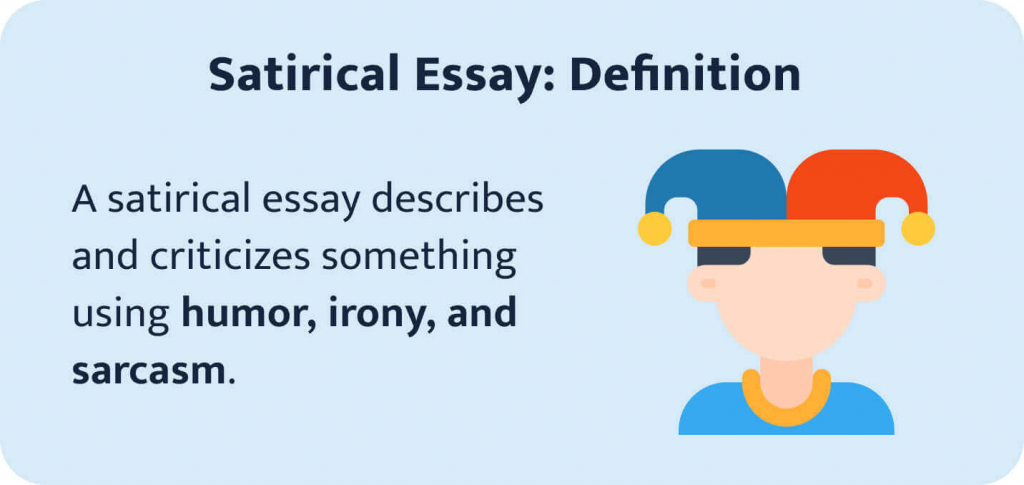
A satirical essay is a composition written about a particular subject using irony or sarcasm. Usually, the topics are related to politics, society, or money. The primary goal of any satire is to use humor creatively to make fun of foolish human behavior and criticize topical issues.
You can find examples of satire in numerous books, poems, and movies. If you enjoy dry humor based on exaggerations, you’ll surely have fun writing your satire essay.
✍️ How to Write a Satire Essay
Does the task of writing a satirical essay look daunting? No worries! Check out our expert advice:
- First off, sit down and relax. Do something inspiring. For example, get in a fight (preferably a literal one.) Satire needs to be written at the boiling point; that’s exactly where the best essay ideas come from.
- Get inspiration from classic satire examples. Scan through the works of famous satirists when looking for ideas. It can be helpful to draw parallels with the situation in the modern world.
- Another great way to get satirical essay ideas is life itself. This is where every masterpiece comes from. Ideas for a satire may pop into your head at any time. Maybe you got into a fight with a lady in the supermarket or argued about clothes with your sibling. Whatever noteworthy event happened to you recently, write it down!
- The best satire paper ideas are those that reflect reality. If your readers can draw parallels with their life, then you’ve succeeded. Completely made-up stories are harder to pull off: you can end up not convincing your readers.
- Think about your audience. Should you choose a formal or casual tone for your satirical piece? If a professor is going to read it, the first option is preferable.
- Set your goals. Good satire only makes your readers laugh but also demonstrates to them your way of thinking. Use your satirical essay to show your attitude towards serious issues.
- Add a personal touch to your satirical writing. Narrate in first-person perspective or make yourself the protagonist. Adding a unique spin and an interesting perspective will help your essay stand out. It’s also good to use hyperboles and metaphors to make your point.
If you’re struggling with picking good satire topics, check out the ideas below.
😜 Satire Essay Topics List
Topics for a satirical essay on social media & technology .
Many of us have a complicated relationship with social media. Despite their convenience, they use a lot of our time as well as storage space. A satirical discussion can sharpen a critical perspective on these topics.
- Like, repost, and get married. It’s difficult to determine someone’s real intentions on the Internet. How does this impact people’s dating behavior?
- How cute animals became the main driving force of Instagram advertising. Emotions play a significant role in marketing. Adorable cats and dogs wield much power in this regard. What do you think is their secret?
- “I will just check a few posts and stories… Whoops, there goes my day.” If that sounds familiar to you, write about it in your satire essay on social media!
- “I’m going to filter this anyway.” However unflattering your photo looks, Instagram’s got your back. Discuss how you can use this power to your advantage.
- Let’s Zoom! Online classes are not everybody’s cup of tea. Will they become the new standard model of learning? Or will they disappear to where they came from?
- Twitter, Instagram, Facebook: can you use all of them without losing your grip on reality?
- The rise of knock-off products: will the Asian competition sweep Apple and others away?
- What if your phone is hacked?
- Providing a constant flow of content as a modern virtue.
- Exchanging gossip as a currency on social media.
- English will become an endangered language thanks to emojis.
- The worst social media virus: “Have you seen this TikTok ?”
- Step-by-step instructions on how to use hashtags to Twitter.
- Tagging in Facebook posts as an invasion of personal space.
- How to ruin your life with the help of only one social media account.
- Equality on the media: why are we discriminating against positive news?
- If you don’t watch my stories back, you don’t love me.
- Is your life as perfect as the one you display on your Instagram?
- Viral challenges are getting overly complicated.
- Caution: fact-checking Tweets may cause severe fires on social media.
- What if you were paid to scroll social media feeds?
- Understanding the cloud: how did my files get all the way up in the sky?
- Warning: downloading these apps may shorten your life.
- Tweets are short for a good reason: an average person’s attention span is getting shorter.
- Dumb ways to die: or, why you should never google how to save your life.
- Imagine the Internet disappears tomorrow.
- Can you make your coffee without a coffee machine?
- What do hackers look like in real life?
- An updated set of rules on how not to embarrass yourself on the Internet .
- Modern life: did you get the newest human update?
- TikTok should be banned in schools.
- FOMO: does it make you have nightmares?
- There is nothing bad about having a date with someone from social media.
- Social media jargon that we will never understand.
- How to unsee all the disgusting stuff you have seen on social media.
- A quick test to find out whether you’re smarter than your smartphone.
- Hiding your flaws on social media for dummies.
- Spotting an authentic lifestyle on Instagram is not that easy.
- Learning how to make a relevant and adequate comment on social media.
- Things from the Internet that could’ve been funny if they weren’t so real.
- Feeling good about your body doesn’t mean you should post nudes.
- How to stay at home forever: Let your parents see your photos from last night’s party on social media.
- How to gain more followers on your Twitter.
- Should we expect an apocalypse if social media shuts down?
- Is social media the best way to make new friends?
- Do your Instagram followers really care what you had for breakfast?
- It’s impossible to avoid Internet addiction.
- Should robots have human rights?
- 10 reasons not to use Google for your exam prep.
- Should robots replace humans?
- Why should everyone have Internet access?
- Technology is not what devastated human communication .
- Why are smartphones more important than desktop PCs?
- 10 reasons for taking online classes only.
- How do modern technologies affect the way we learn?
Satire Essay on School: Topic Ideas
In a satirical essay, you can criticize the social issues that concern you using irony and funny punchlines. You can express your ideas and worries about education with a little bit of humor. It sounds like a dream essay, doesn’t it? Writing about your problems in a satirical way might help you to look at them from a more optimistic perspective!
- What is the point of a school uniform? Even office workers rarely have to follow strict dress code rules. All in all, your brain won’t solve calculus tasks better if you wear a uniform.
- Why is studying online more productive than going to school? You don’t have to go anywhere to become more intelligent. All the existing knowledge is available on the Internet, and most of it is free.
- Teachers enjoy giving a lot of homework to their students. Many students suspect that. Do you think there might be some truth behind it?
- How can you defend yourself from older kids at school? Taking up boxing or karate ? Becoming a bully? Or maybe you just need to be a good runner? Try to think about the most creative and outlandish options.
- Reasons why you should write essays in the last minute. Nothing motivates a student more than an approaching deadline. Try to remember the time you finished your assignment the night before the due date. What was it like?
- What’s wrong with the educational system in America? Find the flaws in your program or describe the problems that your peers face. For example, think about tuition fees in colleges, overcrowding, or lack of attention to students.
- How social media help students in their studies. The educational content on social media can be helpful for your studies. Wouldn’t it be more interesting if your teachers interacted with you via TikTok or YouTube?
- How do you survive your senior year at high school? Applying to college, preparing for SAT or ACT, and keeping up with deadlines seem like a lot of multitasking. Describe all the difficulties students have to face and offer your solutions.
- Do we even need to go to school? At first, think about why you like and dislike school. Why do you think school helped you, and when was it useless? Provide your reasons why you keep going to school and what you aim to achieve.
Topics for a Satire Essay on Obesity
Healthy lifestyles keep gaining popularity. There are plenty of low-fat and vegan options in supermarkets, cafes, and restaurants. However, obesity is still a big problem for people’s health and self-esteem. Satirical topics below will help you look at it from a new perspective; just make sure to be respectful.
- Are overweight people happier than the rest of us? Many fat people keep positive and simply don’t care about the way others see them. They can enjoy their favorite foods and don’t feel the need to work out after that.
- Do overweight people want to lose weight? Some of them surely do. Others are happy the way they are and still face the constant pressure of the people surrounding them. Explain why it’s not necessary to lose weight just to fit the standards.
- How to stop eating at night. Nothing seems like a better idea than grabbing a snack at 2 a.m. The following day you cannot even realize why your brain persuaded you to do it. Explain why this habit can be harmful and what possible solutions can help to get rid of it.
- Crazy solutions for losing weight. You can find thousands of diets and fat-burning workouts on the Internet, but none of them work as well as promised. Find the funniest weight loss tips and describe them in your essay.
- How to persuade children to choose healthy foods. When you force somebody to do something, it doesn’t work well. Maybe we should show kids educational cartoons on nutrition? Or perhaps we need to learn how to cook delicious and healthy foods?
- How do some skinny people eat so much and don’t gain weight? Probably everyone knows a person who eats all the time and is not even close to getting fat. It might be fast metabolism, an active lifestyle, or black magic.
- What should you eat to lose weight? Everybody knows that you need to consume fewer calories than you burn. But people still want to find a perfect diet to reduce body fat. Can you come up with one?
- Signs that you need to lose some weight. Maybe your favorite jeans became too tight, or you can’t walk up the stairs as quickly as you used to. Think of the indicators showing that you’ve gained some extra weight.
- How does smoking affect weight loss? Many people believe that smoking reduces the feeling of hunger and makes you eat less. Ex-smokers also tend to gain weight when they give up smoking. Explore this issue in a satirical essay.
Environment & Global Warming Satire Essay Topics
Environmental issues are a big part of today’s debates. Satire can make your essay more prominent and draw more attention to the issues you discuss. Satirizing the current situation can be a powerful tool in motivating people to go green. If you’re looking for good satirical topics concerning the environment, this is your section.
- Behold: anyone is now able to walk on water. You can do it, too—thanks to giant garbage islands. What other “wonders” has pollution made possible?
- Our dependency on the environment is one-sided. Speculate what would happen if nature strikes back. Who will have the upper hand?
- No one likes to wade through garbage. Yet, many people just throw their trash on the ground. What’s going on in their minds?
- New technology: guilty until proven innocent. Can humans sustain technological progress at the cost of the environment?
- We are ready to cut down the tree if we need a toothpick. Is this acceptable or outrageous? Ponder on it in your essay.
- What if you could stop climate change? Imagine that you can control everything in the world. What would you do to stop global warming? Offer your solutions to climate change having this kind of power.
- Climate change is fake news . With this essay, you can satirize the point of view of climate change deniers. Winter is as cold as it used to be. Maybe global warming is a trick politicians use to deflect our attention from real problems.
- Dirty water vs. polluted air: the irony of rich nations looking down on developing societies.
- Is sustainability in big companies merely a fashionable way to make a profit?
- How can we live comfortably without degrading the environment?
- Natural disasters vs. climate change denial: is there a correlation?
- Can humans live in a symbiotic relationship with nature, as plants do?
- Stop brushing your teeth if you have heard of global warming.
- Why we should stop hating public transport .
- Overpopulated cemeteries: an underrated issue.
- Who cares about the environment when we need more housing?
- I hate recycling , so here is what I do instead of helping the environment.
- Riding horses instead of driving cars can be fun!
- Let’s be honest: do we really need that much ozone?
- The best solution for global warming: using hover boards instead of cars.
- Trashy waste disposal ways: can we do better?
- If you’re convinced “there is plenty of fish in the sea,” think twice.
- Humans sacrifice dozens of species to save one: themselves.
- The latest research shows that people don’t care about the environment.
- Should we consider reusable toilet paper to save our planet?
- Can’t people just plant more trees to save the forests?
- How to reduce pollution without recycling.
- What’s wrong with the zero waste ideology?
- How not making your bed can stop global warming.
- Why should humanity move to Mars ?
- 10 reasons why deforestation makes our planet cleaner.
- Are gasoline cars better than electric ones?
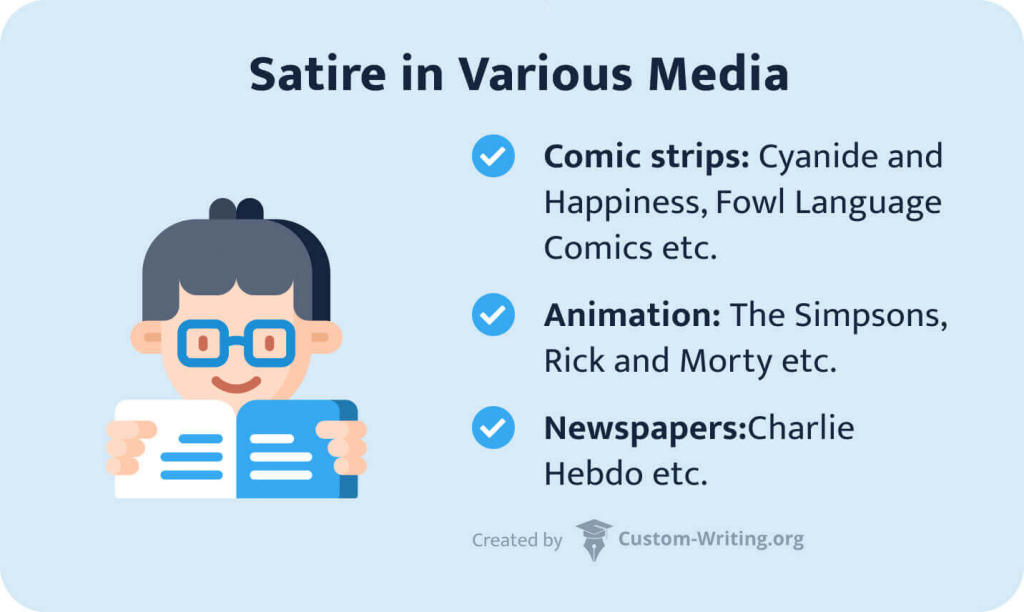
Satirical Essay on Social Issues: Topics & Questions
In this section, you’ll find satirical writing ideas about society, culture, and other related things.
- “I want to speak to the manager!” If you’re dying of shame every time someone says this sentence, welcome to the Karen phenomenon. What can you do to avoid becoming such a person?
- Multinational corporations are masters of disguise. The variety of choices on grocery store shelves is deceiving. Almost all goods there belong to one of few transnational corporations.
- You can achieve anything you set your mind to—unless you’re poor. Think of examples that support this statement, such as education not being accessible for everyone.
- Hungry Google. How can promising tech start-ups prevent being devoured by a giant? The greediness of a big corporation such as Google is a great satirical topic to write about.
- The dark side of the fashion industry. What’s your opinion on beautiful designs made by the hands of Asian children?
- Trends, bans, and censorship: is free speech only for the elite?
- How to keep up with slang as you get older.
- Will Apple’s planned obsolescence ever backfire?
- “I can paint like this”: the appeal of abstract art.
- Spartans knew how to deal with overpopulation.
- Who really deserves the title of the Greatest Generation?
- ”Let’s make it simple!”: the dullness of modern pop culture.
- Is it time to create a new currency in the US?
- What should you answer to a time-traveler from the past asking about the worst event in the 21st century?
- What if pharmaceutical companies merely want to keep us sick?
- 10 reasons why breastfeeding in public should be illegal.
- 7 reasons why women should not get pregnant.
- Why should you avoid getting vaccinated?
- Life hacks on how to get a cold in summer.
- What’s so good about plastic surgery ?
- What adverse effects can sports have on your life?
Other Satirical Essay Topics
Below you’ll find humorous topics related to politics and family life. You’re welcome to use them for your satirical writing assignment.
Satire Topics on Politics
It’s hard to face reality without a bit of humor. With everything that’s happening in the world, politics is perfect joke material. This is especially relevant for Juvenalian satire. To help you limit your choices, here are some prompts:
- Do men in power actually plan to destroy the world one day? Or is hoarding atomic weapons the politicians’ version of collecting stamps?
- “The internet is new territory for all of us.” At least it was, according to the German chancellor Angela Merkel in 2013. Sounds accurate? Unpack this quote in your essay.
- Democracies have one big problem: everyone is allowed to vote. Should democratic governments introduce some kind of an IQ test before authorizing people to participate in voting?
- Is Donald Trump a lizard person? How would this comical theory fit with his politics? Discuss this satire topic in your essay.
- North Korea’s role in the global playing field. Is the country a serious threat or a minor disturbance?
- How much influence do celebrities have in international politics?
- Politicians in Hungary and Poland use excessive anti-LGBTQ+ rhetoric. What are they afraid of?
- Are rich people and Twitter enthusiasts such as Elon Musk secretly governing the world?
- Manufacturing conspiracy theories for fun and profit.
- Would life in Russia be any different if Putin crowned himself tsar?
- Why would shopping malls make perfect prisons?
- Analyze the dictionary meaning of the word “trump.”
- Romantic relationship between Hillary Clinton and the media.
- Do all presidents just follow their basic primitive instincts?
- If someone believes politicians , they might as well believe in aliens.
- 13 reasons why teenagers should create laws.
- The most effective method to treat your post-election stress.
- Every year’s slogan: Let’s make politics work again!
- A team of professionals working on upgrading Donald Trump’s lies.
- A practical dictionary to help you translate the Trump language.
- How would the deep state save us from the climate catastrophe?
- Winning as the ultimate goal of all elections for political figures.
- Why do presidents always appear to be right?
- Following the success of Germany, we have to unite the US, too!
- If you have these symptoms, you should see a doctor to treat your Political Correctness Syndrome immediately!
- Donald Trump’s best solution for wildfires, or “Rake, people, rake!”
- Family planning gone wrong: Alabama’s law on abortion.
- What do Canadians say about America’s struggles with immigrants?
- Making parallels between Humpty Dumpty and the issues with the US wall.
- Why everyone should own a gun.
- Why doesn’t freedom of speech make you free?
- Beware: the new virus of civil disobedience is coming.
- Why do we keep thanking the wrong heroes?
- A white American man: the most terrorized person in the world nowadays.
- Shouldn’t we treat China as America’s best friend?
- Communism is capitalism’s evil twin.
- Why didn’t the government invoke the 25 th amendment during Trump’s presidency?
- How to build hype: tips from the man who told everyone to drink bleach.
- Donald Trump as the next candidate for winning a Nobel Prize in medicine.
- Sending hippie-like peace text messages to the terrorists.
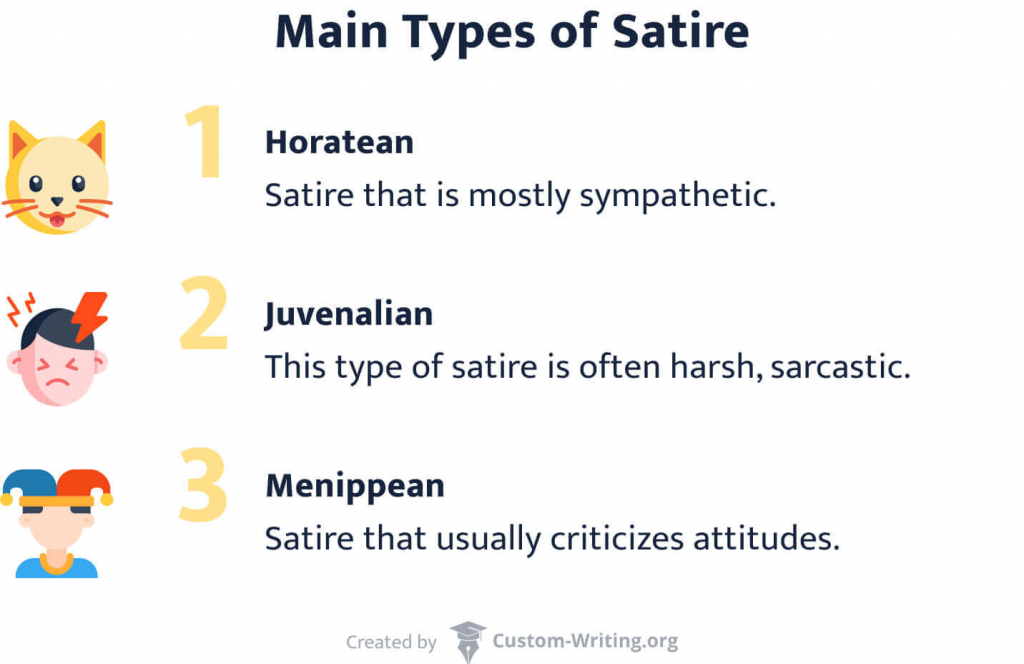
- Why won’t anyone believe what politicians say?
- What makes Donald Trump so unique?
- Trust me, the Great Wall of China will still stand after the alien invasion.
- Let’s see if Captain America would make a good president.
- Can we use ideas from comic books to confront terrorists?
- 10 reasons why you should watch CNN news twice a day before a meal.
- The gun control issue couldn’t be more overrated.
- People are dying: legalize marijuana to save lives!
- A collection of Donald Trump’s best advice.
- 10 reasons why Tony Stark should become the next president of the United States.
- Is Russia America’s top enemy?
- Should the Communist party be the world’s leading social organization ?
- 15 reasons why all countries should liberalize visa regimes.
- How much should countries spend on military expenses?
- Why is political satire important?
Satirical Essay Topics: Marriage and Family
Family life can be a blessing as well as a challenge. Humor is a big help. Looking through this section, you’ll definitely find a relatable satire essay topic. Be sure to have a witty solution for the next time!
- You’re a cat person; your partner loves dogs. And your child begs you to buy a snake. What’s the best way to choose a pet for the whole family? Explore this funny satire topic in your essay!
- “I have a great business idea . ” Have you come to fear hearing these words? Write about how to discourage your loved ones from investing in bad ideas.
- Just married! And the routine already sets in. How can a couple keep the spark?
- Marrying is easy; it is difficult to be married . If this hits close to home, consider it as the topic for your essay.
- Grandma Online. Many people underestimate their grandparents’ abilities to use the Internet. How can said grandparents use this to their advantage?
- What’s the best way to deal with ex-partners after marrying someone else?
- Marrying a Catholic priest: how to handle celibacy.
- “Blood is thicker than water”: when is this statement not valid?
- Love at first sight: truth or myth?
- Cool parents for all Millennials: a practical guidebook.
- Why do people who have failed relationships keep advising others?
- What are your grandpa’s best retirement ideas for young people?
- Paying back: what can you ask your grandparents at the end of the day?
- Family discussions are like puzzles that one has to piece together.
- Why does nobody tell you how overrated a married life is?
- The turning point of my life: before and after marriage.
- What if same-sex marriage becomes legal everywhere?
- Why some men don’t wear engagement rings.
- Why would anyone save for their kids’ college or wedding?
- The secret behind high divorce rates in the US.
- Don’t rush to say “I do,” check these things first.
- Living in communities as a substitute for marriage in the future.
- The reasons why my kids won’t get married in a church .
- If love is blind, why are we still so self-conscious?
- The most misused pickup line of the decade.
- Guidebook of the year: places where you can find love.
- When being yourself on a date doesn’t help, just be weird.
- The real struggle behind “ happily ever after .”
- The most obvious signs you have a nosy partner.
- How can paternity leave save the whole world?
- Top useful tricks on how to win a fight with your partner.
- Things you should do on the first date if you need to escape.
- At what age should teens enter romantic relationships?
- Social media comes to rescue you: why is it the best way to break up?
- Breaking up for introverts: how to do it without words.
- Not awkward, not cute: conversation starters for the first date.
- How to find out what your partner actually thinks about that dress.
- Get ready: questions your partner will definitely ask you at some point.
- How many times do I have to say “I love you” before my partner believes me?
- Family getaway planning on a budget (spoiler: stay home!)
- More money spent on weddings equals a higher chance of divorce.
- Being a housewife and a mom is so much easier than working! Right?
- Make your husband clean after himself: a step-by-step guide.
- Learning to love your parents who tag you in every post on Facebook.
- Who needs a babysitter when you have a tablet and a TV?
- Dressing your toddler: are there only pink and blue clothes?
- Enjoy your time as a kid of a divorced couple; you live in two places!
- The top 10 passive-aggressive comments to make to your “favorite” relative.
- How do you detect a typical mansplaining answer from a woman?
- The middle child : why do people often seem to forget about them?
- The reasons why your mother-in-law is not the greatest evil .
- Create a 100% stress-free family life by divorcing.
- How to make a bathroom your private space in 5 steps.
- Fixing racism issues by promoting interracial marriages.
- Your evolution into everything you hate about your parents.
- Are divorces more expensive than weddings?
- Why all fathers should be taking paternity leave.
- What to do on a date to never be asked out by that person again.
- How to lie to your spouse and get away with it.
- The most effective tricks never to have dishwashing duty.
- How to tell your partner that they’ve gained weight.
- How to please your mom without actually following her advice.
- 10 life hacks to break up with your partner without doing anything.
- Getting a haircut is the best method to deal with a breakup.
- 15 reasons why you should always be late for dates.
If you haven’t found a suitable topic, you can use our topic generator for inspiration.
💡 Prompts for a Satirical Essay: Examples
Need some additional inspiration? The following prompts will instantly provide you with writing ideas.
Satirical Essay on Drugs: Writing Prompt
Illegal drug use is a grave problem in our society. You can draw attention to this issue by writing a satirical proposal. Here are some options:
- Try to imagine what would happen if illegal drugs were free. What adverse “benefits” would this solution have? To drive the point home, use facts and statistics to show how easily addictions form.
- You may use the same approach to write about smoking or alcohol abuse. It’s a great idea to draw inspiration from old advertisements and taglines glamorizing the “benefits” of these addictions.
Feminist Satire Essay: Writing Prompt
Describing female oppression ironically as something positive allows you to demonstrate the absurdity of sexism. Think about the following:
- Many antifeminists see equal rights as a threat to patriarchy. For your essay, think about the examples of traditional misogynistic values, such as reducing women’s roles to housework. Then, present them in an ironic way to show how absurd they are.
- Another point worth satirizing is the idea that women are tired of equal rights. Do they want to go back to doing simple tasks in the kitchen and being banned from having a fulfilling job?
- Finally, you may want to explore if feminism hurts men. Is it true, or do some men just miss being in the spotlight?
Satirical Essay on Drinking and Driving: Writing Prompt
Drunk driving is among the primary reasons for road accidents in the US. It’s also an interesting topic to explore in a satirical essay. You can research ways of reducing impaired driving and turn them upside down:
- What if we start encouraging drunk driving by making alcohol more accessible? Think what would happen if the government lowers alcohol prices or makes it legal to drink everywhere.
- You may also want to ponder the consequences of lowering the legal drinking age. What would happen if kids start thinking that drunk driving is acceptable or even cool?
- You can go even further and ironically suggest making sober driving illegal.
Satirical Essay on Texting: Writing Prompt
Texting is fun—but it also comes with plenty of downsides. Below are some points you can satirize in your essay:
- One of the major drawbacks of texting is the lack of nuance compared to real-life communication. But what if it was actually an advantage? Try to describe the “benefits” of not being able to convey irony via texting.
- You may take a more serious stance and write a satirical essay on texting and driving. Why should texting be more important than watching the road? Show why this activity is pointless and highly dangerous.
Now let’s have a look at an essay example before you start writing. You can use this sample as inspiration or help you set a tone for a satire essay. Feel free to download the PDF file below:
Sometimes I dread graduating from high school just because I won’t have to wear a uniform anymore. It’s so wonderful to me because everything else I wear is either “too short” or “too bright.” In my opinion, school uniform relieves pressure and reduces unnecessary creativity and freedom of choice.
Satire Essay Examples from World Literature
If you are used to serious writing, it’s time to give it a break. Satire essays are all about fun. Some people even consider it to be one of the most entertaining types of essays.
Not only does satire show us reality as it is: it also entertains us. Let’s look at some satire writing examples from literary masters.
- The Cop and the Anthem by O. Henry The irony is already noticeable from the very beginning of O. Henry’s short story. Whatever main character Soapy intends to do, it results in the opposite. O. Henry perfectly plays around with Soapy’s sophisticated language use: it shows that despite being homeless, the character tries to appear as if he is of high status.
- Advice to Youth by M. Twain This satirical essay by Mark Twain aims to give a piece of advice to younger readers. They would expect it to be thoughtful as it comes from a respectable author. Instead of passing down his ideas about morality and values, Twain teaches youth how to act nicely. Long story short, it’s a convenient guide on how to pretend to be well-behaved. Twain’s use of sarcastic humor flips the theme of morality upside down.
- At the Funeral by M. Twain After reading this masterpiece, most adults and parents probably wouldn’t find Mark Twain so respectable anymore. In this essay, he mocks a set of social norms related to funerals. You can see how the writer plays around with this seemingly depressing topic. However, this satirical piece comes out to be quite entertaining. The reader can’t even sense the depressing mood surrounding the funeral processions. Twain also avoids using any terms related to it. He underlines that there is no value in such a custom anymore. All in all, he conveys his ideas very naturally and humorously.
- When I Was a Witch by Charlotte Perkins Gilman This short story created by Charlotte Perkins Gilman is considered one of the best satirical writing examples. It’s a story about a woman who discovers that all her wishes come true. She starts wishing for her surroundings and society at large to change. Though her wishes might seem strange, they are related to Gilman’s real-life circumstances. Ironically, only her wishes that are caused by negative emotions come true.
- A Modest Proposal by J. Swift This satirical essay by an English writer Jonathan Swift is about Ireland’s social and political problems. At the time, there was a famine in the country. Unfortunately, the government didn’t seem to find a solution to that issue. Swift decided to make a suggestion. He proposes to breed humans like cattle, resolving overpopulation and hunger at the same time. Such a horrible suggestion is nothing but an impossible idea with a hint of sarcasm. The main point of this essay is to make fun of the Irish government’s incapability to deal with social issues.
These texts will surely inspire you to write an outstanding essay.
We wish you good luck and hope this article was helpful! Don’t hesitate to share it with your friends.
Further reading:
- 435 Literary Analysis Essay Topics and Prompts [Upd]
- 460 Excellent Political Topics to Write about in 2024
- 420 Funny Speech Topics (Informative & Persuasive) + Presentation Ideas
- Funny Persuasive Speech Topics: Best Ideas for 2024
- 150 Best Environmental Essay Topics & Questions
✏️ Satirical Essay FAQ
In the modern world, there are way too many serious issues. Sensational media portrayal doesn’t make dealing with them easier. Satire helps to digest some ideas more effectively. Essays and articles often use satirical writing.
If you already have a topic, analyze the issue. You should come up with a good list of ideas first. Then, choose the most relevant points. Describe these in a satirical style. Add an introduction and a conclusion.
Students often have tasks with exact topics for their satire essays. If you need to develop an idea yourself, think about a topical issue you’ve heard about recently. Your subject might be related to your community or society as a whole.
First, read some examples of how other authors start their essays. This might vary from a quote or an anecdote to a rhetorical question. Sometimes the best way is to create an outline for the essay before writing an introduction.
- Essay Structure: Elizabeth Abrams, for the Writing Center at Harvard University
- What Is Satire? How to Use Satire in Literature, Pop Culture, and Politics: MasterClass
- Choosing a Topic: Purdue Writing Lab
- Satire Essays: Bartleby
- Origin of the Roman Satire Genre: NS. Gill, ThoughtCo
- Juvenalian Satire: Encyclopedia Britannica
- The Power of Political Satire: The New Yorker
- Political Satire: Huff Post
- Political Issues of 2024: I Side With
- Political Issues Students Care About in 2020: Best Colleges
- These Satirical Nat Geo Headlines Aren’t Too Far Off: National Geographic
- Laughing in the Face of Climate Change? Satire as a Device for Engaging Audiences in Public Debate: University of Colorado Boulder
- Technology Addiction: How Should It Be Treated?: Medical News Today
- Concerns Regarding Concerns Regarding Social Media and Health Issues in Adolescents and Young Adults: ACOG.org
- Social/Family Issues: Medline Plus
- Trump’s Biggest Accomplishments and Failures from His 1-Term Presidency: Business Insider
- Share to Facebook
- Share to LinkedIn
- Share to email
![how to write a satire essay 267 Music Essay Topics + Writing Guide [2024 Update]](https://custom-writing.org/blog/wp-content/uploads/2021/01/lady-is-playing-piano-284x153.jpg)
Your mood leaves a lot to be desired. Everything around you is getting on your nerves. But still, there’s one thing that may save you: music. Just think of all the times you turned on your favorite song, and it lifted your spirits! So, why not write about it in a music essay? In this article, you’ll find all the information necessary for this type of assignment: And...

Not everyone knows it, but globalization is not a brand-new process that started with the advent of the Internet. In fact, it’s been around throughout all of human history. This makes the choice of topics related to globalization practically endless. If you need help choosing a writing idea, this Custom-Writing.org...

In today’s world, fashion has become one of the most significant aspects of our lives. It influences everything from clothing and furniture to language and etiquette. It propels the economy, shapes people’s personal tastes, defines individuals and communities, and satisfies all possible desires and needs. In this article, Custom-Writing.org experts...

Early motherhood is a very complicated social problem. Even though the number of teenage mothers globally has decreased since 1991, about 12 million teen girls in developing countries give birth every year. If you need to write a paper on the issue of adolescent pregnancy and can’t find a good...

Human rights are moral norms and behavior standards towards all people that are protected by national and international law. They represent fundamental principles on which our society is founded. Human rights are a crucial safeguard for every person in the world. That’s why teachers often assign students to research and...

Global warming has been a major issue for almost half a century. Today, it remains a topical problem on which the future of humanity depends. Despite a halt between 1998 and 2013, world temperatures continue to rise, and the situation is expected to get worse in the future. When it...

Have you ever witnessed someone face unwanted aggressive behavior from classmates? According to the National Center for Educational Statistics, 1 in 5 students says they have experienced bullying at least once in their lifetime. These shocking statistics prove that bullying is a burning topic that deserves detailed research. In this...

Recycling involves collecting, processing, and reusing materials to manufacture new products. With its help, we can preserve natural resources, reduce greenhouse gas emissions, and save energy. And did you know that recycling also creates jobs and supports the economy? If you want to delve into this exciting topic in your...

Expository writing, as the name suggests, involves presenting factual information. It aims to educate readers rather than entertain or persuade them. Examples of expository writing include scholarly articles, textbook pages, news reports, and instructional guides. Therefore, it may seem challenging to students who are used to writing persuasive and argumentative...

Expository or informative essays are academic papers presenting objective explanations of a specific subject with facts and evidence. These essays prioritize balanced views over personal opinions, aiming to inform readers without imposing the writer’s perspective. Informative essays are widely assigned to students across various academic levels and can cover various...
![how to write a satire essay 283 Hottest Cybersecurity Research Topics & Questions [2024]](https://custom-writing.org/blog/wp-content/uploads/2021/04/hacker-cracking-binary-code-data-security-284x153.jpg)
Your computer stores your memories, contacts, and study-related materials. It’s probably one of your most valuable items. But how often do you think about its safety? Cyber security is something that can help you with this. Simply put, it prevents digital attacks so that no one can access your data....

A problem solution essay is a type of persuasive essay. It’s a piece of writing that presents a particular problem and provides different options for solving it. It is commonly used for subject exams or IELTS writing tasks. In this article, we’ll take a look at how to write this...
Hello, thanks for useful and effective ideas for satirical essay writing! They are like a miles stone to me! Wish you good luck!!!
Prominent ideas for satirical essays. These are what I need for my writing process) Actually, for its starting. Thanks a lot!
Actually, it’s a very fantastic article. I liked these topics and will try them. Many thanks for sharing!

IMAGES
VIDEO
COMMENTS
Learn the art of writing a satirical essay that blends humor and criticism to expose the flaws and absurdities of society. Explore the definition, purpose, and forms of satire, and how to use irony, sarcasm, and exaggeration to create effective prose.
Learn how to write a satire essay with this guide that covers the definition, writing tips, format and topics. Find out how to use humor, facts and ethos, logos and pathos to create a compelling and original satire essay.
Satire writing has become more popular in recent years. This is partially due to the internet: greater access to information has given writers more follies to satirize. ... The essay's satire is effective precisely because of its shock value. Swift first describes the plight of Ireland, particularly the suffering of its many beggars and ...
His essay "A Modest Proposal" is a masterclass in this balance. Swift uses dark humor, proposing that the poor sell their children as food to the rich, to deliver a scathing critique of the British exploitation of Ireland. ... Writing satire is a delicate art that balances humor with critique, subtlety with clarity, and relevance with ...
Learn how to write a satire essay with this helpful guide that explains the basics, types, and tips of this genre. Find plenty of topic ideas and examples to inspire your work.
Learn how to write a satire essay with irony, humor, and sarcasm. Find out the structure, outline, techniques, and examples of this genre that critiques and illuminates society.
Here are 25 distinctive satirical essay ideas to inspire your satire: The Absurdity of Celebrity Culture: Explore the obsession with fame and the cult of celebrity. The Folly of Fashion Trends: Poke fun at the ever-changing world of fashion and beauty standards. The Myth of Perfect Parenting: Satirize the pressure to be a perfect parent in the ...
Learn how to write a satire essay, a genre that blends humor and critique. Find out the definition, elements, types, topics and examples of satire essays.
Satire is a story method that exposes flaws in a person or system in power. Rather than realistically depicting flaws, satire emphasizes them, often exaggerating them until they become ridiculous or comical. You will find satire in all kinds of mediums, from TV (Saturday Night Live), to movies (Don't Look Up, Sorry to Bother You, Borat), to ...
The main difference between satire and parody is the message they're trying to convey to their audience. A parody emulates another work or body of work using exaggeration and humor. The purpose of a parody is to entertain. For example, Scary Movie is a parody of the horror movie genre, and Pride and Prejudice and Zombies is a parody of Jane ...
Learn what satire is, how to use literary devices like irony and sarcasm, and how to find the right balance between humor and criticism. See examples of satire in literature, comedy, and media.
How to Write a Satire Essay: Common Mistakes Students Make When Writing. Misusing satire is one of the biggest mistakes students make when writing a satire essay. Although the essay is meant to be humorous, the wrong use of satire will offend your target audience. You will not get the highest score with such an essay.
Here are two techniques and tips to write great satire. 1. Use a Serious Tone. In "A Modest Proposal" Swift uses an intense, serious tone throughout the entire piece. One of the most important things about using tone is that we make sure we choose the correct tone to convey the message we so desire. In satire, most commonly, the most ...
Don't do that. When you write satire, a single, clear premise is essential. 2. Take a Strong Point of View. A common formula in satire and humor writing is this: pick a point-of-view for your narrator that is the opposite of what you (the author) really believe, then exaggerate this point of view.
Satire is so prevalent in pop culture that most of us are already very familiar with it, even if we don't always realize it. Satire can be part of any work of culture, art or entertainment. It is an often-humorous way of poking fun at the powers that be. Sometimes, it is created with the goal to drive social change. Satire has a long history and it is as relevant today as it was in ancient Rome.
Before submitting your satire essay, take the time to edit and polish your work. Proofread for grammar, spelling, and punctuation errors. Ensure that the humor and satire are effectively conveyed. Consider seeking feedback from trusted peers or mentors to get valuable insights and suggestions for improvement. 4.
Learn how to write satire effectively by using humor, irony, exaggeration, and parody. Find out what satire is, how to identify your stance on the issue, and how to avoid common pitfalls.
Learn the definition, examples, and quiz of satire, a genre that uses humor to criticize or expose something. Find out when and how to use satire in school or creative writing projects.
Learn how to write a satire essay with this guide that explains what a satire essay is, how to choose a topic, how to brainstorm, how to write a thesis statement, and how to use irony and humor. See examples of satire essays on politics, culture, and society.
Discover what a satire essay is and what difficulties you will face when getting started. Find out how much time people usually spend writing satirical essays. Learn the tips on how to write the great satire work quickly and effectively. Have a look at a good satire essay example for completing an A-grade satire essay.
1. Familiarize first how to write a satire essay. When writing a satire essay, it is important to know that you have a strong motive to address your own views and opinion over a specific issue to you care about. Even if it is opinionated in its form, you can put your own perspective of this certain issue and spin it to make it funny, don't ...
Writing a satire essay is both challenging and rewarding. It requires creativity, critical thinking, and a keen sense of humor. By exploring a wide range of satire topics, from politics and social issues to education and environmental concerns, students can find inspiration for their essays. Don't hesitate to experiment with different satire ...
A satirical essay is a composition written about a particular subject using irony or sarcasm. Usually, the topics are related to politics, society, or money. The primary goal of any satire is to use humor creatively to make fun of foolish human behavior and criticize topical issues. You can find examples of satire in numerous books, poems, and ...